
- Majors & Careers
- Online Grad School
- Preparing For Grad School
- Student Life

Top 9 Best Online PhD Economics Programs [2024]

Economists have excellent job prospects in today’s labor market. With a doctorate in economics from a reputed university and strong academic record, you’ll find many well-paid job opportunities in academia or policy. Almost every field needs economists — organizations rely on economists’ statistical, analytical, and problem-solving skills to find solutions to important issues.
Most students need a master’s of economics degree to move forward with the PhD. But some schools accept transferable credits from related programs, too!
However, not everyone can afford to earn a doctorate on campus. So, an online PhD economics degree is a great alternative.
Below are some of the best online economics PhD programs and helpful information on jobs, salaries, costs, preparation tips, and more.
Table of Contents
Best Online PhD Programs in Economics
Ready to pursue your doctorate in economics online? Let’s dive into our list of top PhD economics online programs.
Liberty University
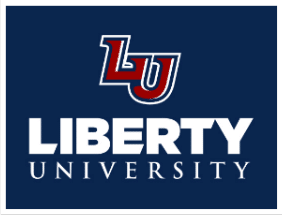
PhD in Public Policy – Economic Policy
Liberty University offers opportunities to pursue higher education across diverse disciplines with a foundation of Christian ethics. This 100% online PhD in economics program allows you to learn from established leaders in economic policy-making.
- Courses : Economic policy studies, economics & public policy, policy analysis & research design
- Credits : 60
- Duration : 3 years
- Tuition : $595 per hour
- Financial assistance : Grants, scholarships, and loans.
- Acceptance rate : 50.1%
- Location : Lynchburg, Virginia
Atlantic International University, School of Business and Economics
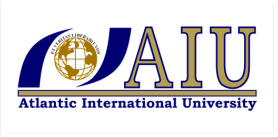
Doctor of Economics
AIU is a primarily online university that emphasizes freedom of inquiry and free thought exchange between students and faculty. This PhD in economics online degree aims to help students who want to pursue research or teaching in economics or business.
- Courses : Economics of growth & development, microeconomic research, mathematics for economists
- Tuition : Refer tuition page
- Financial assistance : Scholarships
- Acceptance rate : N/A
- Location : Honolulu, Hawaii
Bircham International University
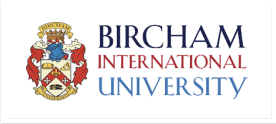
Doctor – Economic Science
Bircham International University is a global educational institution with a decentralized structure offering higher education programs in many languages. The university’s PhD economics distance learning program helps students develop a deep understanding of how people see value in the production, consumption, and distribution of goods and services.
- Courses : Micro- and macroeconomics, capital markets, economic analysis.
- Credits : 45-72
- Duration : 24 months
- Tuition : $7,650 to $12,240
- Location : Miami, Florida
Ottawa University
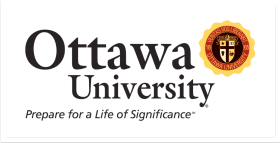
Doctor of Business Administration
Ottawa University is affiliated with the Ottawa tribe of Oklahoma and the American Baptist Church. It offers a range of online programs to mold students into valuable leaders. This distance PhD economics program is mostly online but requires six two-day residencies. Finally, the program offers courses in strategy, capital management, and finance with a focus on economics.
- Courses : Finance value generation strategy, strategic human capital management, informed decision-making
- Credits : 56
- Cost : $4,887 per semester
- Acceptance rate : 70.3%
- Location : Ottawa, Kansas
California Baptist University
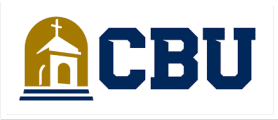
California Baptist University is a non-profit, private university that ranks #34 of the best western regional colleges. Although not an entirely online doctorate in economics, this DBA program offers courses in economics, especially on applying theories of economics to business.
- Courses : Applying economic theory to business, international business in global markets, and quantitative research
- Duration : 36 months
- Tuition : $795 per unit
- Financial assistance : Grants, loans
- Acceptance rate : 80.2%
- Location : Riverside, California
Hampton University Online
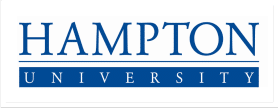
Doctor of Philosophy in Business Administration
Hampton University Online provides opportunities for adults to continue their studies through mostly online means and with a scientific approach. This PhD is a hybrid business administration program that involves two compulsory four-week summer residencies and covers managerial economics as part of the program.
- Courses : Managerial economics, organization theory & practice, organizational behavior
- Credits : 61
- Duration : 3.5 years
- Tuition : $695 per credit
- Financial assistance : Scholarships, grants, work-study, loans, and military benefits.
- Acceptance rate : 36%
- Location : Hampton, Virginia
Marymount University, College of Business, Innovation, Leadership, and Technology (BILT)
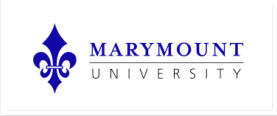
Online DBA in Business Intelligence
Marymount University was ranked #31 by US News & World of all southern regional colleges. This online Doctor of Business Administration is equivalent to an economics PhD online program as you can study economics for business decision-making and courses in strategy with a data-driven approach.
- Courses : Economics for business decision making, using data for business intelligence, and strategy in a changing climate.
- Credits : 36
- Tuition : $1,140 per credit hour
- Financial assistance : Grants, scholarships, loans, student employment, and assistantships.
- Acceptance rate : 85.3%
- Location : Arlington, Virginia
William Howard Taft University
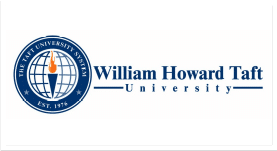
William Howard Taft University is a leader in distance education and aims to provide affordable and quality education in business, law, education, and other disciplines. This DBA program includes several courses in economics and its application in the business sector.
- Courses : Designing economic business strategies, global economy, and global business practices & challenges.
- Duration : 37 months
- Tuition : $360 per credit
- Financial assistance : Scholarships, grants, military benefits, loans, and employer reimbursement.
- Location : Lakewood, Colorado
Baker College
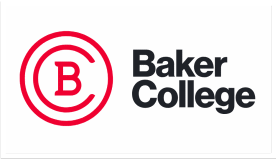
Baker College was named one of Newsweek’s top American online schools and offers fully online and hybrid programs in fields such as business, health science, and education. This DBA program has microeconomics and macroeconomics courses and explores how business leaders implement successful global strategies with limited resources.
- Courses : Global financial economy, leading 21st-century organizations, managing in a worldwide context
- Tuition : $915 per credit hour
- Financial assistance : Scholarships, grants, and loans.
- Acceptance rate : 73%
- Location : Owosso, Michigan
What Do I Need to Get a PhD in Economics?
You will likely need an undergraduate or postgraduate degree in economics or a related field to apply for a PhD in economics program. Certain programs may have other prerequisites, so check with the admissions office well in advance of the application deadline.
Once accepted, you’ll have to study various courses in economics, finance, business, management, mathematics, statistics, and strategy to earn your PhD in economics online degree.
Finally, you’ll have to pass examinations and other assessments, including a final qualifying exam. Most programs also have a research component, which means submitting a thesis or dissertation.
Preparing for an Economics Doctorate Program
Our advice? Prepare early for your PhD in economics program.
At the undergraduate level, consider taking more courses in subjects like mathematics, statistics, and calculus. It also helps to work with faculty, conduct undergraduate research, and complete professional internships whenever possible. All this lays the groundwork to prepare you well for a PhD in economics program.
Things to Consider When Choosing an Online PhD Economics Program
The right program for you depends on a range of personal factors. Consider the following when assessing programs to narrow it down:
- Make sure the specializations and subjects offered by the program match your passions and will help you achieve your career goals.
- Review available research options and make sure these also match your goals
- The faculty should have a strong reputation, especially in your field of choice
- Ensure the costs fit your budget or that there are sufficient funding options available
- Look at where past alumni are now working, and see how this fits with your ideal future
Why Get a Doctorate in Economics?
A doctorate in economics opens doors to some of the best jobs in academia and policy. According to the Bureau of Labor Statistics, an economist’s median salary is $105,630. Even better, jobs in the field are expected to grow by 13% from 2020-2030, higher than the average of all occupations.
Jobs and Salaries for Doctors of Economics
A PhD in economics online credential can equip you for roles in business, government, research, and education. Here are some top jobs for graduates, with average salaries for each:
- Economist ( $79,352 )
- Statistician ( $78,596 )
- Financial Manager ( $96,045 )
- Urban Planner ( $59,309 )
- Financial Analyst ( $63,195 )
What Is the Average Cost of a PhD in Economics?
According to the National Center for Education Statistics (NCES), the average tuition for a PhD in economics program is $19,749 per year. You can expect to pay around $12,500 for public university programs and $26,621 for private. Keep in mind these figures only cover tuition – you’ll also need to pay for books, technology fees, and other educational expenses.
How Long Does it Take to Get a PhD in Economics?
Typically, a PhD in economics takes 4-6 years to complete. However, you may be able to complete a doctorate in three or even two years at some universities, especially with an online PhD.
What Skills Do You Gain From a PhD in Economics?
First and foremost, you’ll gain strong mathematical, statistical, and analytical skills as part of your doctorate in economics. You’ll also learn to apply economic concepts and modeling to address issues in business, government, finance spaces. Finally, economics PHD grads gain expertise in writing, presentation, communication, and problem-solving.
Facts and Statistics about Economics PhD Holders
According to Brookings, universities awarded 1,216 PhDs in economics in 2020 — 66% to men and 34% to women. Foreign students with temporary visas earned around 60% of the doctorates.
Among the permanent residents who got doctorates in economics, 4.9% were black and 71.8% white, with the remaining graduates of Asian, Hispanic, and other descent.
Final Thoughts
Compared to online PhDs from other disciplines, you won’t find as many online PhD economics programs. However, you can find related programs, like online Doctor of Business Administration ( DBA ) or accounting with an emphasis on economics-related subjects like microeconomics and macroeconomics. This is a good substitute if your preferred university doesn’t offer a PhD economics online degree.
Considering other business-related PhD programs? Keep a clear path toward a lucrative career with our list of the highest paying PhDs .
Frequently Asked Questions
Can you get a phd in economics online.
Yes – some universities offer online PhD economics programs that you can complete online. Many of these online programs can be completed in as little as three years.
Is an Economics PhD Worth It?
A PhD in economics is one of today’s most sought-after qualifications. Economists are in high demand and have an annual median salary of $105,630 , with prospects even greater for graduates with a PhD.
How Many Years is a PhD in Economics?
A PhD in economics takes 3-6 years to complete.

Lisa Marlin
Lisa is a full-time writer specializing in career advice, further education, and personal development. She works from all over the world, and when not writing you'll find her hiking, practicing yoga, or enjoying a glass of Malbec.
- Lisa Marlin https://blog.thegradcafe.com/author/lisa-marlin/ 12 Best Laptops for Computer Science Students
- Lisa Marlin https://blog.thegradcafe.com/author/lisa-marlin/ ACBSP Vs AACSB: Which Business Program Accreditations is Better?
- Lisa Marlin https://blog.thegradcafe.com/author/lisa-marlin/ BA vs BS: What You Need to Know [2024 Guide]
- Lisa Marlin https://blog.thegradcafe.com/author/lisa-marlin/ The 19 Best MBA Scholarships to Apply for [2024-2025]
What Is the Best iPad for Students in 2024?
Top 6 best academic planners for 2024/2024, related posts.

- Grad Trends: Interest in Artificial Intelligence Surges

- Applying to Big Tech This Year? Here’s How to Ace It.

73% of job seekers believe a degree is needed for a well-paying role–but is it?

Tech Talent Crunch: Cities with More Jobs Than Workers

The Most Under-Rated Career Advancement Tip for 2024

Top 5 Best Psychology PhD Programs in 2024

Leave a Reply Cancel reply
Your email address will not be published. Required fields are marked *
Save my name, email, and website in this browser for the next time I comment.
Recent Posts
- Breaking Records: Yale Sees Most Selective Grad Admissions Season Yet
- 12 Best Laptops for Computer Science Students
- Is a Master’s Degree Worth It? [2024 Guide]

© 2023 TheGradCafe.com All rights reserved
- Partner With Us
- Results Search
- Submit Your Results
- Write For Us
Majors & Careers
Online programs, certificates, hire our students, which program is right for me, certificates & capstones, for companies.
- Executive Education
Faculty & Research
- Knowledge Centers
Discover renowned faculty who guide innovation.
News & publications, get involved, recruit & hire.
- Alumni Spotlights
Initiatives & Values
Trusted to lead, popular searches.
- Undergraduate Business Majors
- Life in Madison
- Entrepreneurship programs
- Compare MBA programs
- Faculty Expertise
- MS in Business Analytics
- Specialized Master’s Programs
- Search for: Search
- Undergraduate (BBA) Overview
- Majors Overview
- Accounting Major
- Actuarial Science Major
- Finance, Investment, and Banking Major
- Information Systems Major
- Management and Human Resources Major
- Marketing Major
- Operations and Technology Management Major
- Real Estate Major
- Risk Management and Insurance Major
- Supply Chain Management Major
- Admissions Overview
- High-School Student Admissions
- Current UW-Madison Student Admissions
- Transfer Student Admissions
- Tuition & Aid
- Class Profile
- Admissions FAQs
- Leadership Opportunities
- Business Badger Badges
- Student Organizations
- Diversity, Equity & Inclusion
- Academic Advising
- Success Coaching
- Scholarships
- Learning Communities
- Mental Health & Wellness
- Study Abroad Programs
- Applying to Study Abroad
- Study Abroad Advising
- Resources for UW–Madison Students Studying Abroad
- Study Abroad FAQs
- Student Experiences
- Study Abroad Events
- Incoming Students
- Events & Visits
- Student Ambassadors
- Precollege Programs
- Business Emerging Leaders (BEL) Scholarship Program
- Human Resources
- Certificates Overview
- Certificate in Business
- Summer Certificate in Business Fundamentals
- Entrepreneurship Certificate
- Certificate in Accounting
- International Business Certificate
- Consulting Certificate
- Recruit & Hire
- Compare Graduate Programs
- Compare MBA Programs
- Full-Time MBA Overview
- Specializations Overview
- Applied Security Analysis
- Corporate Finance & Investment Banking
- Strategic Human Resource Management
- Real Estate
- Risk Management & Insurance
- Supply Chain Management
- Technology Strategy & Product Management
- Requirements & Deadlines
- Culture & Diversity
- Webinars & Podcasts
- Professional MBA Overview
- Deadlines & Requirements
- Tuition & Aid
- Culture & Community
- Executive MBA Overview
- Admissions Events
- Compare Master’s Programs
- Program Overview
- Events & Visits
- Applied Consulting Practicum
- MS in Financial Economics
- Certificate in Business Analytics
- Certificate in Business, Environment, and Social Responsibility
- Certificate in Entrepreneurship
- Certificate in Strategic Innovation: Organizations, Technology, and Society
- Actuarial Science Capstone
- Recruit & Hire Graduate Students
- Sponsor a Consulting Project
- Our Faculty
- Accounting and Information Systems Overview
- Accounting & Information Systems Faculty
- Featured Publications
- Howard Carver Ethics and Professionalism Program
- Finance, Investment, and Banking Overview
- Management and Human Resources Overview
- Marketing Overview
- Operations and Information Management Overview
- Real Estate and Urban Land Economics Overview
- Risk and Insurance Overview
- Risk and Insurance Updates
- Engagement Opportunities
- Center of Actuarial Excellence
- Actuarial Profession Awareness
- Department Events
- Named Chairs & Professorships
- Faculty Editors
- PhD Program Overview
- General PhD Requirements & Resources
- Accounting and Information Systems
Finance (Business) & Economics—Joint Degree
- Insurance Economics & Actuarial Analytics
- Insurance (Business) & Economics—Joint Degree
- Management and Human Resources
- Operations and Information Management
- Real Estate & Economics—Joint Degree
- Real Estate and Urban Land Economics
- Diversity & Inclusion
- Current PhD Students
- PhD Job Candidates
- PhD Placements
- Knowledge Centers Overview
- Arthur Andersen Center Home
- Bolz Center Home
- Bolz Center Blog
- Advisory Board
- Erdman Center Home
- Applied Learning
- Grainger Center Home
- Advisory Boards
- Hawk Center Home
- Graaskamp Center Home
- Marketing Leadership Institute Home
- Corporate Engagement
- Current Partners
- Marketing Leaders’ Blog
- Nicholas Center Home
- Puelicher Center Home
- Robert Beyer Center Home
- Strategic Human Resource Center Home
- Weinert Center Home
- Weinert Resources
- Business and Entrepreneurship Clinic
- Women’s Entrepreneurship Network
- Undergraduate Entrepreneurship Courses
- Graduate Entrepreneurship Courses
- Weinert Applied Learning
- MBA Fellowship
- WAVE Practicum
- Alumni Overview
- Alumni Statistics
- Update Magazine
- Report to Investors
- About Wisconsin School of Business
- Diversity, Equity, & Inclusion
- Entrepreneurship
- Multicultural Center
- School Leadership Team
- Dean Vallabh Sambamurthy
- Event Services
About the Program
The joint Wisconsin PhD Program in finance and economics trains researchers for tenure-track positions at the nexus of these two fields. Specializing in this area will provide you with the opportunity to expand your academic career path to both economics and finance departments at top universities.
The program stresses high-quality research with a focus on developing the core basics of economics, then specialization in areas of finance and economics. Students in the joint program are required to take a common curriculum and to meet all requirements of both the Economics and Finance PhD programs.
Core Areas of Research
Asset pricing
Corporate finance
Macroeconomics
Market microstructure
Microeconomics
Finance theory
Academic Requirements
All students must meet the general PhD requirements of the UW–Madison Graduate School, the Department of Economics , and the Wisconsin School of Business. Students should have the following background to be admitted:
- Completed and performed well in basic undergraduate economics or finance courses
- Mathematics preparation should include multivariate calculus, elementary probability, statistics, and regression analysis
- One course in linear algebra
- Three-course sequence in calculus, including multivariate calculus*
- One course in mathematical statistics*
- Any additional background in mathematics and graduate-level economics courses can ease the transition into the program
* For additional information about which topics are most important to review before graduate coursework begins visit: https://econ.wisc.edu/doctoral/admissions/math-requirements/
Program Coursework
The first year of the program is dedicated to training in the core basics of economics with a focus on microeconomics, macroeconomics and econometrics. The summer following the first year of the program all students must take the economics micro and macro comprehensive exams.
The second year of the program focuses on finance with an emphasis on financial theory, corporate finance, asset pricing, and finance workshops. Finance workshops consist of each student presenting their preliminary research in front of the finance faculty. The summer following the second year of the program all students must take the finance comprehensive exam. Further, students must take three other classes in economics and present their preliminary research in front of the economics faculty.
The third year of the program includes two classes in economics and additional workshops with a focus on completing a research paper on a finance or economics topic. The topic may be either theoretical or empirical, and should contain elements of original research that extend the existing literature.
Advancement to Dissertator Status requires: (1) Successful completion of both economics and finance comprehensive exams; (2) successful completion of a sole-authored paper requirement.
Each milestone requirement—field paper, three-signature proposal, and dissertation committee—must include at least one faculty member from both the economics and the finance department. A single dissertation, approved by members comprised of both departments, is sufficient to fulfill the dissertation requirement.
See Guide for all course requirements
Faculty Research Interests

Hengjie Ai Research interests: Financial economics Macroeconomics Economic Theory View full profile Briana Chang Research interests: Financial intermediation Market microstructure Information economics Search and matching theory View full profile P. Dean Corbae Research interests: Consumer credit Bankruptcy Foreclosures Banking industry dynamics View full profile Bjorn Eraker Research interests: Asset pricing Derivatives Econometrics of financial markets Equilibrium modeling View full profile Mark Fedenia Research interests: Investment management Wealth management Liquidity View full profile Oliver Levine Research interests: Corporate finance Corporate investment Executive compensation Mergers and acquisitions Intangible capital View full profile Antonio Mello Research interests: Corporate financial policy Corporate risk management Corporate finance and industrial organization Capital market imperfections and stability International finance View full profile Dmitry Orlov Research interests: Banking Markets for repurchase agreements Bayesian Persuasion Dynamic contracts Mutual Funds View full profile Sebastien Plante Research interests: Microstructures Credit markets Liquidity Corporate finance View full profile Erwan Quintin Research interests: Growth and development economics Financial economics Macroeconomics View full profile Roberto Robatto Research interests: Banking Macroeconomics Monetary and financial economics Evolutionary foundations of economic behavior View full profile Sang Seo Research interests: Asset pricing Macro-finance Derivatives Financial econometrics View full profile Ivan Shaliastovich Research interests: Asset pricing Financial econometrics View full profile Randall Wright Research interests: Monetary, macro, and labor economics Asset pricing View full profile Connect With Current Students
We encourage you to contact our doctoral students in the finance and economics joint degree program to hear their perspectives on the Wisconsin PhD
View current student profiles
See Our Placement Results
Graduates of our PhD specialization in accounting and information systems have accepted tenure-track positions at top research universities.
View recent placements

Dean Corbae
Tepper School of Business

Ph.D. Program in Financial Economics
This field devotes attention to the study of the effects of information, attitudes toward risk, taxation, macroeconomic fluctuations, and security market prices..
The purpose of the Ph.D. program in financial economics is to educate students in the concepts and analytical techniques needed to understand and advance the frontiers of knowledge in financial economics.
The program provides students with sound training in economics, finance, and quantitative methods, as well as the opportunity to work closely with faculty on original research.
Financial economics deals with the pricing of capital assets and the financial decisions of individuals and firms. Much of its attention is devoted to the study of the effects of information, attitudes toward risk, taxation, macroeconomic fluctuations, and time on investors' investment choices and security market prices. Issues involving the behavior of firms are also of interest, including the importance of corporate dividend, capital structure, and investment policies to firm valuation.
The Ph.D. program in financial economics is designed to educate students in the concepts and analytical techniques required for basic and applied research in these and related areas. This training typically leads to academic careers at other major business schools and economics departments.
Carnegie Mellon is one of the few institutions at which the economics department for the university as a whole is housed in the business school. This creates an environment which is especially conducive to close integration between the various management studies and economics. The Tepper School of Business at Carnegie Mellon has long played a pioneering role in the application of new ideas and techniques in economics to financial problems.
Research Topics
Asset pricing theory.
- Market Incompleteness
- The Effect of Incomplete Markets on Security Valuation
- Risk Preferences
- Asset Pricing and Investor Risk Preferences
- Mortgage Valuation
- The Valuation of Mortgage Loans
Tax Effects in Security Markets
- Treasury Bonds
- Tax Effects in the Relative Pricing of Treasury Bonds
- Municipal Bonds
- Term and Tax Effects in the Pricing of Municipal Bonds
- Capital Gains Taxation
- The Effect of Capital Gains Taxation on the Optimal Trading and Equilibrium Pricing of Financial Assets
Corporate Finance
- Corporate Control
- Capital Structure And Corporate Control
- Optimal Bankruptcy Law
Market Microstructure
- Design of Financial Markets
- Limit and Market Orders
- Trading Strategies
International Finance
- Risk Premia in Currency Markets
- Lottery Bonds
P lease visit our Ph.D. Student Profiles page t o view the profiles of our current doctoral candidates.
Program details.
- Requirements
- Tepper 2023
- Course List
- Academic Calendar
- Privacy Policy
- Statement of Assurance
- Tepper Information Center
- Journalists & Media
- Tepper Gear Store

- Youth Program
- Wharton Online
PhD Program
- Program of Study
Wharton’s PhD program in Finance provides students with a solid foundation in the theoretical and empirical tools of modern finance, drawing heavily on the discipline of economics.
The department prepares students for careers in research and teaching at the world’s leading academic institutions, focusing on Asset Pricing and Portfolio Management, Corporate Finance, International Finance, Financial Institutions and Macroeconomics.
Wharton’s Finance faculty, widely recognized as the finest in the world, has been at the forefront of several areas of research. For example, members of the faculty have led modern innovations in theories of portfolio choice and savings behavior, which have significantly impacted the asset pricing techniques used by researchers, practitioners, and policymakers. Another example is the contribution by faculty members to the analysis of financial institutions and markets, which is fundamental to our understanding of the trade-offs between economic systems and their implications for financial fragility and crises.
Faculty research, both empirical and theoretical, includes such areas as:
- Structure of financial markets
- Formation and behavior of financial asset prices
- Banking and monetary systems
- Corporate control and capital structure
- Saving and capital formation
- International financial markets
Candidates with undergraduate training in economics, mathematics, engineering, statistics, and other quantitative disciplines have an ideal background for doctoral studies in this field.
Effective 2023, The Wharton Finance PhD Program is now STEM certified.
- Course Descriptions
- Course Schedule
- Dissertation Committee and Proposal Defense
- Meet our PhD Students
- Visiting Scholars
More Information
- Apply to Wharton
- Doctoral Inside: Resources for Current PhD Students
- Wharton Doctoral Program Policies
- Transfer of Credit
- Research Fellowship

PhD Program
Year after year, our top-ranked PhD program sets the standard for graduate economics training across the country. Graduate students work closely with our world-class faculty to develop their own research and prepare to make impactful contributions to the field.
Our doctoral program enrolls 20-24 full-time students each year and students complete their degree in five to six years. Students undertake core coursework in microeconomic theory, macroeconomics, and econometrics, and are expected to complete two major and two minor fields in economics. Beyond the classroom, doctoral students work in close collaboration with faculty to develop their research capabilities, gaining hands-on experience in both theoretical and empirical projects.
How to apply
Students are admitted to the program once per year for entry in the fall. The online application opens on September 15 and closes on December 15.
Meet our students
Our PhD graduates go on to teach in leading economics departments, business schools, and schools of public policy, or pursue influential careers with organizations and businesses around the world.
Explore your training options in 10 minutes Get Started
- Graduate Stories
- Partner Spotlights
- Bootcamp Prep
- Bootcamp Admissions
- University Bootcamps
- Coding Tools
- Software Engineering
- Web Development
- Data Science
- Tech Guides
- Tech Resources
- Career Advice
- Online Learning
- Internships
- Apprenticeships
- Tech Salaries
- Associate Degree
- Bachelor's Degree
- Master's Degree
- University Admissions
- Best Schools
- Certifications
- Bootcamp Financing
- Higher Ed Financing
- Scholarships
- Financial Aid
- Best Coding Bootcamps
- Best Online Bootcamps
- Best Web Design Bootcamps
- Best Data Science Bootcamps
- Best Technology Sales Bootcamps
- Best Data Analytics Bootcamps
- Best Cybersecurity Bootcamps
- Best Digital Marketing Bootcamps
- Los Angeles
- San Francisco
- Browse All Locations
- Digital Marketing
- Machine Learning
- See All Subjects
- Bootcamps 101
- Full-Stack Development
- Career Changes
- View all Career Discussions
- Mobile App Development
- Cybersecurity
- Product Management
- UX/UI Design
- What is a Coding Bootcamp?
- Are Coding Bootcamps Worth It?
- How to Choose a Coding Bootcamp
- Best Online Coding Bootcamps and Courses
- Best Free Bootcamps and Coding Training
- Coding Bootcamp vs. Community College
- Coding Bootcamp vs. Self-Learning
- Bootcamps vs. Certifications: Compared
- What Is a Coding Bootcamp Job Guarantee?
- How to Pay for Coding Bootcamp
- Ultimate Guide to Coding Bootcamp Loans
- Best Coding Bootcamp Scholarships and Grants
- Education Stipends for Coding Bootcamps
- Get Your Coding Bootcamp Sponsored by Your Employer
- GI Bill and Coding Bootcamps
- Tech Intevriews
- Our Enterprise Solution
- Connect With Us
- Publication
- Reskill America
- Partner With Us
- Resource Center
- Bachelor’s Degree
- Master’s Degree
Best Online Doctorates in Economics: Top PhD Programs, Career Paths, and Salary
The best online PhD in Economics offers a broad, comprehensive knowledge of how economics affects the global landscape. An online program at the doctoral level in economics provides graduates with the advanced analytical and critical thinking skills they need to build successful careers in banking, government, politics, healthcare, insurance, and non-profit sectors.
If you are looking to get an online PhD in Economics, then this article is for you. This guide contains a list of the best schools you can earn your economics PhD online, their admission requirements and tuition, as well as the economics jobs you’ll qualify for after graduating from business school.
Find your bootcamp match
Can you get a phd in economics online.
Yes, you can get a PhD in Economics online. Online degree programs offer students the opportunity to earn an economics doctoral degree without the inconvenience of taking physical classes on the university campus. Online graduate programs are a great choice for students who are restricted by geographical location or who prefer to take online classes.
Is an Online PhD Respected?
Yes, an online PhD is respected. They have the same coursework, curriculum, and degree requirements as in-person degrees. A survey by the Society for Human Resources Management on hiring practices and attitudes reported that 55 percent of organizations would not give preference to a candidate with an in-person degree over one with an online degree if both had the same job experience.
That being said, students need to ensure that they get their online degrees from an accredited online school . Accreditation demonstrates that a school meets the minimum acceptable academic standards set by an external accreditation body to be able to offer academic degrees. Checking a school’s accreditation status before beginning the application process is recommended.
What Is the Best Online PhD Program in Economics?
The best online PhD program in economics is the PhD in Public Policy – Economic Policy offered by Liberty University. Out of all the online doctoral degree programs on our list, Liberty University’s PhD in Public Policy – Economic Policy’s high-quality curriculum and faculty stand out among the others.
Why Liberty University Has the Best Online PhD Program in Economics
Liberty University has the best online economics PhD program because of its well-rounded curriculum, giving students a comprehensive understanding of national and global public and economic policies. Students take classes taught by industry leaders and experienced policymakers and take high-level courses in public and economic theory and policy, policy analysis, and research design.
Best Online Master’s Degrees
[query_class_embed] online-*subject-masters-degrees
Online PhD in Economics Admission Requirements
The typical admission requirements for an online PhD in Economics are a Master’s Degree in Economics or in a related field from an accredited institution with a minimum cumulative GPA of 3.0 on a 4.0 scale. Other common requirements include recommendation letters, an interview, your resume, a statement of purpose or personal statement, and professional work experience.
While the specific requirements will differ from one school to the next, prospective students are always required to submit their unofficial or official transcripts of all of their undergraduate and graduate coursework. Although some schools have waived this due to the pandemic, many require students to submit GMAT or GRE test scores as part of the application process.
- A Master’s Degree in Economics or in a related field from an accredited institution
- A minimum cumulative GPA of 3.0 on a 4.0 scale
- Three letters of recommendation
- A copy of your resume
- A statement of purpose or personal statement
- Professional work experience
- Your GMAT or GRE test scores
- An online interview
Best Online PhDs in Economics: Top Degree Program Details
Best online phds in economics: top university programs to get a phd in economics online.
The top university programs to get a PhD in Economics online are able to let students benefit from experiencing diverse cultures and learning from a high-quality curriculum with many research opportunities without having to relocate. It is a great option for students who want to balance school with work, family, or other personal commitments. Here are the best online PhDs in Economics.
California Baptist University was founded in 1950 and is located in the city of Riverside in Southern California. This private, Christian university offers a wide variety of bachelor’s, master’s, doctoral and associate degrees , as well as certificate programs in an in-person and online format.
Doctor of Business Administration
The online Doctor of Business Administration at California Baptist University is a 56-credit-hour doctorate program that equips students with the specialized skills and insights needed to achieve their career goals. Students will gain the tools and theoretical foundation to carry out research and develop actionable plans with the goal of solving complex business problems.
Doctor of Business Administration Overview
- Accreditation: Western Association of Schools and Colleges Senior College and University Commission
- Program Length: 3 years
- Acceptance Rate: N/A
- Tuition and Fees: $795/credit
Doctor of Business Administration Admission Requirements
- A Master’s Degree in Business Administration from an accredited institution
- A copy of your resume with your work experience and education, and your leadership, professional and scholarly activities
- Meeting the professional guidelines set by the Accreditation Council for Business Schools and Programs (ACBSP)
- Your official transcripts
Hampton University , founded in 1861, is a dynamic institution of higher learning offering a wide range of technical, liberal, and arts degree programs at all education levels. Its 97 degree programs can be found in different fields of study, including business, engineering and technology, nursing, pharmacy, science, and liberal arts.
Doctor of Philosophy in Business Administration
This is a 60-credit-hour program for students aspiring to become consultants, researchers, and academicians in leadership roles in the industry. It is a hybrid program with two compulsory four-week summer residencies. Students take core courses in managerial economics, quantitative business analysis, and accounting.
Doctor of Philosophy in Business Administration Overview
- Accreditation: Southern Association of Colleges and Schools Commission on Colleges
- Tuition and Fees: $695/credit
Doctor of Philosophy in Business Administration Admission Requirements
- A master’s degree from an accredited institution. Prerequisite courses may have to be taken depending on the master’s degree held
- A copy of your resume with at least three years of work experience relevant to the field of study
- A GMAT score of at least 400
- A written Statement of Career Plans or Professional Plans
- Your official transcripts
Liberty University was founded in 1971 in Lynchburg, Virginia and is a private, Christian college offering world-class education. It has a total enrollment of over 100,000 students across its over 700 programs at all educational levels, including doctoral programs. The majority of its students are enrolled in online courses, making it one of the largest distance learning institutions in the country.
PhD in Public Policy - Economic Policy
This is a 60-credit hour program for students wanting to learn how to better serve the public interest and create actionable solutions to today’s global economic challenges. It provides the specialized knowledge that students need to land leadership job roles in government, consulting, and international organizations.
PhD in Public Policy - Economic Policy Overview
- Accreditation: Southern Association of Colleges and Schools Commission on Colleges
- Tuition and Fees: $595/credit
PhD in Public Policy - Economic Policy Admission Requirements
- Complete and submit an online application form
- A master’s degree with a minimum GPA of 3.0 on a 4.0 scale
- Pay a non-refundable $50 application fee
- Submit your official undergraduate and graduate transcripts
Marymount University is a private catholic university founded in 1950. Ranked 38th among the best southern regional universities by US News & World Report, it has over 4,000 students enrolled in its wide range of bachelor’s, master’s, and doctoral degree programs. Marymount combines theory with experiential learning to provide its students with valuable education, leading them to gratifying careers.
Online Doctor of Business Administration in Business Intelligence
Offered by Marymount’s College of Business, Innovation, Leadership, and Technology, this 36-credit program introduces students to real-world business intelligence tools currently used by professionals in leadership positions. Students develop analytical, higher-order thinking, and research skills and work on a doctoral research project that attempts to solve real-world issues.
Online Doctor of Business Administration in Business Intelligence Overview
- Accreditation: Southern Associations of Colleges and Schools Commission on Colleges
- Tuition and Fees: $1,140/credit
Online Doctor of Business Administration in Business Intelligence Admission Requirements
- A completed online application
- A master’s degree in a business or IT related field
- Five to 10 years of work experience
- A minimum GPA of 3.5
- A statement of research background and interest
- A writing sample
Founded in 1947 and headquartered in College Park, Maryland, the University of Maryland - Global Campus (UMGC) is the online division of the University System of Maryland. UMGC first began offering online courses in the mid-1990s and is now home to a wide range of bachelor’s, master’s, and doctoral programs obtainable fully online.
PhD in Business Administration
This 48-credit program provides its students with a solid foundation in economic theory and statistical methods. Offering advanced courses in data analytics, management solutions, and research methods, this terminal degree requires the completion of a 12-credit dissertation project.
PhD in Business Administration Overview
- Accreditation: Middle States Commission on Higher Education
- Acceptance Rate: NA
- Tuition and Fees: $1,087/credit
PhD in Business Administration Admission Requirements
- Completed the Foundation of Doctoral Studies course with a minimum B grade
- Completion of UMGC’s online admission application
- A master’s degree
- Two professional references
- A personal statement
- A writing sample (optional)
- An interview, if requested by the UMGC admission committee
Online Economics PhD Graduation Rates: How Hard Is It to Complete an Online PhD Program in Economics?
It is very hard to complete an online PhD in Economics. This can be attributed to the stress students experience, as well as lack of motivation. Those that want to pursue a PhD must be certain that they are academically and financially prepared.
How Long Does It Take to Get a PhD in Economics Online?
It takes about three years to get a PhD in Economics online. Although, it can take as long as seven or eight years, depending on the school’s curriculum, learning pace, and specialization. Over these three years, students need to complete a certain number of courses, pass written or oral exams, and research and write a dissertation on their chosen research topic.
How Hard Is an Online Doctorate in Economics?
An online Doctorate in Economics is very hard. It is a broad, multidisciplinary degree that involves the study of complex business, sociology, mathematics, and accounting topics. Students in an online Doctoral Degree in Economics take advanced courses that require strong skills in critical thinking and complex mathematical models to succeed.
The overall level of difficulty of an online PhD in Economics depends on a student’s academic foundation and their chosen program’s curriculum. Programs offered at universities with a higher reputation or higher school ranking are usually more difficult. That being said, these programs will usually better prepare you for the real world and impress potential employers.

"Career Karma entered my life when I needed it most and quickly helped me match with a bootcamp. Two months after graduating, I found my dream job that aligned with my values and goals in life!"
Venus, Software Engineer at Rockbot
Best PhD Programs
[query_class_embed] phd-in-*subject
What Courses Are in an Online Economics PhD Program?
An online economics PhD program includes courses such as Economic History, Economics and Public Policy, Policy Analysis and Research Design, Introduction to Economic Policy Studies, and Managerial Economics. These courses will prepare you for a long and lucrative career in the industry and equip you with the skills you need.
Main Areas of Study in an Economics PhD Program
- Economic history
- Economics and public policy
- Policy analysis and research design
- Introduction to economic policy studies
- Managerial economics
How Much Does Getting an Online Economics PhD Cost?
It costs around $19,314 per year to get an online PhD in Economics, according to the National Center for Education Statistics. However, this is a ballpark estimate. The actual amount you will spend to get an online economics PhD largely depends on whether the school is public or private. On top of tuition costs, you also need to consider fees, study material costs, and other miscellaneous expenses.
How to Pay for an Online PhD Program in Economics
You can pay for an online PhD program in economics through an upfront payment, grants and scholarships, employer tuition reimbursement, government loans, and private loans. Students in the Peace Corps, AmeriCorps, and the US Military can also benefit from tuition reduction. For example, Liberty University offers their doctoral degree for $300 per credit for members of the military, which is an almost 50 percent discount.
How to Get an Online PhD for Free
You can’t get an online PhD for free. All legitimate PhD programs charge tuition, and there are no fully funded online PhDs in Economics. That being said, students needing financial aid can inquire about available scholarships and grants offered by their school. Online PhD students can register for the Free Application for Federal Scholarship Aid.
What Is the Most Affordable Online PhD in Economics Degree Program?
The most affordable online PhD in Economics is the PhD in Public Policy – Economic Policy offered by Liberty University. At $595 per credit, this 60-credit program costs a total of $35,700 in tuition. Compared to the most expensive program on our list, which costs approximately $52,000, you could save up to $16,300.
Most Affordable Online PhD Programs in Economics: In Brief
Why you should get an online phd in economics.
You should get an online PhD in Economics because it’ll provide you with specialized knowledge of economics and equip you with the in-demand skills you’ll need to work in leadership positions across the fields of politics, history, business administration, and finance. A PhD is the highest level of education you can get and will give you a leg up over other candidates during the hiring process.
Top Reasons for Getting a PhD in Economics
- Increased job opportunities. A PhD in Economics will make you more attractive to employers looking to fill high-level leadership positions in the industry. PhD graduates have more career options than lower-level degree holders.
- Enhanced earning potential. A PhD in Economics can improve your earning potential. The US Bureau of Labor Statistics reports that PhD holders have a median weekly salary of $1,885. This is higher than the salary for master’s and bachelor’s degree graduates.
- Higher employment rate. The skills and knowledge that economics doctoral degree holders have can qualify them for a wider range of positions. In fact, the US Bureau of Labor Statistics also reports that PhD holders have a higher employment rate than all other degree holders.
- Specialized skills. Getting a PhD will provide you with advanced technical skills in your field of study as well as transferable soft skills. Both of these hard and soft skills are things you need to succeed in the highest possible career after graduation.
Best Master’s Degree Programs
[query_class_embed] *subject-masters-degrees
What Is the Difference Between an On-Campus Economics PhD and an Online PhD in Economics?
The difference between an on-campus economics PhD and an online PhD in Economics is each program’s cost, flexibility, interactivity with faculty and fellow students, and availability of funding. While their course content and curricula may be alike, there are a few differences between an online economics PhD and an on-campus PhD in Economics.
Online PhD vs On-Campus PhD: Key Differences
- Cost. Online doctoral programs usually cost less than on-campus degrees. Not only is the tuition itself usually lower for an online program, but you’ll also avoid needing to pay additional fees related to transportation, student accommodation, and labs or study materials.
- Flexibility. Students in on-campus programs have to be physically present at specific times and locations on the school campus to take classes, while online PhD students can take their classes from the comfort of their homes. Many online courses are also asynchronous and can be taken when convenient.
- Interactivity. Students in an on-campus PhD program enjoy physical interaction with faculty and peers, which can help with learning and motivation. On the other hand, online students have to employ virtual platforms to contact faculty at scheduled times.
- Availability of funding. There are more funding opportunities for on-campus students than students in online programs. On-campus students usually have access to fellowships, teaching assistantships, and research assistantships.
How to Get a PhD in Economics Online: A Step-by-Step Guide

To get a PhD in Economics online, you need to gain admission into an accredited university, complete your course credit requirements, pass all examinations, get your dissertation project topic approved, research your dissertation topic, and defend what you wrote during the final stage of the dissertation process. Doctorate programs take a lot of work to complete, but knowing what to expect will help you prepare.
The first step you need to take to get a PhD in Economics online is to look for schools that offer the program and that offer the specific specialization that you want to study. Afterward, you should review each program’s admissions requirement for prospective students. Once you’ve gathered your application materials, you’re ready to apply to your desired doctorate degree programs.
All doctoral students need to complete a certain number of online courses. Some schools also have residency requirements. While these are less common for online programs, residencies do require in-person attendance. Make sure to review the delivery format of each of the doctoral programs you’re interested in before enrolling.
During your PhD program, you will have to pass certain examinations. These examinations are used by the faculty at graduate schools to track and gauge your progress and understanding of the course material. You won’t be able to graduate without passing your examinations.
As you complete your classes, you will also need to pick a dissertation topic and get it approved by the faculty. Your dissertation is a long-term research project that you must complete along the course of your PhD program. Make sure to pick a topic you’re interested in as it’ll make the research process much more enjoyable.
After getting your topic approved, you will be able to start your research, which you will work on either at the same time as or after your course requirements. You will be asked to demonstrate your progress to your dissertation supervisor many times during your studies. It’s typical for 12 of your required credits to be dedicated to your dissertation.
As you research your dissertation project, you will need to write a paper on your findings under the guidance, support, and supervision of your program’s faculty. Once you’ve completed your research and finished writing your paper, you will need to explain and defend your findings to your program’s faculty. Once you pass, you will be able to get your PhD.
Online PhD in Economics Salary and Job Outlook
Online economics PhD graduates can earn between $77,427 and $153,460 per year, depending on their job title, location, employer, and experience. An online PhD in Economics will provide you with the skillset needed to land high-paying roles in different sectors, including academia, business, finance, government, and politics.
What Can You Do With an Online Doctorate in Economics?
With an online Doctorate in Economics, you can become an economic consultant, postsecondary professor of economics, economist, financial manager, and financial analyst. Some of these roles are high-paying senior-level positions requiring applicants to hold a PhD.
Best Jobs with a PhD in Economics
- Economic Consultant
- Postsecondary Professor of Economics
- Financial Analyst
- Financial Manager
Potential Careers With an Economics Degree
[query_class_embed] how-to-become-a-*profession
What Is the Average Salary for an Online PhD Holder in Economics?
The average salary for a PhD holder in Economics is $110,000 per year , according to PayScale. PhD graduates can qualify for a wide range of high-paying positions across many industries. Keep in mind that your actual annual salary can vary depending on factors such as location, years of experience, industry, and position.
Highest-Paying Economics Jobs for PhD Grads
Best economics jobs for online phd holders.
Knowing the best economics jobs for online PhD holders will help you decide whether or not it’s worth it for you to embark on the long journey of earning your PhD. In this section, we’ve put together a list of the best economics jobs for online PhD holders, a description of what they do, their job outlook, the number of jobs, and the highest-paying states.
Financial managers coordinate banking, accounting, insurance, security, and other financial operations in an organization. Financial management includes ensuring good financial health, monitoring cash flow, managing an organization’s expenses, analyzing profitability, and providing accurate financial information.
- Salary with an Economics PhD: $131,710
- Job Outlook: 17% job growth from 2020 to 2030
- Number of Jobs: 681,070
- Highest-Paying States: New York, Delaware, New Jersey, Colorado, District of Columbia
Economists collect and analyze data to study the relationship between economic resources and the production and distribution of goods and services. They conduct surveys and review economic problems to find actionable solutions. They also advise businesses and organizations on economic issues.
- Salary with an Economics PhD: $105,630
- Job Outlook: 13% job growth from 2020 to 2030
- Number of Jobs: 18,600
- Highest-Paying States: New York, District of Columbia, California, New Hampshire, Illinois
Professors of economics teach in economics departments at a university. They prepare and deliver lectures, examinations, and curricula for undergraduate and graduate economics students. They also conduct research and publish their findings to contribute to the field of economics.
- Salary with an Economics PhD: $96,198
- Job Outlook: 12% growth from 2020 to 2030
- Number of Jobs: 1,276,900
- Highest-Paying States: New Hampshire, Montana, California, Indiana, District of Columbia
Financial analysts study current and past financial data and economic trends to gain a better understanding of a company’s financial health. They advise the organization on the best investments to make to help them maximize profits according to the data they’ve studied.
- Salary with an Economics PhD: $81,410
- Job Outlook: 6% job growth from 2020 to 2030
- Number of Jobs: 492,100
- Highest-Paying States: New York, Alaska, Connecticut, District of Columbia, Wyoming
Economic consultants develop plans to improve the policies and operations of the company they work for to increase their economic gains. They conduct surveys and create forecasts to discover economic trends to improve the company’s practices. They also work in the production, budgeting, and accounting department to optimize quality control practices.
- Salary with an Economics PhD: $77,427
Is It Worth It to Do a PhD in Economics Online?
Yes, it is worth it to do a PhD in Economics online because it allows you to get advanced education and expertise in economics from the comfort of your home while preparing you to land high-profile positions where you can make an impact on the world. Economics PhD graduates gain advanced knowledge in the theoretical foundations, methodology, and philosophy of economics.
Additional Reading About Economics
[query_class_embed] https://careerkarma.com/blog/online-college-economics-courses/ https://careerkarma.com/blog/economics-bachelors-degrees/ https://careerkarma.com/blog/best-online-economics-masters-degrees/
Online PhD in Economics FAQ
Yes, you can do a PhD in Economics entirely at a distance. An increasing number of schools are beginning to offer completely online economics PhD programs for distance learners. Online degrees are respected by hiring managers as well and are considered as good as in-person degrees.
No, you can not get a PhD in Economics in one year. It usually takes a minimum of three years to complete the graduate degree requirements. This includes the credit requirements and dissertation paper.
Yes, it is possible to do a PhD in Economics without a master’s. Although the typical requirements for a PhD program include having an in-person or online Master’s Degree in Economics or relevant field from an accredited institution, some schools allow students to apply to their PhD program without one.
No, 50 is not too late to get a PhD. There is no age limit in the pursuit of higher education, and you can go back to college at 50 or at any time you want. Anyone can enroll in a PhD program regardless of age. All it takes is the willingness to learn and the determination to succeed. In fact, your work experience can help you get into a PhD program.
About us: Career Karma is a platform designed to help job seekers find, research, and connect with job training programs to advance their careers. Learn about the CK publication .
What's Next?
Get matched with top bootcamps
Ask a question to our community, take our careers quiz.
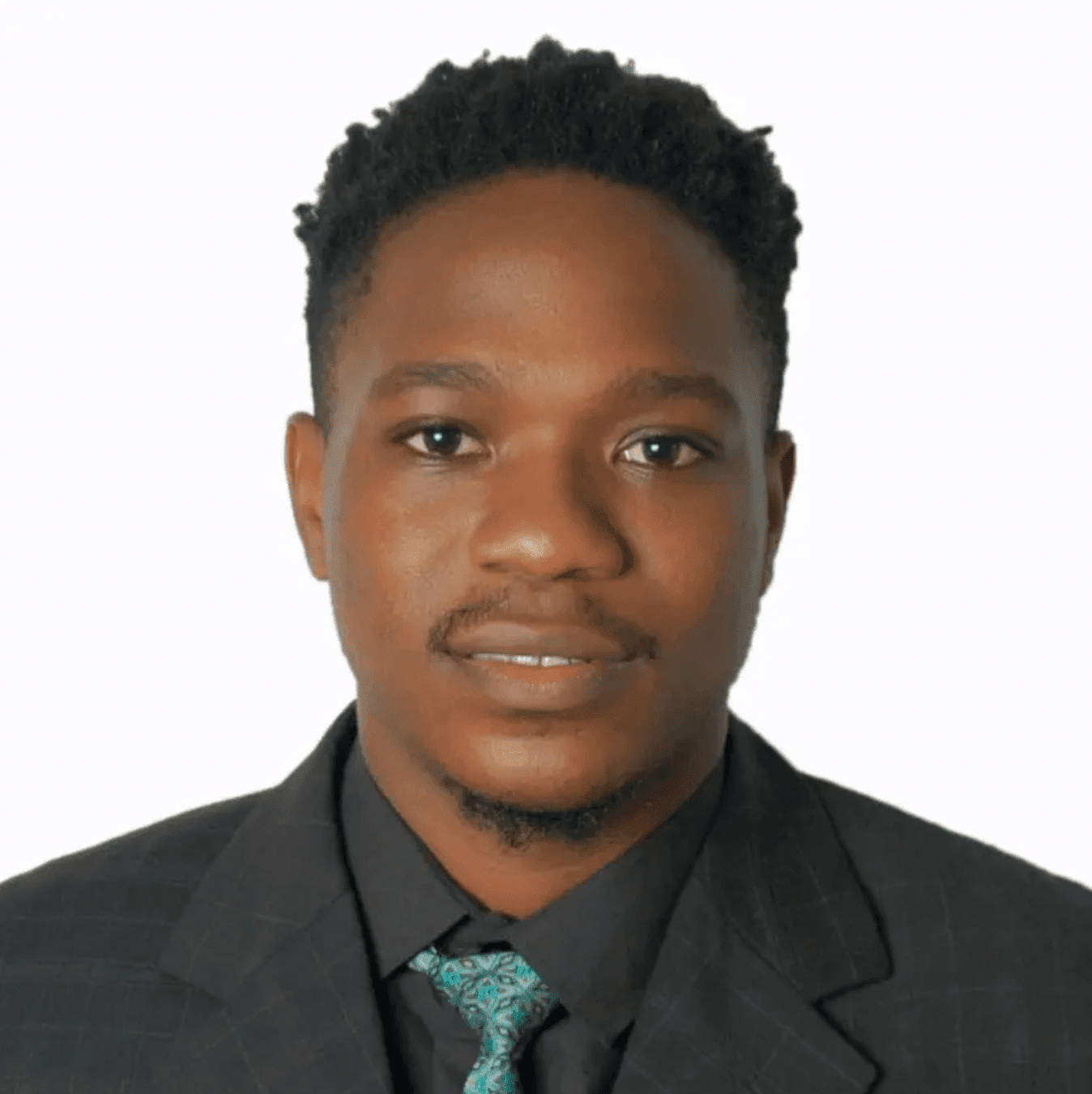
Leave a Reply Cancel reply
Your email address will not be published. Required fields are marked *

Top 3 Best Online Economics PhD Degree Programs (Doctorates)
We rank the best online PhD degree programs in economics.
Key Takeaways
- The PhD in economics degree is a highly prestigious and advanced degree that leads to many professional opportunities.
- Earning an economics doctorate can qualify you to become an economist with influence in public policy, post-secondary education, or research.
- Only a select few accredited graduate schools offer an online economics PhD or related studies.
Featured Programs
The PhD in economics is a highly prestigious degree. However, only a select few schools offer the economics PhD online. Some graduate schools of business offer doctoral or business administration degrees with courses focused on economics.
The PhD in economics is a terminal degree. This means it is the highest degree you can earn in the economics field.
Graduates with an economics doctorate can become economists. Economists enjoy well-paying careers in areas like economics research, public policy consultation, economics education, finance, and corporate executive leadership.
PhD in Economics candidates are typically already working at a high level in their field. This means that students seeking their doctorate must balance existing work and personal responsibilities with a challenging course of education. For many graduate students, online courses and fully online programs provide a way to achieve this balance.
For a look at how these online doctoral programs stack up against traditional on campus programs, check out our look at the The Best Research Universities for Economics Degrees .
Or find out what your options are with a look at our full List of University Rankings .
Otherwise, read on and learn more about how you can earn an online PhD in economics.

About Accredited Online PhD in Economics Degree Programs
Quality and credibility are important when it comes to finding an online PhD. The best online doctorate programs will have proper accreditation:
- Institutional Accreditation : Accreditation is vital for online doctoral programs. It signifies that the online PhD programs offered by the graduate school are in compliance with the standards of a Department of Education-approved accrediting body. A school must also be accredited in order to offer federal financial aid to its online doctorate candidates.
When looking for an online doctoral program, seek out options with accreditation from a colleges and schools commission in your region. This stamp of approval is critical for ensuring the quality and credibility of your online program.
- Programmatic Accreditation : In addition to institutional accreditation, consider online doctorate degree programs with programmatic accreditation. In many cases, the preferred specialized accreditation for economics degrees will be the same as that preferred for business administration degrees.
Look for doctoral programs with accreditation from the Association to Advance Collegiate Schools of Business (AACSB). This is generally an indication of credibility to prospective employers.
- Carnegie Classification : The Carnegie Classification of Institutions of Higher Education, or as it is more commonly known, the Carnegie Classification, is a framework for categorizing all accredited, degree-granting institutions in the United States. Originally formulated in 1970 by The Carnegie Foundation for the Advancement of Teaching, and administered through the University of Indiana’s Center for Postsecondary Research since 2014, the Carnegie Classification is “the leading framework for recognizing and describing institutional diversity in U.S. higher education.”
Under this classification, top research universities for doctoral degrees and PhD candidates are identified as either R2: Doctoral Universities for “high research activity” or R1: Doctoral Universities for “very high research activity.” Look for these classifications when considering options for your online Phd programs.
Key Point: The best online doctoral programs will have both institutional and programmatic accreditation.

Admission Requirements
Schools that offer online doctorate programs have different admission requirements. However, most online doctoral programs will carry the same basic threshold for admission:
- A completed online application
- Official undergraduate college transcripts
- A cumulative GPA of at least 3.0
- GRE scores, MAT scores, or GMAT scores
- Letters of recommendation
- Personal interviews
- Personal statement or essay
- Plan of study
Key Point: In most cases, you’ll be eligible to enter a doctoral degree online after earning a bachelor’s degree. However, some specialized online PhD programs may require you to have earned a master’s degree as well.

Curriculum and Courses
As with other advanced degree and graduate programs, research is the central component of your online PhD in economics program. This is true for fully online doctorate degrees as well as hybrid degrees combining online education with traditional on-campus courses. Regardless of whether you complete a traditional, hybrid or online doctoral program, the typical time to completion is three to six years.
The typical components of your online PhD program may include:
Foundational Courses
Foundational courses will typically focus on introductory topics like economic theory, models of economic analysis, economic history, international business, financial economics, and more.
You will also take courses focused on practicing your critical thinking and research skills. You may be able to complete many of these requirements online through your distance learning program.
Examinations for PhD Candidacy
Many online doctoral students are required to complete certain examinations to enter into online PhD candidacy. This will typically occur after you’ve completed one to two years of foundational courses.
Dissertation
In most cases, the central component of your online economics PhD program will be your dissertation research. After gaining status as an online PhD candidate, you will typically work closely with a professorial advisor or mentor to develop an original research question.
This research question will form the basis of your dissertation—an ongoing project designed to address this question through applied research and the demonstration of advanced knowledge. While you will work closely with your advisor or mentor, much of your dissertation will be rooted in your ability to conduct research independently. This is especially true for students pursuing an online PhD.
Oral Defense
Upon completion of the written portion of your dissertation—which will typically present the findings from your original research project—you will be expected to defend your findings. This “oral defense” will typically be conducted by a commission of professors and experts in your field. PhD candidates in some online degree programs may be able to conduct this defense via teleconferencing.
Teaching Requirements
Some online PhD programs will also include a teaching component, which will require you to work as an adjunct professor or teacher’s assistant in an undergraduate or graduate school. It may be possible for students in the online doctoral degree program to also serve teaching requirements by instructing online students.
Key Point: The online doctor of economics degree program is a research-focused degree. Your dissertation will be a central part of earning your economics degree online.
Careers for Students Who Earn Their Doctoral Degree in Economics Online
The PhD in economics is a terminal degree program. This means that students who complete credible online doctoral programs in economics are generally eligible for top positions and opportunities in their field.
According to the Bureau of Labor Statistics , the top 10% of earners among economists earned more than $193,000 in 2021. Many of these top earners worked in fields like finance, insurance, federal governance, technical consulting services, and more.
PhDs in economics are also more likely to be sought out by prestigious international organizations for leadership and consultation opportunities.
These higher earnings reflect the high demand for qualified PhDs in economics in the following fields:
- Federal Government
- Scientific and Technical Consulting Services
- Management Consulting
- Public Policy Consultation
- Economic Theory Research
- Post-Secondary Education
- Corporate Executive Leadership
Key Points: According to the Bureau of Labor Statistics, students who complete the economics doctorate program will be eligible for top-paying roles in finance, insurance, public policy, and more.

What’s the difference between online doctoral programs and online PhD programs?
Technically, a PhD is a type of doctorate degree. This means that all online PhD candidates are doctoral students. By contrast, not all doctoral students are PhD candidates.
The primary distinction is that doctoral students are primarily focused on putting existing theories into practice. Depending on your chosen field, your online doctoral degree may require participation in an educational leadership program, engagement in clinical practice, work as a resident in a nursing program, and much more.
By contrast, online PhD students are focused on creating new knowledge in their area of study. This usually means that online PhD candidates are focused on introducing new theories, creating research projects around these theories, and presenting new findings that demonstrate a mastery of existing knowledge and the insight to introduce new ideas into the field.
Today, more working professionals than ever before are pursuing both online doctoral degrees and online Phd programs.
The Best Online Economics Doctorates (PhDs)
The online PhD in economics programs identified here are ranked based on influence, with weighting for graduation rate and full-time online enrollment. Also included are online Doctorate of Business Administration (DBA) degrees courses focused on economics and related topics.
Hampton University
- #4 Best Private Colleges in Virginia 2024
- #8 Best Research Universities in Virginia 2024
- #9 Best Grad Schools in Virginia 2024
- #2 Top 16 Most Affordable Online Counseling PhDs (Doctorates)
- #2 Top 10 Best Online Counseling PhD Degree Programs (Doctorates)
- #2 Best Online Associate Degrees in Virginia 2024
- #2 Best Online Associate in Business Management
- #2 Best Online Associate in Business Administration
- #3 Top 20 Most Affordable Online PhD of Nursing (DNP) Programs
- #4 Best Online Colleges in Virginia 2024
- #5 Top 15 Fastest Accelerated Online Counseling Doctorates (PhDs)
- #5 Best HBCU Online Programs
- #5 Most Affordable Online PhDs in Psychology Ranked for 2024
- #6 Best Online Bachelor's in Law and Legal Studies Degree Programs for 2024
- #6 Top 20 Most Affordable Online Business Administration Doctorates
- #7 Best Online Master's Programs in Virginia 2024
- #8 Best Online Bachelor's in Religious Studies Degree Programs for 2024
- #8 Best Online Associate in General Studies
- #8 Best Online Master's in Sports Management
- #9 How To Get an Online Master’s Degree in Biblical Studies
- #12 Best Online Doctorate in Education Degree Programs Ranked for Students
- #14 Best Online Bachelor's in Organizational Leadership Degree Programs
- #16 Best Online Bachelor’s in Business Administration Degree Programs
- #19 Best Online Associate in Biblical Studies
- #25 Best Online Master’s in Counseling
- #5 10 Best Accelerated Online PhD Programs Ranked for Students in 2024
- #16 Best Online PhD of Nursing (DNP) Degree Programs Ranked for 2024
Tuition + fees
Student body
Median SAT/ACT
What do we love about Hampton University?
Hampton University is a private HBCU based in Hampton, Virginia. Founded in 1868 by a joint commission of Black and White leaders, Hampton was established with the mission of educating freedmen in the immediate aftermath of the U.S. Civil War.
Today, Hampton University is home to 16 leading research facilities, including the largest free-standing Proton Therapy Institute in the world.
Among its numerous post-graduate programs, Hampton University offers an online Doctor of Philosophy in Business Administration , which includes noteworthy courses in areas like Managerial Economics, Empirical Research Methods, and Advanced Topics in Research.
Wish to attend an HBCU that consistently ranks among the top ten Historically Black institutions.
Prefer a college with a major athletics program.

Liberty University
- #2 Best Christian Colleges in Virginia 2024
- #3 Best Private Colleges in Virginia 2024
- #7 Best Research Universities in Virginia 2024
- #7 Best Grad Schools in Virginia 2024
- #9 Best Colleges in Virginia 2024
- #19 Best Research Universities for Criminal Justice Degrees
- #21 Best Research Universities for Social Work Degrees
- #1 Best Online Associate Degree Programs That Can Be Completed in 1 Year
- #1 Best Online Bachelor's in Math Degree Programs Ranked for Students
- #1 Top 10 Best Online Counseling PhD Degree Programs (Doctorates)
- #1 Best Online Associate Degrees in Virginia 2024
- #1 Best Online Colleges in Virginia 2024
- #1 Best Online Associate in Economics
- #1 Best Online Associate in Philosophy
- #1 Best Online Bachelor's in Music Degree Programs Ranked for 2024
- #1 Top 15 Most Affordable Online Economics PhD Programs (Doctorates) 2024
- #1 Most Affordable Online PhDs in Psychology Ranked for 2024
- #1 Best Online Bachelor's in Christian Counseling Degree Programs
- #1 Best Online Associate in Education
- #1 Best Online Associate in Mathematics
- #1 Top 10 Best Online Bachelor's of Nursing (BSN) Programs
- #2 Accelerated Online Business Administration PhD Programs (Doctorates)
- #2 10 Best Online Bachelor's of Forensic Psychology Programs
- #2 Best Online Associate in Early Childhood Education
- #2 How To Get an Online Master’s Degree in Biblical Studies
- #2 Top 10 Best Online Master's of Psychology Degree Programs 2024
- #2 Best Online Bachelor's in Religious Studies Degree Programs for 2024
- #2 Best Online Bachelor’s in Public Administration Degree Programs for 2024
- #2 15 Fastest Accelerated Online Master's of Psychology Programs
- #2 Best Online Associate in Biblical Studies
- #2 Fastest Accelerated Online Bachelor's of Information Technology
- #3 10 Fastest Accelerated Online Bachelor's of English
- #3 Best Online Bachelor's in Cybersecurity in Virginia
- #3 Best Online Degrees for a Career in Teaching Ranked 2024
- #3 Best Online History Doctorate Degree Programs (PhDs) 2024
- #3 Best Online Bachelor’s of Christian Ministry Degree Programs for 2024
- #3 Best Online Master's in Theology
- #3 Best Online Associate in Paralegal Studies
- #3 Top 5 Best Online Criminal Justice Doctorates (PhDs) 2024
- #3 Fastest Accelerated Online Healthcare Administration Masters
- #3 Best Online Bachelor's in Cybersecurity in the District Of Columbia
- #3 Most Affordable Online Criminal Justice PhDs (Doctorates)
- #3 Fastest Accelerated Online Bachelor's of Cybersecurity
- #4 Top 16 Most Affordable Online Counseling PhDs (Doctorates)
- #4 Best Online Associate in Accounting
- #4 Best Online MBA Programs in Virginia
- #4 Best Online Bachelor's in Cybersecurity in Illinois
- #4 Top 20 Best Online Accredited Doctorate Degree Programs (PhDs) 2024
- #4 Best Online Doctorate in Organizational Leadership Degree Programs
- #4 Top 8 Fastest Accelerated Online Psychology Doctorates (PhDs)
- #4 Most Affordable Online PhD Programs Ranked for Students in 2024
- #4 Top 15 Most Affordable Online Information Technology PhD Programs
- #4 Best Online Associate in Psychology
- #4 Best Online Bachelor’s of Elementary Education Degree Programs for 2024
- #5 Top 20 Easiest Online Degrees from Accredited Schools in 2024
- #5 Top 10 Fastest Accelerated Online PhD in Criminal Justice (Doctorates)
- #5 Best Online Master's Programs in Virginia 2024
- #5 Best Online Bachelor’s in Biblical Studies
- #5 Fastest Accelerated Online Doctorate of Information Technology
- #6 Best Online Bachelor's of English Degree Programs for 2024
- #6 10 Fastest Accelerated Online Master's of Accounting Programs
- #6 Best Online Bachelor’s of Graphic Arts Degree Programs for 2024
- #6 Best Online Master’s in Biblical Studies
- #6 Best Online Bachelor's in Strategic Communications Degree Programs
- #7 Top 15 Fastest Accelerated Online Counseling Doctorates (PhDs)
- #7 The Best Online Christian Colleges and Universities for Bachelor's Degrees
- #7 Best Online Doctorate of Educational Psychology (PhDs) 2024
- #7 Online Colleges That Start Anytime and the Benefits of a Self-Paced Education
- #8 Best Online Associate in History Degrees
- #8 Top 20 Most Affordable Online Bachelor's of Cybersecurity
- #8 Top 20 Most Affordable Online Business Administration Doctorates
- #8 Top 10 Best Online Communications PhD Degree Programs (Doctorates)
- #9 Best Online Bachelor’s of Early Childhood Education Degree Programs for 2024
- #9 Most Unusual Doctoral Degrees You Can Earn Online (PhDs)
- #9 Best Online Bachelor’s of Data Science and Analytics Degree Programs for 2024
- #9 Best Online Bachelor's in Law and Legal Studies Degree Programs for 2024
- #9 Best Online Associate's in Physics
- #9 Best Online Bachelor’s of Education Degree Programs for 2024
- #9 Best Online Master's in Biology
- #9 Best Online Associate in Business Administration
- #10 Best Online Bachelor's in Social Work Degree Programs Ranked for 2024
- #10 Best Online Bachelor’s of Data Science and Analytics Degree Programs for 2024
- #10 Best Online Bachelor's in Interdisciplinary Studies Degree Programs for 2024
- #10 Best Online Bachelor's in Network Administration Degree Programs for 2024
- #11 20 Fastest Accelerated Online English Doctorates (PhDs) 2024
- #11 Best Online Doctorate in Business Administration Degree Programs
- #11 Top 20 Most Affordable Online Master's of Nursing Programs
- #11 Best Online Bachelor's of Finance Degree Programs for 2024
- #12 Best Online Bachelor’s of History Degree Programs Ranked for 2024
- #12 Best Online Master's in Project Management
- #12 Most Affordable Online Applied Behavioral Analysis PhD Programs
- #12 Best Online Master's in Sports Management
- #13 Best Online Bachelor’s of Homeland Security Degree Programs for 2024
- #14 Best Online Bachelor's in Sports Management Degree Programs for 2024
- #14 Best Online Bachelor's of Healthcare Administration Degree Programs for 2024
- #14 Top 18 Most Affordable No GRE Online PhD Degree Programs
- #15 Best Online Christian Colleges and Universities for Master's Degrees
- #16 Best Online Associate in Criminal Justice
- #17 Best Online Bachelor’s in Marketing and Advertising Degree Programs for 2024
- #17 Most Affordable Online Criminology Doctorate Programs (PhDs)
- #18 Top 20 Most Affordable Online Doctorate of Education (PhDs)
- #18 Most Affordable Online Master's Degree Programs Ranked for Students
- #18 Best Online Bachelor's in Computer Science Degree Programs
- #18 Best Online Master’s in Finance
- #20 Best Online Bachelor's in Accounting
- #21 Best Online Bachelor's in Cybersecurity
- #23 Best Online Master’s in Counseling
- #25 Best Online Associate in Christian Ministry
- #25 Best Online Bachelor's of Economics Degree Programs for 2024
- #1 Fastest Accelerated Online Associate's of Counseling Degree Programs
- #2 Fastest Accelerated Online PhDs in Education Degree Programs 2024
- #5 20 Fastest Online Bachelor's of Business Degree Programs Ranked 2024
- #5 Top 20 Fastest Accelerated Online Bachelor's in Counseling
- #6 10 Best Accelerated Online PhD Programs Ranked for Students in 2024
- #6 How to Earn Your Master's Degree Without Your Bachelor's Degree
- #6 Best College Majors that Offer Accelerated Degree Programs
- #8 Fastest Accelerated Online Master's of Counseling Degree Programs 2024
- #14 Fastest Accelerated Online Master's of Nursing Degree Programs 2024
What do we love about Liberty University?
Liberty University is one of the largest Christian universities in the world as well as one of the largest private non-profit universities in the U.S. Much of this size is based on its online enrollment.
Liberty University enrolls roughly 15,000 residential students across its 17 colleges, and an additional 80,000 through its extensive online course and degree offerings.
Liberty University is noted for the sheer volume of advanced degrees and online degrees earned by its student body. With more than 47,000 students pursuing advanced degrees, Liberty University offers an extremely wide range of online doctoral programs, including online PhD programs in many different disciplines.
For instance, Liberty University offers an online Doctor of Philosophy in Public Policy with a concentration in Economic Policy . Liberty University’s PhD program is structured to build upon your existing knowledge of economics and provide a deeper look at how the discipline of economics relates to public policy.
Wish to attend the world’s largest seminary—Liberty University’s Rawlings School of Divinity.
Students who do not identify with Evangelical Christianity.
Baker College
- #10 Fastest Accelerated Online Master's of Cybersecurity
- #20 Best Online Colleges in Michigan 2024
- #24 Best Online Associate Degrees in Michigan 2024
- #17 20 Fastest Online Bachelor's of Business Degree Programs Ranked 2024
Baker College’s faculty and alumni have been influential in:
- Engineering
- Computer Science
- Criminal Justice
What do we love about Baker College?
Baker College was founded in 1911, and established its first campus in Flint, Michigan. Beginning as a for-profit institution called the Baker Business College, Baker would evolve into a non-profit college in 1977.
Today, Baker’s primary campus is located in Owosso, Michigan with another ten satellite campuses throughout the state’s Lower Peninsula region. Nearly 5000 undergraduate and postgraduate students are currently in pursuit of degrees at Baker.
Baker College offers an online Doctor of Business Administration geared toward aspiring international business leaders, featuring courses such as Global Financial Economy, Leading 21st Century Organizations, and Introduction to Research Methods and Design.
Are looking for an accessible academic institution. More than 85% of applicants are accepted into Baker.
Are looking to get involved in campus life. Students indicate that Baker has a limited offering of campus clubs and activities.
Other Options for Aspiring Economists
Students considering an online doctoral in economics should also check out the best on-campus options to compare features like cost, curriculum, acceptance rate, and more.
University of California, Berkeley
- #2 Best Universities in the US Ranked for Prospective Students in 2024
- #2 50 Best Colleges and Universities Ranked for Undergrads in 2024
- #2 Top Schools that Offer Free Master's Degrees Online
- #4 50 Best Graduate Schools Ranked for Prospective Students in 2024
- #5 Best Universities in the World 2024
- #16 50 Best Research Universities Ranked for Undergrads in 2024
- #1 Best Public Colleges California 2024
- #1 Most Affordable Colleges in California 2024
- #2 The Most Influential Universities and Colleges Ranked by State 2024
- #2 Best Colleges in California 2024
- #2 Best Research Universities in California 2024
- #2 Best Grad Schools California 2024
- #2 Best Research Universities for Social Work Degrees
- #3 Best Research Universities for Communications Degrees
- #4 Best Research Universities for Engineering Degrees
- #4 Best Research Universities for Sociology Degrees
- #4 Best Research Universities for Computer Science Degrees
- #4 Best Research Universities for Chemistry Degrees
- #5 Best Research Universities for Anthropology Degrees
- #5 Best Research Universities for Math Degrees
- #6 Best Research Universities for Physics Degrees
- #7 Best Research Universities for English Degrees
- #7 Best Research Universities for History Degrees
- #7 Best Research Universities for Political Science Degrees
- #7 Best Research Universities for Philosophy Degrees
- #8 Best Research Universities for Earth Sciences Degrees
- #8 Best Research Universities for Biology Degrees
- #8 Best Research Universities for Economics Degrees
- #9 Best Research Universities for Psychology Degrees
- #9 Best Research Universities for Religious Studies Degrees
- #1 Best Online History Doctorate Degree Programs (PhDs) 2024
- #1 Top 5 Best Online Sociology PhD Degree Programs (Doctorates) 2024
- #2 Fastest Accelerated Online Computer Science Doctorates (PhDs)
- #2 Most Affordable Online Computer Science PhDs (Doctorates) 2024
- #2 Top 5 Best Online English PhD Degree Programs (Doctorates)
- #2 Top 8 Best Online Public Health PhD Degree Programs (Doctorates)
- #3 Top 6 Best Online Clinical Nutrition PhD Degree Programs (Doctorates)
- #4 Guide to Free Online Courses for MBA Students in 2024
- #3 Best Schools in the World for Earning an MBA Degree Ranked for 2024
- #9 The Best Traditional MBA Programs Ranked for Students in 2024
Career Outlook for Economics degree at University of California, Berkeley
University of California, Berkeley’s faculty and alumni have been influential in:
- Earth Sciences
- Mathematics
- Anthropology
- Communications
Most Influential Alumni
- Daniel Kahneman
- John Kenneth Galbraith
- Timothy Leary
- Shing-Tung Yau
- Ken Thompson
- Niklaus Wirth
- Douglas Engelbart
- Theodosius Dobzhansky
- Betty Friedan
- George Dantzig
- Octavio Paz
- Gary Snyder
New York University
- #13 Best Universities in the World 2024
- #23 50 Best Research Universities Ranked for Undergrads in 2024
- #2 Best Research Universities in New York 2024
- #2 Best Colleges in New York 2024
- #2 Best Grad Schools in New York 2024
- #2 Best Private Colleges in New York 2024
- #3 The Most Influential Universities and Colleges Ranked by State 2024
- #3 Best Research Universities for Social Work Degrees
- #3 Best Research Universities for Education Degrees
- #7 Best Research Universities for Communications Degrees
- #7 Best Research Universities for Business Degrees
- #8 Best Research Universities for English Degrees
- #8 Best Research Universities for Nursing Degrees
- #12 Best Research Universities for Psychology Degrees
- #12 Best Research Universities for Philosophy Degrees
- #12 Best Research Universities for Economics Degrees
- #14 Best Research Universities for Sociology Degrees
- #15 Best Research Universities for Anthropology Degrees
- #15 Best Research Universities for Religious Studies Degrees
- #15 Best Research Universities for History Degrees
- #15 Best Research Universities for Political Science Degrees
- #15 Best Research Universities for Math Degrees
- #18 Best Research Universities for Computer Science Degrees
- #18 Best Research Universities for Biology Degrees
- #23 Best Research Universities for Engineering Degrees
- #23 Best Research Universities for Physics Degrees
- #1 20 Best Online Master's of Speech Pathology Degree Programs
- #1 Best Online Master's Programs in New York 2024
- #1 Top 10 Best Online Communications PhD Degree Programs (Doctorates)
- #1 Best Online Master's Programs 2024
- #1 Top 5 Best Online English PhD Degree Programs (Doctorates)
- #2 Best Online Master's in Management
- #2 Top 6 Best Online Clinical Nutrition PhD Degree Programs (Doctorates)
- #3 Top 10 Best Online Counseling PhD Degree Programs (Doctorates)
- #3 Top 5 Best Online Sociology PhD Degree Programs (Doctorates) 2024
- #3 Fastest Online Master's Degrees Ranked for Students in 2024
- #1 Fastest Accelerated Online Master's of Counseling Degree Programs 2024
- #1 Fastest Accelerated Online PhDs in Education Degree Programs 2024
- #5 Top 20 Best Business Schools for MBAs Ranked for Students
- #7 The Best Traditional MBA Programs Ranked for Students in 2024
New York University’s faculty and alumni have been influential in:
- Social Work
- Erich Fromm
- Robert Mueller
- Martha Nussbaum
- John Archibald Wheeler
- Glenn Greenwald
- Howard Zinn
- Eric Kandel
- Lewis Mumford
- Alvin Toffler
- Louis Nirenberg
University of Michigan
- #4 Top Schools that Offer Free Master's Degrees Online
- #9 Best Universities in the US Ranked for Prospective Students in 2024
- #11 50 Best Graduate Schools Ranked for Prospective Students in 2024
- #11 Best Universities in the World 2024
- #22 50 Best Research Universities Ranked for Undergrads in 2024
- #1 Best Research Universities in Michigan 2024
- #1 The Most Influential Universities and Colleges Ranked by State 2024
- #1 Best Colleges in Michigan 2024
- #1 Best Grad Schools in Michigan 2024
- #1 Most Affordable Colleges in Michigan 2024
- #1 Best Public Colleges in Michigan 2024
- #2 Best Research Universities for Education Degrees
- #4 Best Research Universities for Business Degrees
- #5 Best Research Universities for Nursing Degrees
- #6 Best Research Universities for Psychology Degrees
- #6 Best Research Universities for Communications Degrees
- #8 Best Research Universities for Anthropology Degrees
- #8 Best Research Universities for Sociology Degrees
- #9 Best Research Universities for History Degrees
- #10 Best Research Universities for Computer Science Degrees
- #11 Best Research Universities for Engineering Degrees
- #11 Best Research Universities for Philosophy Degrees
- #11 Best Research Universities for Math Degrees
- #11 Best Research Universities for Economics Degrees
- #12 Best Research Universities for English Degrees
- #12 Best Research Universities for Political Science Degrees
- #13 Best Research Universities for Earth Sciences Degrees
- #13 Best Research Universities for Physics Degrees
- #13 Best Research Universities for Chemistry Degrees
- #13 Best Research Universities for Biology Degrees
- #14 Best Research Universities for Religious Studies Degrees
- #1 Best Online MBA Programs in Michigan
- #1 Best Online Master's Programs in Michigan 2024
- #1 Best Online Master’s in Health Science
- #1 Best Online MBA Degree Programs No GRE Required Ranked for 2024
- #1 Top 8 Best Online Public Health PhD Degree Programs (Doctorates)
- #1 Fastest Online Master's Degrees Ranked for Students in 2024
- #2 Best Online History Doctorate Degree Programs (PhDs) 2024
- #2 Top 10 Best Online Communications PhD Degree Programs (Doctorates)
- #2 Best Online Master's Programs 2024
- #2 Top 5 Best Online Sociology PhD Degree Programs (Doctorates) 2024
- #3 Top 5 Best Online English PhD Degree Programs (Doctorates)
- #4 Top 6 Best Online Clinical Nutrition PhD Degree Programs (Doctorates)
- #6 Guide to Free Online Courses for MBA Students in 2024
- #1 Fastest Accelerated Online Master's of Nursing Degree Programs 2024
- #5 The Best Traditional MBA Programs Ranked for Students in 2024
Career Outlook for Economics degree at University of Michigan
University of Michigan’s faculty and alumni have been influential in:
- Claude Shannon
- Arthur Miller
- Alvin Plantinga
- Edgar F. Codd
- Hans-Hermann Hoppe
- Stephen Smale
- Urie Bronfenbrenner
- John Henry Holland
- Amos Tversky
- Marshall Sahlins
University of California, Los Angeles
- #7 America's 15 Most Technologically Advanced Colleges
- #13 50 Best Graduate Schools Ranked for Prospective Students in 2024
- #13 50 Best Colleges and Universities Ranked for Undergrads in 2024
- #14 Best Universities in the US Ranked for Prospective Students in 2024
- #17 Best Universities in the World 2024
- #2 Best Public Colleges California 2024
- #2 Most Affordable Colleges in California 2024
- #3 Best Colleges in California 2024
- #3 Best Research Universities in California 2024
- #3 Best Grad Schools California 2024
- #6 Best Research Universities for Nursing Degrees
- #8 Best Research Universities for Education Degrees
- #9 Best Research Universities for Business Degrees
- #10 Best Research Universities for Communications Degrees
- #11 Best Research Universities for Anthropology Degrees
- #12 Best Research Universities for Sociology Degrees
- #12 Best Research Universities for Earth Sciences Degrees
- #12 Best Research Universities for Chemistry Degrees
- #13 Best Research Universities for Math Degrees
- #14 Best Research Universities for Psychology Degrees
- #14 Best Research Universities for Engineering Degrees
- #14 Best Research Universities for History Degrees
- #14 Best Research Universities for Physics Degrees
- #14 Best Research Universities for Biology Degrees
- #15 Best Research Universities for English Degrees
- #15 Best Research Universities for Philosophy Degrees
- #16 Best Research Universities for Economics Degrees
- #17 Best Research Universities for Computer Science Degrees
- #18 Best Research Universities for Political Science Degrees
- #21 Best Research Universities for Religious Studies Degrees
- #4 Best Online History Doctorate Degree Programs (PhDs) 2024
- #4 Top 5 Best Online English PhD Degree Programs (Doctorates)
- #4 Top 5 Best Online Sociology PhD Degree Programs (Doctorates) 2024
- #14 The Best Traditional MBA Programs Ranked for Students in 2024
Career Outlook for Economics degree at University of California, Los Angeles
University of California, Los Angeles’s faculty and alumni have been influential in:
- Hilary Putnam
- Elinor Ostrom
- Judea Pearl
- Glenn T. Seaborg
- Barry Boehm
- Stanley Cavell
- William F. Sharpe
- John Ehrlichman
- Stephen Krashen
- Edward O. Thorp
- Stephen Kosslyn
George Mason University
- #2 Best Colleges in Virginia 2024
- #2 Best Grad Schools in Virginia 2024
- #4 The Most Influential Universities and Colleges Ranked by State 2024
- #14 Best Research Universities for Criminal Justice Degrees
- #2 Top 15 Most Affordable Online Information Technology PhD Programs
- #4 10 Fastest Accelerated Online Master's of Accounting Programs
- #5 Best Online Bachelor's in Cybersecurity in Virginia
- #5 Top 8 Fastest Accelerated Online Psychology Doctorates (PhDs)
Career Outlook for Economics degree at George Mason University
George Mason University’s faculty and alumni have been influential in:
- Political Science
- Tyler Cowen
- Peter Boettke
- Stephen Moore
- Steven Horwitz
- Alex Tabarrok
- Peter Leeson
- Fred Foldvary
- Stephen Blair Hedges
- Jon Gettman
- Richard Bausch
- Ivan Katchanovski
Check out the full List of Online Programs .
2024 Best Online PhD in Finance Programs [Doctorate Guide]
An online PhD in Finance offers the opportunity to study finance and economics at the highest level.

You can learn how to use financial models and theories to develop a deeper understanding of economic systems and solve business problems. Finance PhD degrees also teach students to conduct quantitative research on financial networks and policies.
Editorial Listing ShortCode:
Graduates can use their knowledge and skills to pursue careers in a variety of areas, including academia, business consulting, data science, finance, and the public sector.
PhD in Finance Programs Online

A Ph.D. in Finance is designed for people who want to immerse themselves in academic research and theory. This degree focuses on advanced financial models and concepts used to explain and forecast the performance of the economy, financial institutions, investments, and other aspects of modern finance.
Doctoral students in this field also study approaches and techniques for conducting empirical research. Students practice collecting and interpreting data from a variety of sources, such as consumer surveys and income statements. They also use econometrics to statistically analyze financial data and trends.
Other topics commonly taught in finance doctoral programs include:
- Asset pricing
- Banking systems
- Corporate finance and capital markets
- Empirical analysis
- Financial decision-making
- Financial markets
- International financial topics
- Macroeconomics
- Market design
- Microeconomics
- Time series analysis
Additionally, students can develop many technical skills related to financial research. For instance, finance PhD programs often encourage students to use programming languages like Python and R to extract and analyze data. Students may also learn to use the latest digital tools to interpret data and create financial models, such as MATLAB and Stata.
Graduates can use their finance PhD degrees to pursue a broad range of careers. Many students enroll in these programs because they want to work in higher education. They may use their specialized knowledge to become professors and academic researchers.
The private sector also provides many employment opportunities for PhD holders. All organizations need business-savvy professionals who can manage financial resources, make predictions, and formulate financial strategies. As a result, there are numerous finance-related jobs in all industries.
Graduates may also secure jobs with nonprofit organizations. Some work as grant writers, while others become policy analysts. Other potential careers in this sector include development officer and program manager. These roles all focus on helping nonprofit organizations generate more income and solve economic or social issues.
Finally, this degree can be beneficial for people who want to become consultants or entrepreneurs. You can learn business tactics and skills that you can use to help clients perform better or to launch your own company.
Finance Careers & Salaries
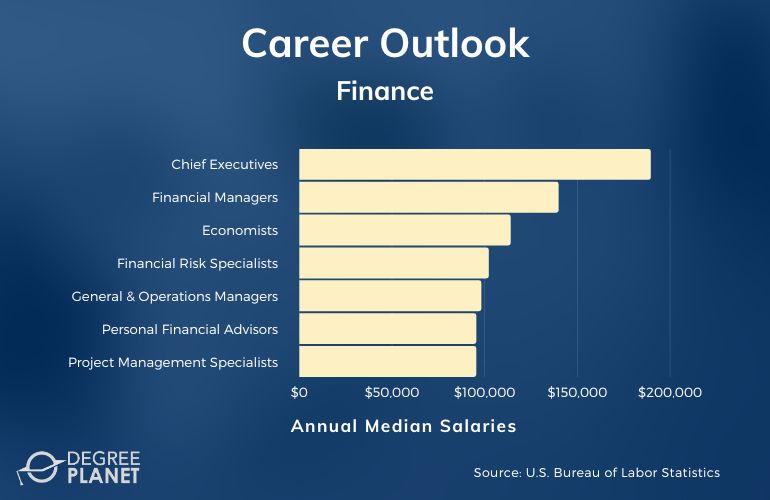
A doctoral degree in finance can pave the way for many career paths. Many graduates pursue careers as college professors in business, economics, and finance departments. These professionals teach students and publish research in their area of specialty.
Additionally, many graduates secure employment with private corporations and financial institutions, including banks, credit unions, and investment firms. They can become actuaries, cost estimators, financial analysts, and other finance professionals.
These specialists use the advanced knowledge and research skills they gained during their PhD programs to analyze financial data and help corporations make data-driven business decisions.
According to the Bureau of Labor Statistics , here are careers associated with finance and their median salaries.
Some graduates become financial analysts and researchers for government agencies and think tanks. They often help their employers develop and explore the implications of economic policies, political strategies, and social policies. Graduates can also work for or start consulting firms.
Business and management consultants examine their clients’ financial records and operations. They use their findings to identify inefficient workflows and other issues and make recommendations to help businesses improve their performance.
Online Finance PhD Curriculum & Courses

Finance PhD programs teach advanced finance concepts and research skills. The specific curricula vary by program but may include courses similar to these:
- Empirical Methodology in Finance : You’ll learn how to use popular empirical research methods to investigate and solve issues in the finance industry.
- Financial Economics : This course analyzes foundational theories and applications of modern financial economics, such as arbitrage pricing theory, mean variance theory, and stochastic dominance.
- Financial and Economic Networks : You’ll use empirical and theoretical research methodologies to deepen your understanding of financial modeling and networks.
- Household Finance : You’ll explore recent empirical research projects in household finance and learn strategies to gather and analyze data.
- International Finance : This class traces the history of academic research on international finance and covers techniques students can use to conduct research in this field.
- Introduction to Asset Pricing : You’ll investigate how finance institutions use asset pricing models to predict the expected rate of return for investments.
- Introduction to Corporate Finance : You’ll learn how to create, interpret, and conduct quantitative research with corporate finance models.
- Macro-Finance : You’ll examine fundamental areas and methods in macro-finance, such as asset pricing, fiscal policy, and household finance.
- Microeconomics : This course overviews applications and theories of microeconomics, including aggregated demand and general equilibrium analysis.
- Theories of Finance : You’ll study contemporary financial theories and their relationship to asset pricing, corporate finance, and financial markets.
Additionally, many programs require finance PhD students to take courses in statistics and probability.
How to Choose an Online PhD in Finance Program

All finance PhD programs have different educational opportunities, learning environments, and resources. As a result, there are many factors to consider as you compare finance degree online programs, such as:
- Program reputation . Employers often look more favorably at job candidates who graduated from high-ranking institutions with excellent reputations. Additionally, attending a top program could provide more opportunities to develop a robust professional network in your chosen area.
- Research areas . Doctoral students typically research and write about specific topics or subfields that align with their personal and professional interests. It’s beneficial to look for a program with well-known faculty specializing in your chosen areas, such as corporate governance or behavioral finance. These professors can guide your research and connect you with resources.
- Funding opportunities . Some PhD programs in finance offer full or partial funding for qualifying students. You might qualify to receive a tuition waiver, a stipend to cover conference travel, and other financial assistance. You can also inquire about additional funding opportunities, such as grants and scholarships from the college.
- Course format . The specific mode of delivery for online courses varies. Some programs offer synchronous online classes, which allow you to interact with professors and peers over video chat. Others have asynchronous courses that you complete on your own schedule.
Additionally, you can ask a program’s staff if they have current students or recent alumni willing to speak with you. These informal conversations can help you get a better sense of the program’s culture and strengths and weaknesses.
Admissions Requirements

Many PhD programs in finance only admit a limited number of students each year, so the admissions process can be competitive.
Every institution has its own admissions criteria, but here are a few typical requirements:
- Bachelor’s or master’s degree in related field
- Statement of purpose describing your interests, goals, and reasons for applying
- CV listing education, work experience, applicable skills, and volunteer activities
- Confidential letters of recommendation
- Official transcripts
Some colleges and universities also request GMAT or GRE scores, but many programs are phasing out this requirement.
Online PhD in Finance Programs Accreditation
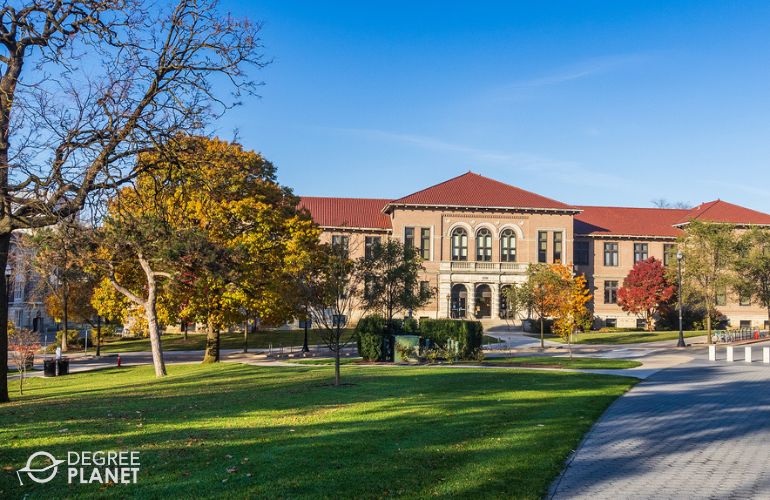
Accreditation is an essential factor to consider as you compare finance doctoral programs, much like when considering an MBA in Finance online or on campus programs. Colleges and universities can earn regional accreditation if an external regional accreditor assesses their programs and faculty and verifies that they meet agreed-upon educational standards.
Accredited programs offer professional and academic benefits. Employers often prefer to hire graduates from accredited schools because they know these candidates have received a quality education. Accredited doctoral programs typically provide access to student support services, such as online library databases and career centers.
Plus, many government agencies and private organizations only distribute financial assistance to students enrolled at accredited institutions.
Financial Aid and Scholarships
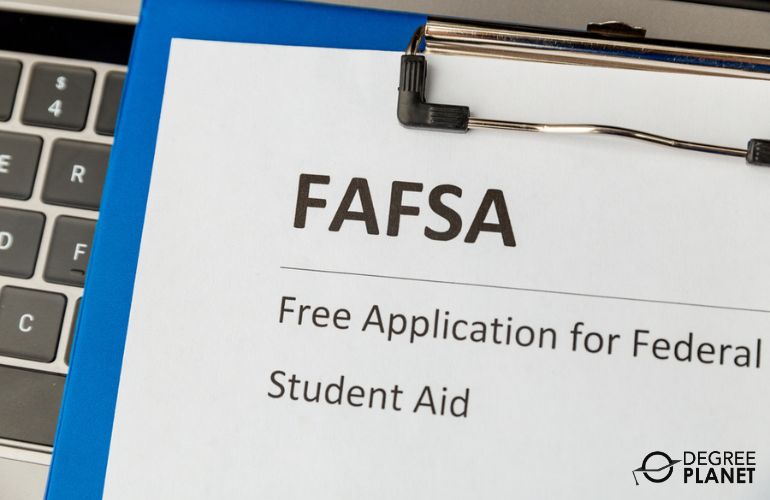
As you investigate finance PhD programs, you can also search for financial aid opportunities to help pay for your degree.
Many doctoral programs offer full funding for qualified students. These funding packages could include a stipend, tuition waiver, and health insurance. Students may need to work as a teaching or research assistant in exchange for this funding. Also, they are typically required to maintain a certain GPA and meet program milestones.
The federal government also offers several types of financial assistance for graduate students. You may be eligible for federal grants, student loans, or a part-time work-study program. You can learn more about these opportunities by visiting the Federal Student Aid website.
In addition, many employer offer financial support for workers who want to further their education. You can ask your supervisor about any tuition assistance or reimbursement opportunities.
What Can You Do with a PhD in Finance?

A doctoral degree in finance can help you qualify for many lucrative careers. Many graduates use their expertise and research skills to secure positions as postsecondary teachers.
The Bureau of Labor Statistics predicts that the demand for this career will increase by 12% over the next decade. Additionally, a PhD in Finance can help prepare you for numerous jobs in business and finance. Some graduates become financial managers and oversee their organization’s investments and revenue.
Finance is a good career path for many students. Other potential career paths in the finance industry include financial examiner, chief financial officer (CFO), management analyst, and operations research analyst. These positions focus on data analytics and strategic decision-making.
Should I Get a PhD in Finance?

Finance PhD degrees tend to be rigorous and involve extensive research and writing.
Here are a few signs that this degree could be the right fit:
- Your preferred career requires a terminal degree in the field.
- You enjoy studying economics, mathematics, and statistics.
- You want to become an expert in financial systems and theories.
- You’re passionate about researching topics in business and finance.
- You want to publish your research for academic audiences.
- You’re interested in teaching students.
If some of these criteria apply to you, a doctoral degree in finance could be a strategic next step.
How Long Does It Take to Get a PhD in Finance Online?

Most PhD programs in finance take 3 to 5 years to complete if you enroll full-time. But several factors can affect how long it takes you to graduate.
Programs that require a dissertation typically take longer. Many students spend a total of 5 years—including 3 years completing coursework and 2 years writing their dissertation. Some students take longer, though, to finish their dissertations, extending the length of their program.
Doctorate programs that don’t require a dissertation may be completed in 3 to 4 years if students are enrolled full-time.
What’s the Difference Between a DBA vs. PhD in Finance?
A Doctor of Business Administration (DBA) and a Doctor of Philosophy (PhD) are both terminal degrees in finance, but they have a few crucial differences.
A PhD could be a strategic choice if you’re passionate about research and teaching.
Is a PhD in Finance Worth It?

Yes, a PhD in Finance is worth it for many students. This degree allows you to develop a deeper understanding of economics, financial markets, and investment techniques. You’ll also learn how to identify business problems and mitigate risk.
In addition, a doctorate in finance enables you to develop expertise in specific areas of finance. For instance, you could specialize in behavioral finance, econometrics, or financial technologies. Expertise in these fields could lead to career paths in academic institutions, corporations, tech startups, and other organizations.
The Bureau of Labor Statistics predicts that overall employment of business and finance professionals will increase by 7% over the next ten years, and 12% job growth is projected for postsecondary teachers.
Universities Offering Online Doctorate in Finance Degree Programs
Methodology: The following school list is in alphabetical order. To be included, a college or university must be regionally accredited and offer degree programs online or in a hybrid format.

A Doctorate in Personal Financial Planning is available through Kansas State University. The program is 1 of only 4 in the country recognized by the Certified Financial Planner Board of Standards. Coursework is completed online during the fall and spring. There are three summer residencies, lasting 10 days each. The final residency is abroad. Kansas State University is accredited by the Higher Learning Commission.

National University offers a PhD in Business Administration with a concentration in Financial Management. The program may be completed entirely online. On average, the required 60 credits may be completed in 73 months. Courses are 4 to 8 weeks long. The school offers weekly start dates. National University is accredited by the WASC Senior College and University Commission.

A Doctorate of Professional Studies with a concentration in Finance may be earned through Pace University. Coursework is completed online with Friday sessions on campus once per month. Courses follow a semester schedule. Typically, the 19 required courses may be completed in 3 years. Pace University is accredited by the Middle States Commission on Higher Education.

Texas Tech University offers a PhD in Personal Financial Planning. The program is available fully online or on campus. The program requires 72 credits. Courses follow a semester schedule with 3 start dates. Upon completion, graduates may be eligible to take the CFP Certification exam. Texas Tech University is accredited by the Southern Association of Colleges and Schools Commission on Colleges.
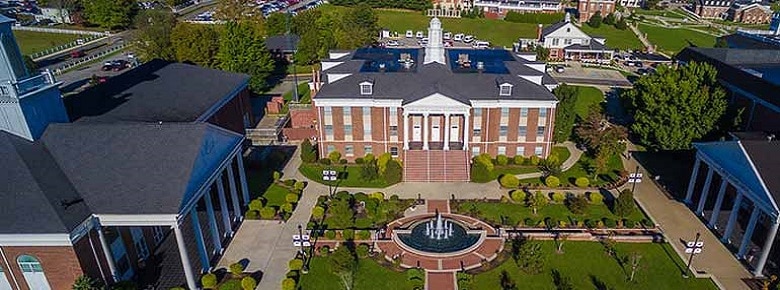
A PhD in Business with a specialization in Finance through the University of the Cumberlands. Coursework is online with fieldwork or an internship required. The program requires 66 credits including 24 hours in professional research and 24 hours in Finance. Courses are in half- or full-terms. The University of the Cumberlands is accredited by the Southern Association of Colleges and Schools Commission on Colleges.
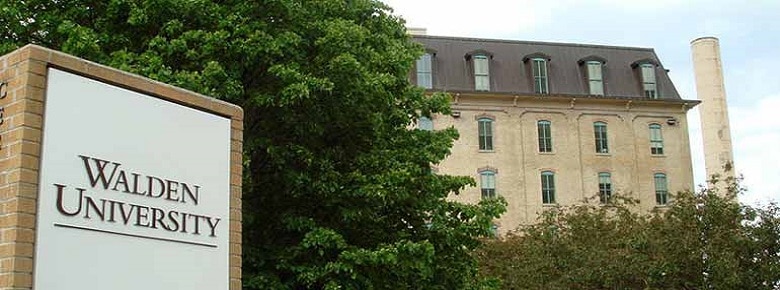
Walden University offers a PhD in Management with a specialization in 21st Century Finance. The program is fully online and requires 4 brief academic residencies. The program is course-based with weekly assignments. Most courses are asynchronous in format. Courses are in an accelerated format with several start dates each year. Walden is accredited by the Higher Learning Commission.
Getting Your Doctorate in Finance Online

If you want to study and help solve complex business and financial problems, you might consider earning an online PhD in Finance.
Finance doctoral programs teach students about asset planning, financial models, regulations, and other topics. They also cover empirical research skills, such as creating surveys and managing datasets. Graduates apply their knowledge in many positions. Some become college professors, while others pursue roles as financial managers, consultants, and marketing analysts.
You can kickstart your doctoral journey by exploring online finance PhD programs from accredited schools today.


- Youth Program
- Wharton Online
Wharton’s PhD program in Finance provides students with a solid foundation in the theoretical and empirical tools of modern finance, drawing heavily on the discipline of economics.
The department prepares students for careers in research and teaching at the world’s leading academic institutions, focusing on Asset Pricing and Portfolio Management, Corporate Finance, International Finance, Financial Institutions and Macroeconomics.
Wharton’s Finance faculty, widely recognized as the finest in the world, has been at the forefront of several areas of research. For example, members of the faculty have led modern innovations in theories of portfolio choice and savings behavior, which have significantly impacted the asset pricing techniques used by researchers, practitioners, and policymakers. Another example is the contribution by faculty members to the analysis of financial institutions and markets, which is fundamental to our understanding of the trade-offs between economic systems and their implications for financial fragility and crises.
Faculty research, both empirical and theoretical, includes such areas as:
- Structure of financial markets
- Formation and behavior of financial asset prices
- Banking and monetary systems
- Corporate control and capital structure
- Saving and capital formation
- International financial markets
For information on courses and sample plan of study, please visit the University Graduate Catalog .
Get the Details.
Visit the Finance website for details on program requirements and courses. Read faculty and student research and bios to see what you can do with a Finance PhD.
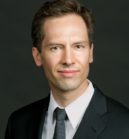
Finance Doctoral Coordinator Prof. Luke Taylor John B. Neff Associate Professor in Finance, Professor of Finance Co-Director, Rodney L. White Center for Financial Research Email: [email protected] Phone: (215) 898-4802
15 Best Online PhD in Finance Programs [2024 Guide]
Looking for Online PhD in Finance Programs? Some schools have no GRE and offer accelerated courses to help you finish faster.

A doctoral degree in finance may be your ticket to the career you’ve always wanted.
Editorial Listing ShortCode:
This online finance degree can help you pursue an executive role or a teaching job related to accounting, banking, asset management, or financial policymaking.
Universities Offering Online PhD in Finance Programs
Methodology: The following school list is in alphabetical order. To be included, a college or university must be regionally accredited and offer degree programs online or in a hybrid format.
1. Capella University
With Capella University in Minnesota, students can study online to earn a DBA with a concentration in Accounting or a PhD in Business Management with a concentration in Accounting.
These programs are designed to help students learn about theories, methods, rules and ethical issues that influence accounting practice and consider the implications of practicing accounting within a global marketplace.
Before graduation, DBA students are expected to complete two residencies and submit a major research project. PhD students are expected to do three residencies and complete a dissertation.
Both programs use Capella’s GuidedPath format with weekly discussions and specific deadlines for submitting assignments.
- PhD in Accounting
- DBA in Accounting
Capella University is accredited by the Higher Learning Commission.
2. City University of Seattle
When you study with City University of Seattle, you’ll have the opportunity to choose your own area of specialty for your DBA program.
Students who choose the Specialized Study concentration can submit a proposal for the graduate-level courses they would like to take as part of their studies.
If you’re interested in finance, you may be able to request courses on the topics of finance and accounting. During online classes, you’ll have opportunities to engage in live conversations with faculty.
You’ll be expected to submit a dissertation during your doctoral studies and complete three different residencies.
- DBA in Business Administration (Finance concentration)
The City University of Seattle is Accredited by the Northwest Commission on Colleges and Universities.
3. George Fox University
As you pursue a DBA with a concentration in Accounting from George Fox University, you may take classes like Advanced Applications of Ethical Reasoning and Compliance in Accounting and Advanced Topics in Accounting.
In addition, you’ll need to complete both a dissertation and a practicum for the program. During the practicum, you’ll have opportunities to try your hand at teaching or consulting.
Most of the work for this hybrid DBA program is online, but you’ll need to report to the school’s campus in Oregon a few times a year.
George Fox University is accredited by the Northwest Commission on Colleges and Universities.
4. Hampton University
If you’re interested in a PhD in Business Administration, check out Hampton University in Virginia. The program students to pursue a concentration in Accounting and Finance by taking multiple credit hours of elective courses.
These electives include classes like Financial Accounting and Reporting Research, Accounting Theory, Corporate and Financial Institutions, and Behavior Finance.
Students at this university take online courses during the traditional school year and come to campus for two summer residencies. This PhD program is appropriate for current professionals and for those straight out of a master’s program.
- PhD in Business Administration
Hampton U is accredited by the Southern Association of Colleges and Schools Commission on Colleges.
5. Kansas State University
Do you believe that it is critical for individuals and families to have a solid financial plan for their future? If so, you may be interested in the PhD in Personal Financial Planning from Kansas State University.
You may choose to use this degree in the business world or spread your knowledge to others by working in an academic setting.
During the online doctoral program, you’ll need to come to the school’s Kansas campus for a few intensive sessions and go overseas to expand your knowledge about global markets. A dissertation is required for this program.
- Hybrid PhD in Personal Financial Planning
Kansas State University is accredited by the Higher Learning Commission.
6. Liberty University
For those interested in numbers and money, Liberty University’s online DBA offers two concentration options: Accounting and Finance.
Both programs begin with the same core courses, but Accounting students take specialized classes like Accounting for Decision Making and Advanced Auditing while Finance students focus on classes like Managerial Finance and Advanced Financial Statement Analysis.
Whichever track you choose, you will need to take a comprehensive exam and complete a dissertation before graduation from this Virginia university. Accounting graduates often work as auditors or budget supervisors, and Finance graduates may choose to become treasurers or financial managers.
Liberty University is accredited by the Southern Association of Colleges and Schools Commission on Colleges.
7. National University
You can pursue a DBA or a PhD in Business Administration from National University. NU is a network of nonprofit institutions headquartered in San Diego, CA.
The school encourages students of either program to pursue high-level leadership positions, but the PhD program is research-based, and the DBA involves the application of research findings that are already available.
Specialization options for both PhD and DBA students include Financial Management and Advanced Accounting. All faculty hold doctoral degrees, and many tracks can be completed fully online. Dissertations are required for PhD programs.
- PhD in Business Administration – Advanced Accounting
- DBA in Financial Management
- DBA in Advanced Accounting
National University is accredited by the WASC Senior College and University Commission.
8. Rutgers University
This university offers a PhD in Management; concentrations include Finance, Accounting or Accounting Information Systems. The concentration in finance offers courses like Investments, Corporate Finance, Theory of Corporate Disclosures, Control and Governance, and Econometrics.
The concentration in accounting offers courses like Current Topics in Auditing and Empirical Analysis of Financial Reporting. Students are expected to take a qualifying exam and defend a dissertation before graduating from these programs. The school recommends that students have master’s level education in mathematics, economics or computer science before applying for enrollment.
Rutgers University is accredited by the Middle States Commission on Higher Education.
9. Sacred Heart University
Although Sacred Heart University does require DBA in Finance students to come to its Connecticut campus, the program is described as “low-residency,” and it is structured to fit the schedules of people who are already in the workforce.
Each student is part of a cohort that provides opportunities for networking and group projects. During the course of the program, students study topics like mathematics and global markets and choose electives like Fixed Income Securities or Portfolio Management.
Students are also required to submit a dissertation before graduation. The school’s DBA graduates often find work in government, academia, and corporations.
- DBA in Finance
SHU is accredited by the New England Commission of Higher Education.
10. Saint Leo University
You can get an online DBA from Saint Leo University in Florida. The program offers classes like Analytics for Decision Making, Organizational Behavior and Social Responsibility, and A History of Applied Management Theory. It can help you acquire research skills and learn how to apply your findings to real-world business applications.
Before graduation, you will be expected to take a comprehensive exam, defend a dissertation and complete a practicum. This DBA course of study is particularly well-suited for students who want to go into consulting, but the school’s graduates also teach, work as CFOs, manage organizations and become investment analysts.
- Doctor of Business Administration
Saint Leo University is accredited by the Southern Association of Colleges and Schools.
11. Trident University
Whether you want to earn an online DBA or a PhD in Business Administration, you can pursue your degree from Trident University in California.
One available concentration for the PhD program is Accounting and Finance; students on that track study topics like auditing, global markets, corporation finance, and taxation.
The DBA is a generalist degree that doesn’t include specialization. If you go the PhD route, you’ll need to complete a dissertation, and if you choose a DBA, you will be expected to complete a doctoral study. To help you move through the online program, the university offers its Doctoral Positioning System tracker.
- PhD in Business Administration – Accounting
Trident University is accredited by the WASC Senior College and University Commission.
12. University of Dallas
Students at the University of Dallas can earn a DBA through a mix of online classes and time on the school’s Texas campus.
This program is designed for those who already hold leadership positions in the business world and desire increased advancement, and its flexible nature helps working professionals earn their doctoral degrees while remaining in their current jobs.
This generalist program includes classes like Agile Organizations and Emerging Technologies. If you choose this university, you will be expected to join a colloquium and defend a dissertation and will have the option to complete a teaching practicum.
The University of Dallas is accredited by the Southern Association of Colleges and Schools.
13. University of South Carolina
The Darla Moore School of Business at the University of South Carolina offers an on-campus program through which you can earn a PhD in Business Administration.
One available concentration for this program is Finance, and classes include Current Issues in Finance, Empirical Methods in Financial Research and Theory of Finance.
Faculty in this department have earned multiple recognitions, including the Alfred G. Smith, Jr. Excellence in Teaching Award and the Mortar Board Excellence in Teaching Award. A master’s degree is recommended before admission to the program, but it is not a requirement.
- Hybrid DBA in Business Administration – Finance
The University of South Carolina is accredited by the Southern Association of Colleges and Schools.
14. University of the Cumberlands
The PhD in Business program at the University of the Cumberlands takes business courses ranging from comparative economic and corporate finance to managerial ethics and responsibility. Students can choose one of their specialty areas like accounting, entrepreneurship, finance, etc. The Curriculum of this program will engage students in the theories, strategies, and tactics that they need to.
- PhD in Business (Finance concentration)
The University of the Cumberlands is accredited by the Southern Association of Colleges and Schools Commission on Colleges.
15. Walden University
Whether you’re interested in DBA or a PhD, you can earn it from Walden University. The DBA program offers concentrations like Accounting and Finance. On the path to earning a DBA, you can complete a doctoral study, assemble a portfolio or take part in a consultation program in which you work with a local organization or company.
If you would prefer to earn a PhD in Management, you can select a 21st Century Finance concentration, which requires the completion of a dissertation. Both the DBA and PhD tracks can be completed through online study.
Walden University is accredited by the Higher Learning Commission.
Online PhD in Finance Programs
If you have a particular area of interest within the world of finance, then you may want to select a corresponding degree concentration.
PhD in Finance
Phd in financial management, phd in financial planning.
A concentration can give you opportunities to take an array of courses designed to hone your knowledge on that particular topic.

If you are a numbers person, there’s a good chance that you like accounting just as much as you enjoy general financial topics. This concentration can allow you to explore both of these areas of study.
You might put this degree to work in corporate or academic settings. You may also be interested in an Online PhD in Accounting program .

Being in charge of a company’s financial resources requires a special set of managerial leadership skills. A concentration in financial management can help you gain those skills.
This concentration is designed to teach topics like building a solid financial strategy and navigating international markets.

Helping individuals do their best with their money is the goal behind a concentration in financial management.
This concentration can help train you to guide wise financial choices as you learn not only about asset management and investment growth but also about how to influence smart decision-making through relational know-how.
With a PhD Financial Planning degree, you may help others manage their money, lead a financial advisement company, or teach future finance students.
Doctorate in Finance Salary
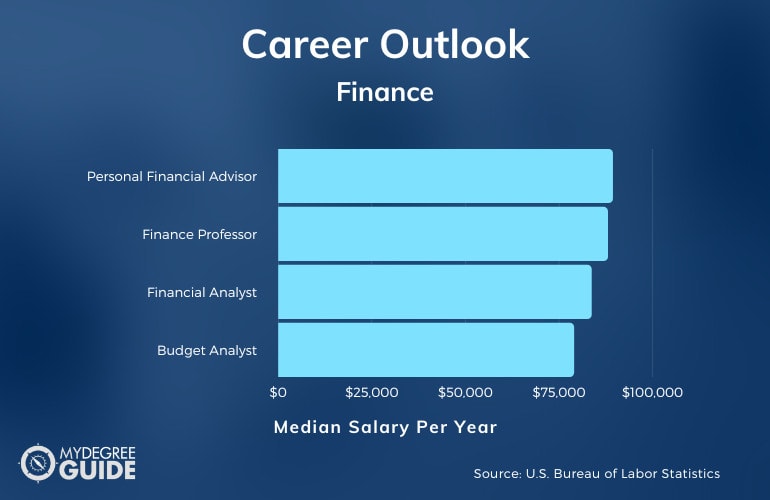
Earning your doctoral degree in finance may open many career paths to you. Once you graduate with this degree, you may work in an academic setting, a nonprofit organization, the corporate world, or the public sector.
Here are a few jobs you may be able to look forward to, along with the U.S. Bureau of Labor Statistics job outlook and average salary information.
Budget Analyst
Budget analysts are responsible for setting an organization’s budget and helping the company stick to it.
- Outlook for job growth: 5% increase
- Median salary per year: $78,970
This may be an enjoyable career path for those who want to understand all facets of a company – tracking and justifying where each penny goes. Budget analysts make recommendations for investment and expenditure to boost their company’s profitability.
Financial Analyst
Financial analysts are responsible for paying attention to the market in order to make recommendations on how people or businesses should invest their resources.
- Outlook for job growth: 6% increase
- Median salary per year: $83,660
Rather than monitoring their business or organization, they monitor the economy as a whole. This career may be ideal for those who find financial markets interesting and have a deep understanding of investments.

Personal Financial Advisor
Consider this career path if you want the satisfaction of knowing that you’re helping others plan for their futures.
- Median salary per year: $89,330
You might also need to have a knack for marketing and sales as you attract and welcome new clients to your firm. In this role, you might work for a successful money management company or start your own practice.
Finance Professor
You may be able to pass your knowledge onto others by teaching students at the university level.
- Outlook for job growth: 7% increase
- Median salary per year: $88,010
Like many careers, you’ll need more than knowledge of the financial sector to be successful in this position. You’ll need organization and communication skills to be able to teach effectively. You’ll also need to be willing to prove your teaching effectiveness to your department via annual reviews.
If you enjoy teaching, researching, and discussing business, you may find yourself quite at home among the faculty of a business college.
Curriculum for Finance PhD Programs

Similar to a MBA in finance or online master’s in finance , when pursuing an advanced degree in finance, you’ll likely take a variety of courses designed to equip you with a thorough understanding of financial matters and how they relate to decision-making for individuals and businesses.
Your classes may include:
- Accounting and Control for Nonprofit Organizations
- Business Ethics
- Business Valuation
- Data Analysis for Investments
- Financial Management for International Business
- Human Resource Development
- Investment Portfolio Analysis
- Managerial Finance
- Mathematical Foundations for Finance
- Mergers & Acquisitions
- Money, Capital Markets & Economic Growth
- Quantitative Research Design & Methodology
- Real Estate Finance
- Real Option Valuation
- Risk Management
- Strategic Thinking for Decision-Making
- Stochastic Foundations of Finance
Since your program will likely encourage you to take a mix of both foundational classes and specialized electives, the coursework listed above includes both core classes and electives. Your PhD in finance requirements may also include a dissertation or capstone project. A growing number of doctorate programs have no dissertation required , but these tend to be professional doctorates, not PhDs.
Choose programs with a capstone project if you’d like to finish your degree faster. Dissertations can often take 2-3 years more to complete after you finish your coursework.
DBA in Finance vs. PhD in Finance

When you have your sights set on a finance degree, there are two different doctoral routes you can take. You could earn a doctorate of business administration (DBA) in finance or pursue a Doctor of Philosophy (PhD) in finance.
Although you can learn a great deal about numbers, money, and economics either way, the two different degrees will likely set you on divergent career tracks.
People often choose a professional doctorate, such as a DBA in Finance, if they want to put their education to work in the field — for example, working on Wall Street or in a Fortune 500 company.
A DBA in Finance:
- Is typically pursued by those who want to stay with their current company or work for another corporation.
- May involve drawing from others’ data and research for the culminating project.
- Is often pursued by those with several years of professional experience.
A PhD in finance is often pursued by people who want to work in an academic setting. You may find that a PhD program focuses more on the theoretical aspects of finance than the practical ones.
A PhD in Finance:
- Is typically pursued by people who want to conduct research, get published or teach.
- Typically requires conducting original research.
- May be good for those straight out of school, such as recent graduates of a master’s in finance or master’s in accounting program.
Think about what you want to do for your career, then choose the degree that best fits those goals.
Online vs. Traditional Finance Degree

When it comes to online versus traditional finance doctoral programs, the main difference is the format through which the material is presented. The content should remain about the same, and the rigors of the program likely will as well.
You may choose a fully online program, an on-campus one, or a hybrid mix.
Accreditation for a Doctorate in Finance Online
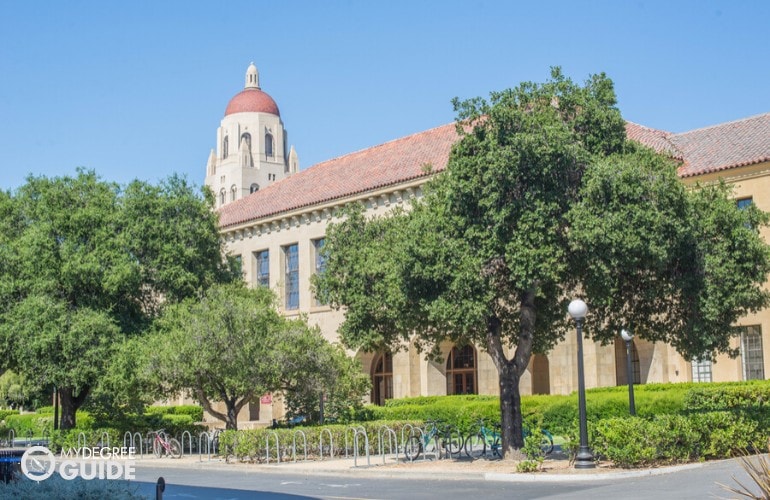
Universities receive accreditation as proof that their programs provide a thorough educational experience for students. Therefore, when you’re looking for a doctor of finance program, the school’s accreditation should be the first thing that you consider.
Reputable universities receive accreditation from a regional accrediting agency . These organizations give a broad stamp of approval to the entire school rather than to its individual programs. It is essential that you enroll in a school with regional accreditation.
In addition, there are several national and international organizations that provide accreditation specifically for business programs. Although this type of accreditation may not be absolutely essential, it’s certainly a valuable sign that the program is thorough, reputable, and excellent in quality.
A finance program may be accredited by:
- Accreditation Council for Business Schools and Programs (ACBSP)
- Association to Advance Collegiate Schools of Business International (AACSB)
- International Assembly for Collegiate Business Education (IACBE)
The top finance PhD programs are accredited both regionally and programmatically by one of these specialty boards. You can find your chosen university’s accreditation by searching the US Department of Education’s accreditation database .
Financial Aid for a Finance Degree
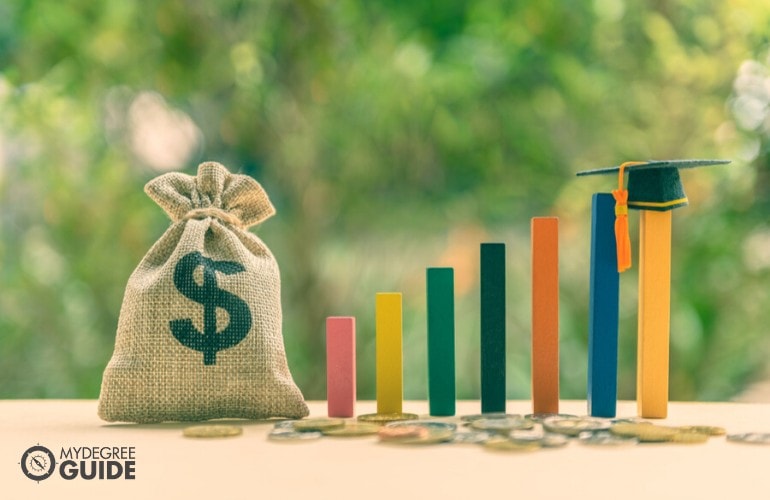
As you begin looking into finance PhD programs, don’t forget to also look into financial aid opportunities. At the doctorate level, you may still be eligible for federal financial aid as well as fellowships and scholarships from universities and scholarships from private organizations.
Your employer might even have tuition assistance programs available.
Can I Get My PhD Online?

Yes, many universities offer online PhD and professional doctorate programs. This includes doctoral degrees in finance, public health, education, nursing, and organizational leadership.
This approach can help you earn your advanced degree in a format that fits your schedule.
Is an Online PhD Respected and Credible?
In an online program, you should have to work just as hard as you do in an on-campus program. Additionally, your official records are unlikely to specify how you earned your degree.
The important thing is not the format in which you completed your coursework but whether you attended an accredited university.
Are There Any Online PhD In Finance Programs?

Earning a doctoral degree in finance doesn’t have to require moving onto campus or uprooting your whole life. Rather, there are programs for a DBA or PhD in finance online.
In these programs, you can engage in a computer-based educational experience as you work toward your degree.
Getting Your PhD in Finance Online

To take your finance education to the highest level, you may want to pursue a doctoral degree in this field, whether a PhD or a DBA.
Completing your coursework online can help you receive a solid education in a format that fits your lifestyle and prepare you for the next step on your career path.
Use the above list of schools to narrow down the finance PhD programs for you.
Related Guides:
- Best Online Masters in Finance No GMAT
- Finance vs. Accounting – What’s the Difference?

Doctoral Program
The Ph.D. program is a full time program leading to a Doctoral Degree in Economics. Students specialize in various fields within Economics by enrolling in field courses and attending field specific lunches and seminars. Students gain economic breadth by taking additional distribution courses outside of their selected fields of interest.
General requirements
Students are required to complete 1 quarter of teaching experience. Teaching experience includes teaching assistantships within the Economics department or another department .
University's residency requirement
135 units of full-tuition residency are required for PhD students. After that, a student should have completed all course work and must request Terminal Graduate Registration (TGR) status.
Department degree requirements and student checklist
1. core course requirement.
Required: Core Microeconomics (202-203-204) Core Macroeconomics (210-211-212) Econometrics (270-271-272). The Business School graduate microeconomics class series may be substituted for the Econ Micro Core. Students wishing to waive out of any of the first year core, based on previous coverage of at least 90% of the material, must submit a waiver request to the DGS at least two weeks prior to the start of the quarter. A separate waiver request must be submitted for each course you are requesting to waive. The waiver request must include a transcript and a syllabus from the prior course(s) taken.
2. Field Requirements
Required: Two of the Following Fields Chosen as Major Fields (click on link for specific field requirements). Field sequences must be passed with an overall grade average of B or better. Individual courses require a letter grade of B- or better to pass unless otherwise noted.
Research fields and field requirements :
- Behavioral & Experimental
- Development Economics
- Econometric Methods with Causal Inference
- Econometrics
- Economic History
- Environmental, Resource and Energy Economics
- Industrial Organization
- International Trade & Finance
- Labor Economics
- Market Design
- Microeconomic Theory
- Macroeconomics
- Political Economy
- Public Economics
3. Distribution
Required: Four other graduate-level courses must be completed. One of these must be from the area of economic history (unless that field has already been selected above). These courses must be distributed in such a way that at least two fields not selected above are represented. Distribution courses must be passed with a grade of B or better.
4. Field Seminars/Workshops
Required: Three quarters of two different field seminars or six quarters of the same field seminar from the list below.
- Harvard Business School →
- Doctoral Programs →
PhD Programs
- Accounting & Management
- Business Economics
- Health Policy (Management)
- Organizational Behavior
- Technology & Operations Management
Students in our PhD programs are encouraged from day one to think of this experience as their first job in business academia—a training ground for a challenging and rewarding career generating rigorous, relevant research that influences practice.
Our doctoral students work with faculty and access resources throughout HBS and Harvard University. The PhD program curriculum requires coursework at HBS and other Harvard discipline departments, and with HBS and Harvard faculty on advisory committees. Faculty throughout Harvard guide the programs through their participation on advisory committees.
How do I know which program is right for me?
There are many paths, but we are one HBS. Our PhD students draw on diverse personal and professional backgrounds to pursue an ever-expanding range of research topics. Explore more here about each program’s requirements & curriculum, read student profiles for each discipline as well as student research , and placement information.
The PhD in Business Administration grounds students in the disciplinary theories and research methods that form the foundation of an academic career. Jointly administered by HBS and GSAS, the program has five areas of study: Accounting and Management , Management , Marketing , Strategy , and Technology and Operations Management . All areas of study involve roughly two years of coursework culminating in a field exam. The remaining years of the program are spent conducting independent research, working on co-authored publications, and writing the dissertation. Students join these programs from a wide range of backgrounds, from consulting to engineering. Many applicants possess liberal arts degrees, as there is not a requirement to possess a business degree before joining the program
The PhD in Business Economics provides students the opportunity to study in both Harvard’s world-class Economics Department and Harvard Business School. Throughout the program, coursework includes exploration of microeconomic theory, macroeconomic theory, probability and statistics, and econometrics. While some students join the Business Economics program directly from undergraduate or masters programs, others have worked in economic consulting firms or as research assistants at universities or intergovernmental organizations.
The PhD program in Health Policy (Management) is rooted in data-driven research on the managerial, operational, and strategic issues facing a wide range of organizations. Coursework includes the study of microeconomic theory, management, research methods, and statistics. The backgrounds of students in this program are quite varied, with some coming from public health or the healthcare industry, while others arrive at the program with a background in disciplinary research
The PhD program in Organizational Behavior offers two tracks: either a micro or macro approach. In the micro track, students focus on the study of interpersonal relationships within organizations and the effects that groups have on individuals. Students in the macro track use sociological methods to examine organizations, groups, and markets as a whole, including topics such as the influence of individuals on organizational change, or the relationship between social missions and financial objectives. Jointly administered by HBS and GSAS, the program includes core disciplinary training in sociology or psychology, as well as additional coursework in organizational behavior.
Accounting & Management
Business economics , health policy (management) , management , marketing , organizational behavior , strategy , technology & operations management .
About Stanford GSB
- The Leadership
- Dean’s Updates
- School News & History
- Commencement
- Business, Government & Society
- Centers & Institutes
- Center for Entrepreneurial Studies
- Center for Social Innovation
- Stanford Seed
About the Experience
- Learning at Stanford GSB
- Experiential Learning
- Guest Speakers
- Entrepreneurship
- Social Innovation
- Communication
- Life at Stanford GSB
- Collaborative Environment
- Activities & Organizations
- Student Services
- Housing Options
- International Students
Full-Time Degree Programs
- Why Stanford MBA
- Academic Experience
- Financial Aid
- Why Stanford MSx
- Research Fellows Program
- See All Programs
Non-Degree & Certificate Programs
- Executive Education
- Stanford Executive Program
- Programs for Organizations
- The Difference
- Online Programs
- Stanford LEAD
- Seed Transformation Program
- Aspire Program
- Seed Spark Program
- Faculty Profiles
- Academic Areas
- Awards & Honors
- Conferences
Faculty Research
- Publications
- Working Papers
- Case Studies
Research Hub
- Research Labs & Initiatives
- Business Library
- Data, Analytics & Research Computing
- Behavioral Lab
Research Labs
- Cities, Housing & Society Lab
- Golub Capital Social Impact Lab
Research Initiatives
- Corporate Governance Research Initiative
- Corporations and Society Initiative
- Policy and Innovation Initiative
- Rapid Decarbonization Initiative
- Stanford Latino Entrepreneurship Initiative
- Value Chain Innovation Initiative
- Venture Capital Initiative
- Career & Success
- Climate & Sustainability
- Corporate Governance
- Culture & Society
- Finance & Investing
- Government & Politics
- Leadership & Management
- Markets & Trade
- Operations & Logistics
- Opportunity & Access
- Organizational Behavior
- Political Economy
- Social Impact
- Technology & AI
- Opinion & Analysis
- Email Newsletter
Welcome, Alumni
- Communities
- Digital Communities & Tools
- Regional Chapters
- Women’s Programs
- Identity Chapters
- Find Your Reunion
- Career Resources
- Job Search Resources
- Career & Life Transitions
- Programs & Services
- Career Video Library
- Alumni Education
- Research Resources
- Volunteering
- Alumni News
- Class Notes
- Alumni Voices
- Contact Alumni Relations
- Upcoming Events
Admission Events & Information Sessions
- MBA Program
- MSx Program
- PhD Program
- Alumni Events
- All Other Events
- Requirements
- Requirements: Behavioral
- Requirements: Quantitative
- Requirements: Macro
- Requirements: Micro
- Annual Evaluations
- Field Examination
- Research Activities
- Research Papers
- Dissertation
- Oral Examination
- Current Students
- Entering Class Profile
- Education & CV
- GMAT & GRE
- International Applicants
- Statement of Purpose
- Letters of Recommendation
- Reapplicants
- Application Fee Waiver
- Deadline & Decisions
- Job Market Candidates
- Academic Placements
- Stay in Touch
- Fields of Study
- Student Life
Economic Analysis & Policy
Our doctoral program in the field of economic analysis and policy prepares students for research careers in economics. The program offers rigorous training and has several distinct advantages:
Low Student-to-Faculty Ratio
First, enrollment in the program is small. This encourages close faculty-student contact and allows students to become involved in research very early. Students work first as assistants on faculty research projects and, as their interests and skills develop, on their own research. Students often begin their publishing careers before completing their degrees.
Flexible and Innovative Program
Second, the program is flexible and innovative; students can draw on both the school’s and the university’s distinguished faculty. In addition to the faculty in the economics group at Stanford GSB and in the university’s economics department, students have access to faculty in political and behavioral sciences; accounting and finance; mathematics, statistics, and computer science; and many other disciplines.
A Top-Ranked School
Third, the program is part of a top-ranked professional school. This setting allows students to gain a deeper understanding of the actual processes of business decision-making and public policy formulation.
Preparation and Qualifications
Students who enroll in this program have a substantial background in economics and mathematics. They are expected to have, minimally, mathematical skills at the level of one year of advanced calculus and one course each in linear algebra, analysis, probability, optimization, and statistics.
The faculty selects students based on predicted performance in the program. Evidence of substantial background or ability in the use of mathematical reasoning and statistical methods is important. Most successful applicants had quantitative undergraduate majors in economics, mathematics, or related sciences.
In addition to evidence of ability and letters of recommendation, the faculty considers carefully the applicant’s statement of purpose for pursuing the PhD degree. The successful applicant usually has clearly defined career goals that are compatible with those of the program.
Acceptance into the program is extremely competitive. Admitted applicants compare very favorably with students enrolled in the top economics departments of major universities.
Economic Analysis & Policy Faculty
Mohammad akbarpour, claudia allende santa cruz, susan athey, lanier benkard, jeremy i. bulow, modibo khane camara, sebastian di tella, rebecca diamond, yossi feinberg, guido w. imbens, charles i. jones, michael ostrovsky, garth saloner, yuliy sannikov, kathryn shaw, andrzej skrzypacz, paulo somaini, juan carlos suárez serrato, takuo sugaya, christopher tonetti, shoshana vasserman, ali yurukoglu, weijie zhong, emeriti faculty, alain c. enthoven, robert j. flanagan, david m. kreps, peter c. reiss, john roberts, a. michael spence, robert wilson, recent publications in economic analysis & policy, battling the coronavirus ‘infodemic’ among social media users in kenya and nigeria, using wasserstein generative adversarial networks for the design of monte carlo simulations, adaptive novelty detection with false discovery rate guarantee, recent insights by stanford business, nine stories to get you through tax season, a.i. can help “personalize” policies to reach the right people, stanford gsb faculty share their holiday reading lists, placement director.
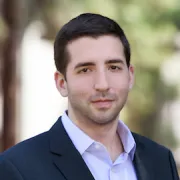
- Priorities for the GSB's Future
- See the Current DEI Report
- Supporting Data
- Research & Insights
- Share Your Thoughts
- Search Fund Primer
- Teaching & Curriculum
- Affiliated Faculty
- Faculty Advisors
- Louis W. Foster Resource Center
- Defining Social Innovation
- Impact Compass
- Global Health Innovation Insights
- Faculty Affiliates
- Student Awards & Certificates
- Changemakers
- Dean Jonathan Levin
- Dean Garth Saloner
- Dean Robert Joss
- Dean Michael Spence
- Dean Robert Jaedicke
- Dean Rene McPherson
- Dean Arjay Miller
- Dean Ernest Arbuckle
- Dean Jacob Hugh Jackson
- Dean Willard Hotchkiss
- Faculty in Memoriam
- Stanford GSB Firsts
- Certificate & Award Recipients
- Teaching Approach
- Analysis and Measurement of Impact
- The Corporate Entrepreneur: Startup in a Grown-Up Enterprise
- Data-Driven Impact
- Designing Experiments for Impact
- Digital Business Transformation
- The Founder’s Right Hand
- Marketing for Measurable Change
- Product Management
- Public Policy Lab: Financial Challenges Facing US Cities
- Public Policy Lab: Homelessness in California
- Lab Features
- Curricular Integration
- View From The Top
- Formation of New Ventures
- Managing Growing Enterprises
- Startup Garage
- Explore Beyond the Classroom
- Stanford Venture Studio
- Summer Program
- Workshops & Events
- The Five Lenses of Entrepreneurship
- Leadership Labs
- Executive Challenge
- Arbuckle Leadership Fellows Program
- Selection Process
- Training Schedule
- Time Commitment
- Learning Expectations
- Post-Training Opportunities
- Who Should Apply
- Introductory T-Groups
- Leadership for Society Program
- Certificate
- 2023 Awardees
- 2022 Awardees
- 2021 Awardees
- 2020 Awardees
- 2019 Awardees
- 2018 Awardees
- Social Management Immersion Fund
- Stanford Impact Founder Fellowships and Prizes
- Stanford Impact Leader Prizes
- Social Entrepreneurship
- Stanford GSB Impact Fund
- Economic Development
- Energy & Environment
- Stanford GSB Residences
- Environmental Leadership
- Stanford GSB Artwork
- A Closer Look
- California & the Bay Area
- Voices of Stanford GSB
- Business & Beneficial Technology
- Business & Sustainability
- Business & Free Markets
- Business, Government, and Society Forum
- Get Involved
- Second Year
- Global Experiences
- JD/MBA Joint Degree
- MA Education/MBA Joint Degree
- MD/MBA Dual Degree
- MPP/MBA Joint Degree
- MS Computer Science/MBA Joint Degree
- MS Electrical Engineering/MBA Joint Degree
- MS Environment and Resources (E-IPER)/MBA Joint Degree
- Academic Calendar
- Clubs & Activities
- LGBTQ+ Students
- Military Veterans
- Minorities & People of Color
- Partners & Families
- Students with Disabilities
- Student Support
- Residential Life
- Student Voices
- MBA Alumni Voices
- A Week in the Life
- Career Support
- Employment Outcomes
- Cost of Attendance
- Knight-Hennessy Scholars Program
- Yellow Ribbon Program
- BOLD Fellows Fund
- Application Process
- Loan Forgiveness
- Contact the Financial Aid Office
- Evaluation Criteria
- English Language Proficiency
- Personal Information, Activities & Awards
- Professional Experience
- Optional Short Answer Questions
- Application Fee
- Reapplication
- Deferred Enrollment
- Joint & Dual Degrees
- Event Schedule
- Ambassadors
- New & Noteworthy
- Ask a Question
- See Why Stanford MSx
- Is MSx Right for You?
- MSx Stories
- Leadership Development
- Career Advancement
- Career Change
- How You Will Learn
- Admission Events
- Personal Information
- Information for Recommenders
- GMAT, GRE & EA
- English Proficiency Tests
- After You’re Admitted
- Daycare, Schools & Camps
- U.S. Citizens and Permanent Residents
- Faculty Mentors
- Current Fellows
- Standard Track
- Fellowship & Benefits
- Group Enrollment
- Program Formats
- Developing a Program
- Diversity & Inclusion
- Strategic Transformation
- Program Experience
- Contact Client Services
- Campus Experience
- Live Online Experience
- Silicon Valley & Bay Area
- Digital Credentials
- Faculty Spotlights
- Participant Spotlights
- Eligibility
- International Participants
- Stanford Ignite
- Frequently Asked Questions
- Operations, Information & Technology
- Classical Liberalism
- The Eddie Lunch
- Accounting Summer Camp
- Videos, Code & Data
- California Econometrics Conference
- California Quantitative Marketing PhD Conference
- California School Conference
- China India Insights Conference
- Homo economicus, Evolving
- Political Economics (2023–24)
- Scaling Geologic Storage of CO2 (2023–24)
- A Resilient Pacific: Building Connections, Envisioning Solutions
- Adaptation and Innovation
- Changing Climate
- Civil Society
- Climate Impact Summit
- Climate Science
- Corporate Carbon Disclosures
- Earth’s Seafloor
- Environmental Justice
- Operations and Information Technology
- Organizations
- Sustainability Reporting and Control
- Taking the Pulse of the Planet
- Urban Infrastructure
- Watershed Restoration
- Junior Faculty Workshop on Financial Regulation and Banking
- Ken Singleton Celebration
- Marketing Camp
- Quantitative Marketing PhD Alumni Conference
- Presentations
- Theory and Inference in Accounting Research
- Stanford Closer Look Series
- Quick Guides
- Core Concepts
- Journal Articles
- Glossary of Terms
- Faculty & Staff
- Researchers & Students
- Research Approach
- Charitable Giving
- Financial Health
- Government Services
- Workers & Careers
- Short Course
- Adaptive & Iterative Experimentation
- Incentive Design
- Social Sciences & Behavioral Nudges
- Bandit Experiment Application
- Conferences & Events
- Reading Materials
- Energy Entrepreneurship
- Faculty & Affiliates
- SOLE Report
- Responsible Supply Chains
- Current Study Usage
- Pre-Registration Information
- Participate in a Study
- Founding Donors
- Location Information
- Participant Profile
- Network Membership
- Program Impact
- Collaborators
- Entrepreneur Profiles
- Company Spotlights
- Seed Transformation Network
- Responsibilities
- Current Coaches
- How to Apply
- Meet the Consultants
- Meet the Interns
- Intern Profiles
- Collaborate
- Research Library
- News & Insights
- Program Contacts
- Databases & Datasets
- Research Guides
- Consultations
- Research Workshops
- Career Research
- Research Data Services
- Course Reserves
- Course Research Guides
- Material Loan Periods
- Fines & Other Charges
- Document Delivery
- Interlibrary Loan
- Equipment Checkout
- Print & Scan
- MBA & MSx Students
- PhD Students
- Other Stanford Students
- Faculty Assistants
- Research Assistants
- Stanford GSB Alumni
- Telling Our Story
- Staff Directory
- Site Registration
- Alumni Directory
- Alumni Email
- Privacy Settings & My Profile
- Success Stories
- The Story of Circles
- Support Women’s Circles
- Stanford Women on Boards Initiative
- Alumnae Spotlights
- Insights & Research
- Industry & Professional
- Entrepreneurial Commitment Group
- Recent Alumni
- Half-Century Club
- Fall Reunions
- Spring Reunions
- MBA 25th Reunion
- Half-Century Club Reunion
- Faculty Lectures
- Ernest C. Arbuckle Award
- Alison Elliott Exceptional Achievement Award
- ENCORE Award
- Excellence in Leadership Award
- John W. Gardner Volunteer Leadership Award
- Robert K. Jaedicke Faculty Award
- Jack McDonald Military Service Appreciation Award
- Jerry I. Porras Latino Leadership Award
- Tapestry Award
- Student & Alumni Events
- Executive Recruiters
- Interviewing
- Land the Perfect Job with LinkedIn
- Negotiating
- Elevator Pitch
- Email Best Practices
- Resumes & Cover Letters
- Self-Assessment
- Whitney Birdwell Ball
- Margaret Brooks
- Bryn Panee Burkhart
- Margaret Chan
- Ricki Frankel
- Peter Gandolfo
- Cindy W. Greig
- Natalie Guillen
- Carly Janson
- Sloan Klein
- Sherri Appel Lassila
- Stuart Meyer
- Tanisha Parrish
- Virginia Roberson
- Philippe Taieb
- Michael Takagawa
- Terra Winston
- Johanna Wise
- Debbie Wolter
- Rebecca Zucker
- Complimentary Coaching
- Changing Careers
- Work-Life Integration
- Career Breaks
- Flexible Work
- Encore Careers
- Join a Board
- D&B Hoovers
- Data Axle (ReferenceUSA)
- EBSCO Business Source
- Global Newsstream
- Market Share Reporter
- ProQuest One Business
- Student Clubs
- Entrepreneurial Students
- Stanford GSB Trust
- Alumni Community
- How to Volunteer
- Springboard Sessions
- Consulting Projects
- 2020 – 2029
- 2010 – 2019
- 2000 – 2009
- 1990 – 1999
- 1980 – 1989
- 1970 – 1979
- 1960 – 1969
- 1950 – 1959
- 1940 – 1949
- Service Areas
- ACT History
- ACT Awards Celebration
- ACT Governance Structure
- Building Leadership for ACT
- Individual Leadership Positions
- Leadership Role Overview
- Purpose of the ACT Management Board
- Contact ACT
- Business & Nonprofit Communities
- Reunion Volunteers
- Ways to Give
- Fiscal Year Report
- Business School Fund Leadership Council
- Planned Giving Options
- Planned Giving Benefits
- Planned Gifts and Reunions
- Legacy Partners
- Giving News & Stories
- Giving Deadlines
- Development Staff
- Submit Class Notes
- Class Secretaries
- Board of Directors
- Health Care
- Sustainability
- Class Takeaways
- All Else Equal: Making Better Decisions
- If/Then: Business, Leadership, Society
- Grit & Growth
- Think Fast, Talk Smart
- Spring 2022
- Spring 2021
- Autumn 2020
- Summer 2020
- Winter 2020
- In the Media
- For Journalists
- DCI Fellows
- Other Auditors
- Academic Calendar & Deadlines
- Course Materials
- Entrepreneurial Resources
- Campus Drive Grove
- Campus Drive Lawn
- CEMEX Auditorium
- King Community Court
- Seawell Family Boardroom
- Stanford GSB Bowl
- Stanford Investors Common
- Town Square
- Vidalakis Courtyard
- Vidalakis Dining Hall
- Catering Services
- Policies & Guidelines
- Reservations
- Contact Faculty Recruiting
- Lecturer Positions
- Postdoctoral Positions
- Accommodations
- CMC-Managed Interviews
- Recruiter-Managed Interviews
- Virtual Interviews
- Campus & Virtual
- Search for Candidates
- Think Globally
- Recruiting Calendar
- Recruiting Policies
- Full-Time Employment
- Summer Employment
- Entrepreneurial Summer Program
- Global Management Immersion Experience
- Social-Purpose Summer Internships
- Process Overview
- Project Types
- Client Eligibility Criteria
- Client Screening
- ACT Leadership
- Social Innovation & Nonprofit Management Resources
- Develop Your Organization’s Talent
- Centers & Initiatives
- Student Fellowships

PhD | Finance

The Ph.D. in Finance
Stern’s Ph.D. program in finance trains scholars to conduct research at the leading edge of financial economics. The faculty represents one of the largest finance research groups in the world that has been ranked consistently as the leading publisher of academic research in top finance journals. Comprised of more than 40 researchers, including a Nobel-prize-winning economist, our faculty are active in all areas of finance—asset pricing, corporate finance, derivatives, market microstructure, and behavioral finance—with both theoretical and empirical focus, and with emerging specialization in the areas of financial intermediation, crises, and macro-finance. As a result of this unusual breadth, students have access to expertise in almost any topic that they might wish to explore.
Explore Finance
Discover our other fields of study.
- Utility Menu
44d3fa3df9f06a3117ed3d2ad6c71ecc
- Administration
- PhD Program
The Ph.D. Program in the Department of Economics at Harvard is addressed to students of high promise who wish to prepare themselves in teaching and research in academia or for responsible positions in government, research organizations, or business enterprises. Students are expected to devote themselves full-time to their programs of study.
The program prepares students for productive and stimulating careers as economists. Courses and seminars offered by the department foster an intellectually active and stimulating environment. Each week, the department sponsors more than 15 different seminars on such topics as environmental economics, economic growth and development, monetary and fiscal policy, international economics, industrial organization, law and economics, behavioral economics, labor economics, and economic history. Top scholars from both domestic and international communities are often invited speakers at the seminars. The Harvard community outside of the department functions as a strong and diverse resource. Students in the department are free to pursue research interests with scholars throughout the University. Faculty of the Harvard Law School, Kennedy School of Government, and Harvard Business School, for example, are available to students for consultation, instruction, and research guidance. As a member of the Harvard community, students in the department can register for courses in the various schools and have access to the enormous library resources available through the University. There are over 90 separate library units at Harvard, with the total collections of books and pamphlets numbering over 13 million. Both the department and the wider University draw some of the brightest students from around the world, which makes for a student body that is culturally diverse and likely unequaled in the range of intellectual interests of its members. These factors combine to add an important dimension to the educational process. Students are able to learn from one another, collaborate on research projects and publications, and form bonds that are not broken by distance once the degree is completed and professional responsibilities lead them in different directions.
- Program Requirements
- Job Placement
- Financial Support
PhD in Economics
You are here: american university college of arts & sciences economics phd in economics.
- Request Info
Are you interested in…
Explore more.
Are you interested in...
202-885-3770
Fax: 202-885-3790
Kreeger , Room 104 on a map
Back to top
PhD in Economics At a Glance
- 45 credit hours of course work, completed in as little as 2.5 years.
- Study diverse theoretical perspectives, including post-Keynesian, intuitionalist, evolutionary, and feminist economics.
- Tailor your field coursework to best match your research interests.
- Designated as a STEM degree program
- Program Director: Professor Nathan Larson .
Tailor Your Degree to Your Research Interests
Offering a combination of rigorous technical training and a focus on policy-relevant research, our PhD in Economics will prepare you for careers in academics, research, and government. Our students master economic theory, statistical methods, and applied field knowledge. Then, through the dissertation-writing process, they develop the ability to formulate and empirically answer economic questions.
- Diverse Perspectives : In addition to a strong foundation in macro and micro theory and econometrics, students learn a more diverse perspective on economics through required courses in economic thought and economic history, as well as optional courses in heterodox theoretical models of economics, including post-Keynesian, intuitionalist, evolutionary, and feminist economics.
- Flexibility : Students choose four applied field courses that best fit their research interests. The department offers a wide selection of concentrations, including courses in development, gender, international, labor, macro/monetary, and other applied micro topics.
- Preparation : Students must successfully pass one comprehensive exam at the end of their first year and produce a journal-quality research paper by the end of their third year. The third-year paper typically serves as a key component of the dissertation, giving students an advanced start on the dissertation writing process.
See complete Admissions and Program Requirements .
Faculty Dedicated to Your Success
At AU, you will take classes from and work with a diverse group of esteemed economists and highly cited scholars who are engaged with practitioners and policymakers around the world. Their wide-ranging research and publications , along with the variety of methodological approaches they use, create a rich environment for innovations in theory and empirical studies.
Our research centers, including the Program on Gender Analysis in Economics and Infometrics Institute , host guest scholars and research projects, further enhancing the opportunities for graduate students. By working as research assistants and teaching assistants, PhD students gain valuable experience and mentorship in an academic setting.
Throughout their third year and into the fourth, students work closely with a faculty member of their choosing on their third-year paper and dissertation proposal, eventually adding other experts to their dissertation committee to gain additional insights and expertise. Through this process, students develop lasting collegial, and productive relationships with faculty, classmates and economists at DC-area institutions, often co-authoring and publishing.
Launch Your Career Amongst Top Economists
The Washington metropolitan area employs over one-third of all economists in the country. The array of intellectual and professional opportunities offered by the nation's capital make American University the ideal place to study economics. The department's strategic partnerships and our faculty's relationships with nearby institutions will help you make the best use of those opportunities.
Internship and employment opportunities:
- The World Bank
- International Monetary Fund
- Research institutes
- Think Tanks and NGOs
- US Treasury, Labor, and Commerce Departments
Economics PhD graduates are well qualified for careers in academia, government agencies, and international organizations. Our students receive career mentorship and placement services that lead to careers in public policy, academia, and government, both domestically and abroad.
Many of our graduates go on to academic posts at universities such as the Saint Louis University, the University of Vermont, University of Wisconsin-La Crosse, and Franklin College. Domestically, graduates have served in congress and government agencies, including the Bureau of Economic Analysis, the Department of Commerce, and the Department of Labor. Our alumni working outside of the US have founded research institutions and consulted for major organizations such as CGIAR-CIP and the United Nations.
Read more career information about AU economics alumni.
See the 2017-8 list of job market candidates .
News & Notes
See abstracts from the 2024 Third Year Paper Conference .
Research Seminar Series Wednesdays at noon.
- PhD candidate Amy Burnett Cross received an EHA Dissertation Fellowship from the EHA Committee on Research in Economic History
- PhD student Danielle Wilson was awarded an Economic History Association grant for archival research on Mexican Railroads.
- PhD student Aina Puig's short essay, " The Unequal Effect of Interest Rates by Race, Gender, " was published in the San Francisco Fed's Economic Letter.
- Professor Bernhard Gunter and PhD students Bong Sun Seo & Farah Tasneem were awarded the International Award for Excellence for their article on the change in labor force participation rates during periods of globalization and marginalization.
Student Spotlights
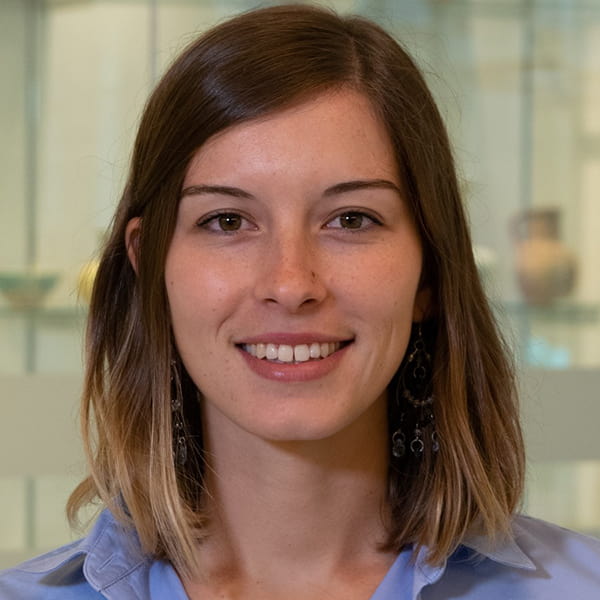
More about Aina
San Francisco Federal Reserve Board’s essay contest called for papers studying economic impacts of gender and racial inequalities. As a winner, Aina’s paper will be published in the Federal Reserve Board’s Economic Letter and will have the opportunity to participate in a 6-week summer research program.
Aina’s paper focused on the impact of monetary policy, through interest rates, on spending patterns among types of U.S. households—those with mortgages, those with women versus men as head of household, and those headed by White versus Black people. By building on her interest in macroeconomic inequality topics with direct policy implications, she intended (and continues to intend) to fill a gap in the literature, adding to the income inequality narrative by bringing gender and racial inequalities to the forefront of discussion.
Through this project, she was able to not only establish the impact of monetary policy shocks on consumption patterns, but also inform the Federal Reserve Board of these distributional impacts. When discussing her research, Aina states that “promoting equal opportunity and understanding the different impacts of policies can help policymakers create policies that promote economic growth while benefitting all groups’ well-being in society.”
Her interest in analyzing inequality topics through lens of distributional effects of macroeconomic policies came to life during her research for this paper and “ties directly into [her] plans for [her] dissertation…, a good starting point for [her] future research.”
Vasudeva Ramaswamy

More about Vasudeva
Economics PhD candidate Vasudeva Ramaswamy credits American University with helping him zero in on his area of research interest and for equipping him with the tools to explore and contribute to his field.
During his time at AU, Vasu spent two summers working with the World Bank, studying the impact of agricultural aggregators in East Africa — specifically, how they provided income and security to farmer communities.
Vasu’s dissertation considers the effects of the Federal Reserve Bank’s actions on household inequality. Who gains and who loses when the Fed increases (or decreases) interest rates? And how do these effects propagate through the economy? Because business income and profits play a key role in household inequality, Vasu looks at how businesses respond to the actions of the Fed.
After he earns his PhD, Vasu says he would love to be able to continue researching the importance of economic heterogeneity in monetary policy transmission. “I am particularly grateful for AU’s faculty, who are leading experts in their field and approachable and encouraging as mentors,” he adds. “I am equally grateful for the rest of my PhD cohort, who are a brilliant and motivated group. I am learning from them continually.”
Elissa Cohen
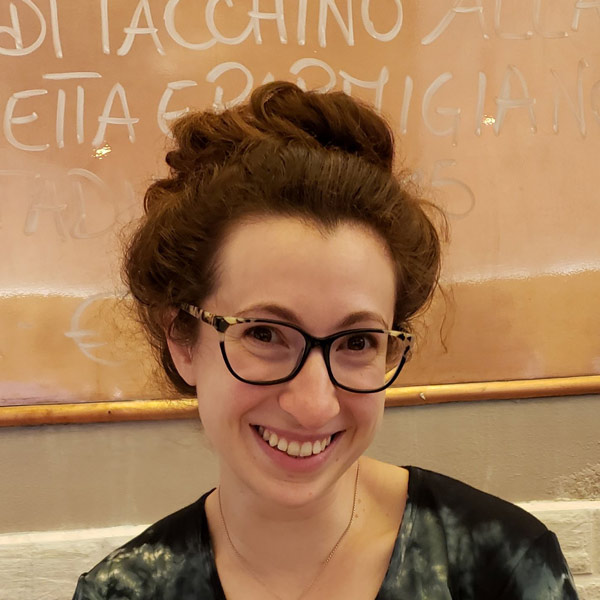
More about Elissa
Economics PhD candidate Elissa Cohen received an NSF grant to pursue her research about assumptions people make about risk and, building off an idea from a previous project, Elissa continues her interest in the Value of Statistical Life in this one to question the validity of how VSL is used and estimated. In doing so, she contributes to development of a more complete theory of how perceptions of risk guide decision making.
Elissa asks three questions: (1) Is the construct validity of the VSL consistent across measurement approaches? (2) Do people value the mitigation of varying types of fatality risk differently across domains? (3) Do people accurately comprehend the probability of death in a given setting?
To answer these questions, Elissa uses discrete choice experimental (DCE) designs, self-report surveys, and machine learning techniques to evaluate the validity of the VSL as an assessment how people’s risk assessment shapes behavior.
This research improves the understanding of how people perceive fatality risk across domains and how perceptions impact choices about risk exposure. With this research comes the potential to reshape how regulatory agencies construct their aggregated VSL estimates for future cost-benefit analyses, influencing policy decisions and allocation of scarce federal resources.
As she thinks about impact and the research space she can contribute to and develop, Elissa comments, “AU has definitely helped me refine the types of questions I am interested in answering…. I see myself continuing to explore and test feedback loops between emergent human behaviors and macro-level policy decision-making.”
Amy Burnett Cross
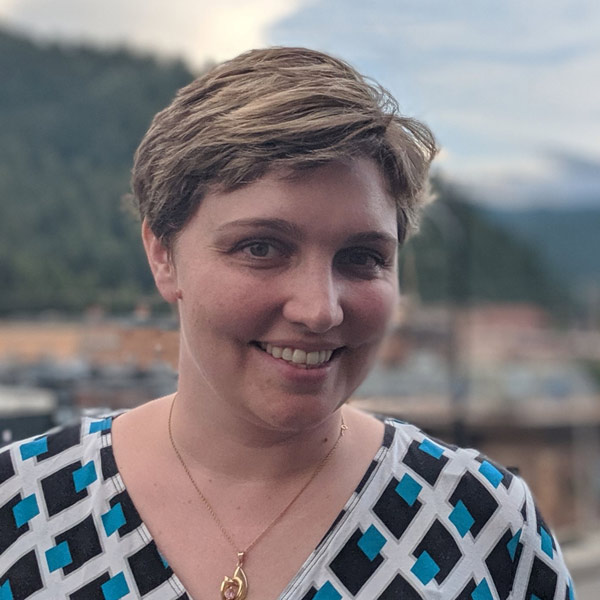
More about Amy
Amy Burnett Cross has been selected as one of the three NBER Pre-Doctoral Fellows in the Gender in the Economy program to support her dissertation research on the influence of military policy on the sorting of women into occupations. Through this research, she is able to include her knowledge from AU’s Program on Gender Analysis in Economics as well as her understanding that by bringing more insight from conservative institutions into her research realm, she could enhance the policy space of gender equity.
As she continues her career, Amy desires to conduct research that is directly applicable to policymakers, and through her research on this project, Amy has the chance to do this in addition to engaging with economic history and begin to invest more time in the historical arc of military policy and gender dynamics.
She has three focuses for her dissertation project: (1) evaluate the impact of lifting the ban on women in combat (in 2013) on civilian occupational desegregation; (2) measure the extent to which gender desegregation of the Army (in 1977) signaled a shift in the appropriate role of civilian women at work; and (3) assess whether the structure of the U.S. draft in WWI (in 1917) contributed to the development of the male breadwinner norm.
Amy’s work aims to provide evidence that policy changes can influence social norms constraining women’s work and occupational segregation, particularly in discovering how policies regarding women’s participation in the military go on to influence gender gaps in civilian labor market outcomes. In doing so, Amy also seeks to contribute to the research of information asymmetry as a cause for occupational segregation—does military gender desegregation function as a reduction of information asymmetry?
With the support and accommodation of her peers, professors, and advisor, Mary E. Hansen, Amy has been able to focus on her academic excellence and develop close friendships and bonds during her journey at AU. In discussing her work in gender economics and the community at American University, Amy offered, “AU attracts women economists and I have found some truly excellent ones here.”
Please send me information about PhD in Economics
It looks like you already used that name and address to request information for one or more AU graduate program(s).
If you have not previously requested AU graduate program information, create a new request
This website uses cookies to ensure the best user experience. Privacy & Cookies Notice Accept Cookies
Manage My Cookies
Manage Cookie Preferences
Confirm My Selections
- Dissertation Areas and Joint PhD Programs
- PhD Career Outcomes
- PhD Proposals and Defenses
- PhD Job Market Candidates
- PhD Research Community
- 100 Years of Pioneering Research
- Rising Scholars Conference
- Yiran Fan Memorial Conference
- Frequently Asked Questions
- PhD in Accounting
- PhD in Behavioral Science
- PhD in Econometrics and Statistics
- PhD in Microeconomics
- PhD in Finance
- PhD in Management Science and Operations Management
- PhD in Marketing
- Joint Program in Financial Economics
- Joint Program in Psychology and Business
- Joint PhD/JD Program
PhD Joint Program in Financial Economics
The financial economics phd program leverages the strengths of two renowned programs: the phd program in finance and the university of chicago’s kenneth c. griffin department of economics..
Core economics training is critical for students doing research in financial economics, and advances in financial economics have important implications for other areas of economics.
As a student in our Joint Program in Financial Economics , you’ll work with thought leaders in both economics and finance and follow your research interests wherever they lead. Leveraging courses and resources in the Finance dissertation area at Chicago Booth and the university’s Kenneth C. Griffin Department of Economics , you’ll build a foundation for research at the intersection of finance and economics.
Our Distinguished Finance and Economics Faculty
As a student in the joint program, you’ll work with professors and classmates in both the Department of Economics and the Stevens Doctoral Program in Finance at Chicago Booth. Faculty bring research expertise in a wide range of fields and serve as mentors to PhD students.
Finance Faculty

Francesca Bastianello
Assistant Professor of Finance and Liew Family Junior Faculty Fellow, Fama Faculty Fellow

Emanuele Colonnelli
Associate Professor of Finance and MV Advisors Faculty Fellow

George M. Constantinides
Leo Melamed Professor of Finance

Douglas W. Diamond
Merton H. Miller Distinguished Service Professor of Finance

Eugene F. Fama
Robert R. McCormick Distinguished Service Professor of Finance

Niels Gormsen
Neubauer Family Associate Professor of Finance and Fama Faculty Fellow

Lars Hansen
David Rockefeller Distinguished Service Professor The University of Chicago Departments of Economics, Statistics and the Booth School of Business

John C. Heaton
Joseph L. Gidwitz Professor of Finance

Steven Neil Kaplan
Neubauer Family Distinguished Service Professor of Entrepreneurship and Finance and Kessenich E.P. Faculty Director at the Polsky Center for Entrepreneurship and Innovation

Anil Kashyap
Stevens Distinguished Service Professor of Economics and Finance

Ralph S.J. Koijen
AQR Capital Management Distinguished Service Professor of Finance and Fama Faculty Fellow

Associate Professor of Finance and Fama Faculty Fellow

Stefan Nagel
Fama Family Distinguished Service Professor of Finance

Scott Nelson
Assistant Professor of Finance and Cohen and Keenoy Faculty Scholar

Pascal Noel
Neubauer Family Associate Professor of Finance and Kathryn and Grant Swick Faculty Scholar

Lubos Pastor
Charles P. McQuaid Distinguished Service Professor of Finance and Robert King Steel Faculty Fellow

Raghuram G. Rajan
Katherine Dusak Miller Distinguished Service Professor of Finance

Bruce Lindsay Distinguished Service Professor of Economics and Public Policy

Pietro Veronesi
Deputy Dean for Faculty and Chicago Board of Trade Professor of Finance

Robert W. Vishny
Myron S. Scholes Distinguished Service Professor of Finance and Neubauer Faculty Director of the Davis Center

Michael Weber
Associate Professor of Finance

Constantine Yannelis
Associate Professor of Finance and FMC Faculty Scholar

Anthony Lee Zhang
Assistant Professor of Finance

Luigi Zingales
Robert C. McCormack Distinguished Service Professor of Entrepreneurship and Finance

Department of Economics Faculty

Fernando Alvarez

Ali Hortacsu

Harald Uhlig

Kenneth C. Griffin Department of Economics
Alumni success.
Our PhD graduates lead successful careers in prestigious academic settings, such as the Stanford Graduate School of Business and London Business School, as well as in leading financial institutions, including the International Monetary Fund.
Jane (Jian) Li, PhD '21
Assistant Professor of Business, Finance Division Columbia Business School, Columbia University Jane's research lies at the intersection of macroeconomics and finance. She is particularly interested in how financial intermediaries affect the real economy and how different types of financial institutions can contribute to financial instability. Her dissertation area is in financial economics.
A Network of Support
Doctoral students at Booth have access to the resources of several interdisciplinary research centers that offer funding for student work, host workshops and conferences, and foster a strong research community.
Becker Friedman Institute for Economics Bringing together researchers from the entire Chicago economics community, the Becker Friedman Institute fosters novel insights on the world’s most difficult economic problems.
Center for Research in Security Prices CRSP maintains one of the world’s largest and most comprehensive stock market databases. Since 1963, it has been a valued resource for businesses, government, and scholars.
Fama-Miller Center for Research in Finance Tasked with pushing the boundaries of research in finance, the Fama-Miller Center provides institutional structure and support for researchers in the field.
George J. Stigler Center for the Study of the Economy and the State Dedicated to examining issues at the intersection of politics and the economy, the Stigler Center supports research by PhD students and others who are interested in the political, economic, and cultural obstacles to better working markets.
The Kent A. Clark Center for Global Markets Enhancing the understanding of business and financial market globalization, the Clark Center for Global Markets positions Chicago Booth as a thought leader in the understanding of ever-changing markets and improves financial and economic decision-making around the world.
Macro Finance Research Program The Macro Finance Research Program (MFR) expands our understanding of how financial markets affect the economy as a whole and, conversely, how the macroeconomy influences financial markets. It does so by bringing together a community of elite and emerging scholars and with common ambitions to tackle these important challenges. One of the important ambitions of this program is to provide intellectual and research support for advanced students in the joint PhD program in financial economics.
Rustandy Center for Social Sector Innovation Committed to making the world more equitable and sustainable, the Rustandy Center works to solve complex social and environmental problems. The center’s student support includes fellowships, research funding, and networking opportunities.
Spotlight on Research
Chicago Booth Review regularly highlights the research findings of Booth faculty and PhD students in financial economics.
Line of Inquiry: Amir Sufi on Household Debt and Business Cycles
Chicago Booth’s Amir Sufi explains how the financial sector's willingness to extend credit to households helps fuel booms and busts.
How is IT Spending Changing Banking?
According to researchers Zhiguo He (previous Booth prof.), Sheila Jiang and Douglas Xu (both Booth PhD graduates), and Xiao Yin, IT investment figures prominently in banking activities.
How Can We Calculate the US's Greatest Fortunes?
Chicago Booth’s Eric Zwick and his coauthors have devised a new way to gauge how much wealth the ultrawealthy have and what it’s composed of. Their results can help update and sharpen the picture of inequality in the US.
The PhD Experience at Booth
Maryam Farboodi, PhD ’14, talks about how the Booth faculty challenged her to focus her research on issues that are applicable to the current financial sector.
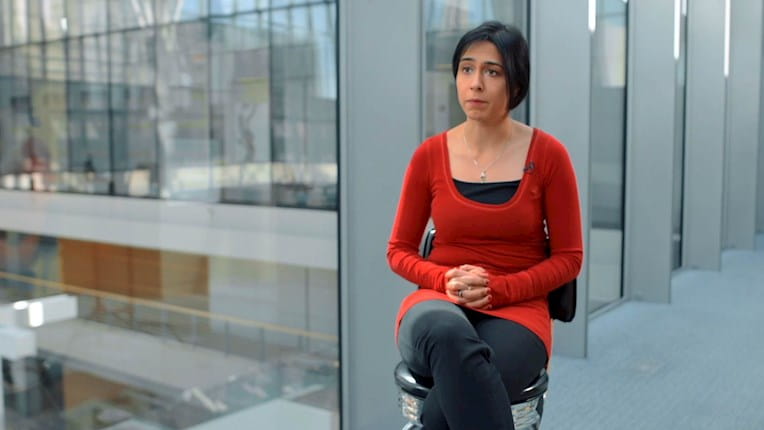
Video Transcript
Maryam Farboodi, ’14: 00:02 My work lies in the intersection of finance and economics, trying to apply theoretical models to think about broader questions in big data technology. I was doing extremely theoretical research and I was always interested in doing stuff which are more related to the real world, which led me to join Chicago econ and then the Joint Financial Economics Program at Chicago Booth.
Maryam Farboodi, ’14: 00:29 The faculty really helped me focus my research on issues that are relevant to the current financial climate. A lot of current policy focuses on how financial institutions intermediate for each other and that has been the focus of my research. The faculty at Chicago Booth challenged me in making sure that the insight is applicable to the current financial sector.
Maryam Farboodi, ’14: 00:52 What is really, really special about Booth is the really close interaction between the faculty here and the econ department. Chicago Booth, in particular the joint program, is the best place you can be in. It provides an environment where you can interact with people who are extremely deep in both finance and economics and not lose track of important issues. Chicago Booth and Econ has really being like home to me. That's the feeling that any student can get if they really engage themselves with faculty.
Current Financial Economics Students
Students in Chicago Booth’s Joint Program in Financial Economics focus their PhD research on a vast array of issues, from state-government borrowing costs to wealth inequality to climate policy. They go on to positions at leading academic institutions and global financial organizations.
Current Students
Monica Barbosa
Filippo Cavaleri
Sixun Chang
Manav Chaudhary
Shirui (Suri) Chen Leo Aparisi De Lannoy
Laurenz De Rosa
Joanna Harris Jacob Hartwig
Lewei He Tanvi Jindal
Jingoo Kwon
Federico Mainardi
Benjamin Marrow
Sangmin (Simon) Oh
Michael Varley
Jingtao Zheng
See a list of the current students in our Finance PhD Program .
How to Apply
To join the Joint Program in Financial Economics, you will need to be admitted to both the doctoral program in the Department of Economics and the PhD Program in Finance at Chicago Booth. However, you need only apply to one or the other program. Learn more about applying to Chicago Booth or to the Department of Economics .
Program Requirements
Learn more about the Joint Program in Financial Economics at Chicago Booth on the website or by referencing the joint program-specific guidebook below. See Joint Program-Specific Guidebook
General Program Expectations and Requirements
The Stevens Program at Booth is a full-time program. Students generally complete the majority of coursework and examination requirements within the first two years of studies and begin work on their dissertation during the third year. For details, see General Examination Requirements by Area in the Stevens Program Guidebook below.
Download the 2023-2024 Guidebook!
Brandeis International Business School

PhD in International Economics and Finance
- Job Market Placements
Class Profile
Program highlights.
Brandeis Advantage
Ranked among the best U.S. universities by U.S. News and World Report. Located close to Boston, a multicultural hub of finance, technology and innovation.
Global Career Preparation
Our doctoral program focuses on research, teaching, high-level policy making and consulting.
Renowned Faculty
Work with faculty experts who are leaders in academic research or seasoned financial professionals.
STEM-Designated
International students are eligible for up to 36 months of practical training in the U.S. after graduation. Learn more.
Scholarships
Nearly all students accepted into the PhD program receive full tuition scholarships, health insurance and living stipends.
A Close-knit Community
Learn more about our multi-cultural and supportive campus environment.
Quick Links
Request Information
Connect with Admissions
PhD Career Outcomes
- Job Market Candidates
Program Value

PhD candidates develop the analytical and technical background required for research, teaching, high-level policy making and consulting in international economics and finance. They pursue jobs in education as well as in the public and private sectors.
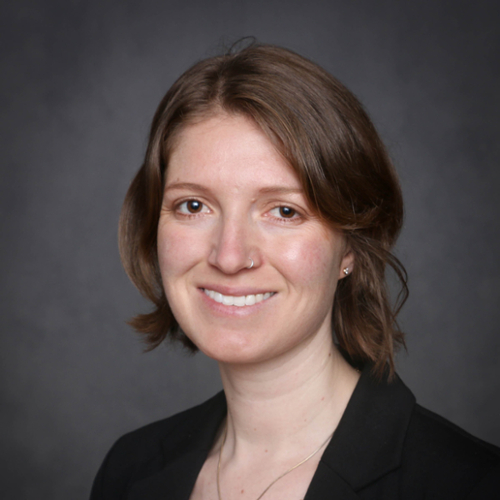
Lara Loewenstein
Federal Reserve Bank of Cleveland
MA’12, PhD’16 | United States
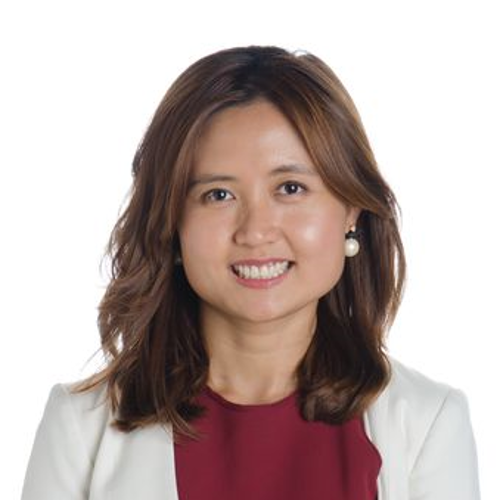
Vina Nguyen
Economist, IMF
PhD’14 | Vietnam
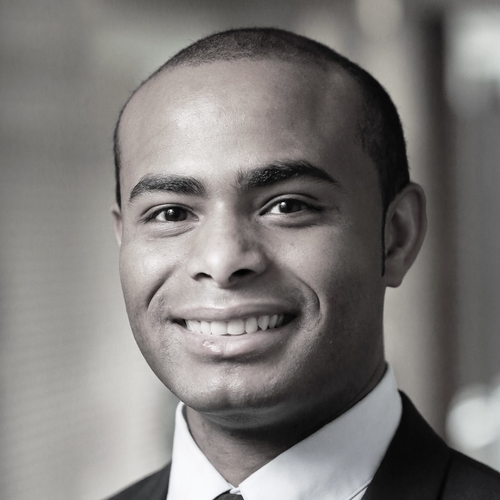
Raffi Garcia
Rensselaer Polytechnic Institute
PhD’18 | Dominican Republic
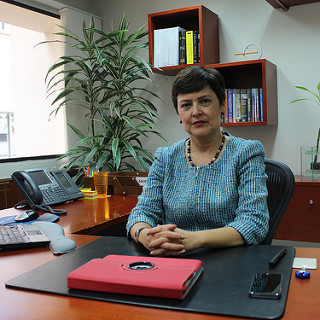
Cecilia Maya
Chief Operating Officer, Markets, XM
MA’00, PhD’04 | Colombia
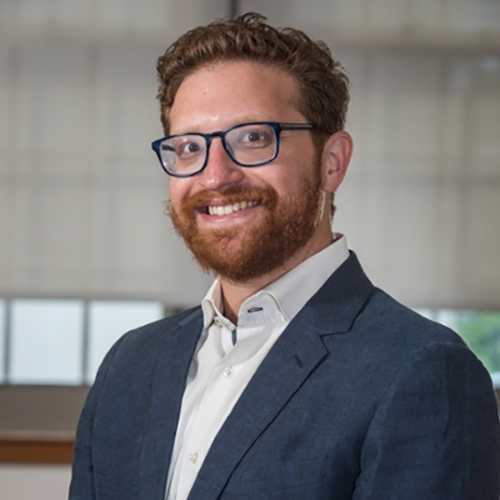
Rawley Heimer
Boston College
PhD’13 | United States

Satyam Panday
Standard and Poor's Rating Services
PhD’13 | Nepal
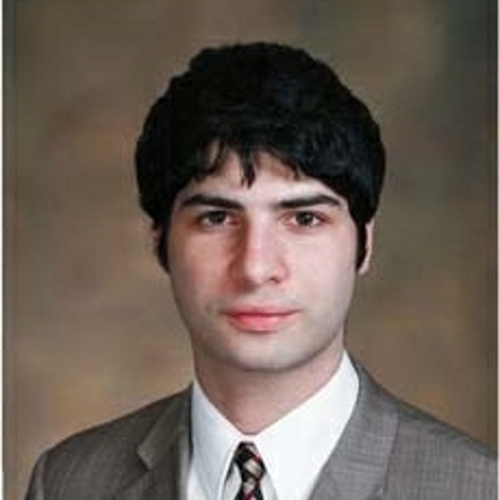
Eugene Kiselev
Federal Communications Commission (FCC)
PhD’13 | Russia
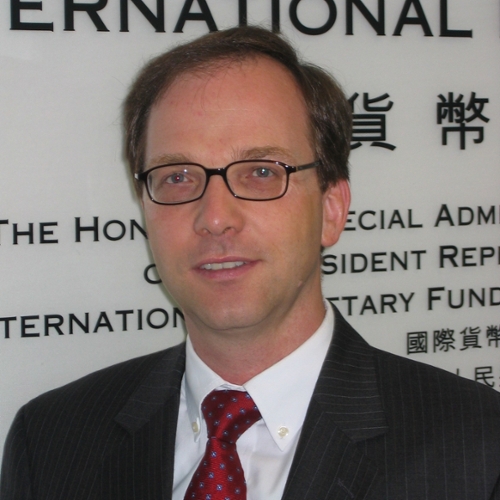
Olaf Unteroberdoerster
International Monetary Fund (IMF)
PhD’98 | Germany
- See Details on Career Outcomes
- After completing the first year (normally four courses per semester, including Advanced Microeconomics I and II, Advanced Macroeconomics I and II and Econometrics), students then take qualifying examinations in Microeconomics and Macroeconomics.
- After completing field courses, usually in one or two years, students take examinations in two fields of specialization. Current areas of specialization are Applied Methods, Finance and International Economics.
- In the first year, all PhD students also enroll in ECON 399 PhD Dissertation Workshop . The workshop provides opportunities for advanced students to present papers and define thesis objectives.
- In the third year, the PhD candidates begin to work on the dissertation , prepare initial work on the thesis, and submit a 3rd year paper.
- In the third year and beyond, the thesis takes shape and a formal committee is assembled. Once a thesis defense date is scheduled, the student presents the core of the thesis work, and once completed, the degree is awarded during the next degree period.
- PhD students are required to work as either a teaching or research assistant at Brandeis International Business School in years 1-5 of the program.
- Students receive the Master of Science degree upon successful completion of 13 courses, passing their 2nd year qualifying exams, and at least one of two field exams.
- View Courses & Timeline

Candidates are considered for admission every other year. The next intake will be Fall 2024.
- Application Requirements
- Tuition & Financial Aid
Median Verbal GRE / Quantitative GRE
Male / Female
Average Age
42% / 58%
Domestic / International
Countries Represented in the Incoming Brandeis International Business School Class
Albania ● Azerbaijan ● Cambodia ● Chile ● China ● Colombia ● El Salvador ● Ghana ● Hungary ● India ● Indonesia ● Kosovo ● Mongolia ● Namibia ● Nepal ● South Korea ● Taiwan ● Togo ● Ukraine ● United States ● Vietnam ● Yemen
UCL School of Management
University college london, phd programme in financial economics.
Start date: September 2024 Duration: 5 years (1 year MRes + 4 years PhD) Fees: We offer fully-funded scholarships to all admitted students who have applied by the 31 January 2024 (see details below) Application deadline: 31 January 2024, 17:00 UK time (late applications submited by the 05 April 2024 may still be considered, see details below) Entry: Applicants must hold a distinction in a master’s degree in Economics or a closely related subject. Applicants must demonstrate a high level of analytical and quantitative skills (such as in mathematics and statistics), evidenced by strong performance in relevant modules taken on previous degree programmes and/or through relevant standardised test performance (such as GRE Quantitative of at least 160). International students, please note that UCL’s English language requirement for this programme is a ‘ Level 2 ’ (IELTS and TOEFL are the preferred test, however others on the UCL recognised test list will be accepted if required) - further details regarding this can be found on the UCL English Language Requirements page.
The MRes and PhD in Financial Economics is a joint programme between the UCL Department of Economics and the UCL School of Management.
The MRes programme is the first year of the five-year integrated MRes/PhD programme in Financial Economics. The MRes programme will provide you with training in research methods together with an advanced understanding of financial economics, to enable you to conduct insightful and original PhD level research in financial economics.
The MRes will firstly provide quantitative training in microeconomics, macroeconomics, econometrics, and finance. These will be taught in the context of cutting-edge research and relevant applications. Secondly, it will provide you with analytic frameworks and transferable skills that will allow you to identify relevant and promising research topics, present ideas in order to obtain feedback, and provide feedback yourself.
The subsequent years (for students who progress from the MRes to MPhil) will focus on the skills you will need to run research projects to completion and to present completed research projects to various kinds of specialised audiences. Likewise, teaching skills will also be developed.

PhD Structure
- The MRes programme consists of taught modules (Microeconomics, Macroeconomics, Econometrics. Real Analysis and Probability with Economic Application), a hybrid module (Financial Economics) with taught components and research based components, and a research project in the final part of the year. For the MRes project, you work under supervision to design and carry out a substantial piece of original research. This enables you to gain a deep understanding of the entire research process.
- Superior performance is required for automatic progression from MRes to MPhil. In particular, students should achieve an average mark of not less than 60% in the independent, original research components of the programme, and not less than 50% in the taught element.
- Our highly selective and small-sized PhD programme ensures that each student receives personal attention and guidance from our faculty members throughout their doctoral study. The close mentorship process forms the foundations of a successful academic career. At the same time, you will be part of both the School of Management PhD cohort and the Economics PhD cohort, with which you will share most of the taught modules.
- We expect our PhD graduates to have as their goal an academic career as a faculty member in a top business school or Economics department or in the research group of an international institution or a central bank.
Students take a total of 180 credits in the MRes year. This is made up of the MRes Research Project (MSIN0135) and 75 credits of compulsory taught modules.
All modules in the MRes year are core modules, there are no optional modules.
- ECON0107 - Macroeconomics, 15 credits
- ECON0106 - Microeconomics, 15 credits
- ECON0108 - Econometrics, 15 credits
- ECON0118 - Real Analysis and Probability with Economic Applications, 15 credits
- MSIN0234 - Topics in Financial Economics, 30 credits
- MSIN0135 - MRes Financial Economics Research Project, 105 credits
The programme is delivered through a combination of lectures, seminars, and class discussion. Student performance is assessed through presentations, coursework, projects, and examinations.
Students will study 4 compulsory taught modules. A typical taught module is taught over two terms (2 x 10 weeks) with 4 hours of contact hours per week (3 hours of lecture + 1 hour of review session). In addition, students spend approximately 6-8 hours a week for each module on assessment and independent study to further develop the skills and knowledge covered in lectures and seminars.
Students will also undertake a substantial research project, which would usually start in Term 2 and be completed over the Summer. The total number of weekly hours will vary according to the weekly activities being undertaken.
Why choose us
What makes us different:.
Unlike many PhD Programmes in finance, our programme has a full anchor in economics and econometrics. Hence, we offer a unique world-class environment that combines the best of a leading business school, located in Canary Wharf, the heart of London’s modern financial district, and the tradition of economic research and teaching of the Department of Economics, which is located in Bloomsbury, London’s historical intellectual centre.
If you want to become an academic economist conducting research in finance, this programme is for you.
UCL School of Management and the Department of Economics
Founded in 2007, UCL School of Management has forged a reputation for world-leading research in management studies with 95% of the School’s research deemed to be world-leading or internationally excellent, the second highest percentage of any business school in the UK, according to the 2021 REF . The PhD programme is an integral part of our School’s active and ambitious research environment where students receive rigorous academic training and personalised research mentorship.
The UCL Department of Economics has an outstanding international reputation in key areas of current research. The Department ranked top in the UK for research environment and outputs in the field of Economics and Econometrics in the 2021 REF .
Our research programme offers a unique education and research experience with the intent of preparing you for scholarly careers at the highest level. Our highly selective and small-sized programme ensures that you receive personal attention and an opportunity for guidance from our world-leading scholars. The close mentorship process forms the foundations of a successful academic career.
As a research student you will join a highly active research environment which involves frequent research seminars and visits by leading scholars worldwide, reading groups, brown bag seminars and panels in which PhD students and faculty members present and discuss their ongoing work. Such forums provide an excellent opportunity to receive critical constructive feedback on your research and to develop academic, generic and transferable skills.
Applications
Applying for our mres/phd programme.
Entry requirements and admissions criteria:
Applicants to the MRes+PhD programme must hold a distinction in a master’s degree in Economics or a closely related subject. Applicants must demonstrate a high level of analytical and quantitative skills (such as in mathematics and statistics), evidenced by strong performance in relevant modules taken on previous degree programmes and/or through relevant standardised test performance (such as GRE Quantitative of at least 160). Submitting a GRE test result is encouraged but not compulsory and is only one of the components used to assess the strength of applications.
We only have a single intake in September. We accept applications throughout the year. Successful candidates who have submitted their MRes application by 31 January 2024 will receive a scholarship (full fee waiver plus a stipend). Successful candidates who have submitted their application after this date may receive a scholarship subject to availability, or will come with their own funding.
In your personal statement you are expected to suggest one or more faculty members as potential supervisors. On the application form you may see that it states that it is preferred that you contact potential supervisors beforehand. However, we strongly discourage applicants from contacting individual faculty members or potential supervisors when applying to our programme. All applications are first evaluated by a joint admissions committee, so contacting potential supervisors separately will not increase your chances.
We also require you to submit IELTS or TOEFL scores if English is not your first language. Our School requires a “Level 2” English language qualification which corresponds to:
IELTS: Overall grade of 7.0 with a minimum of 6.5 in each of the sub-tests.
TOEFL: Score of 96 overall, plus 24/30 in the reading and writing subtests and 22/30 in the listening and speaking subtests.
Application Deadline
The application window closes 31 January 2024 (17:00 UK time) and a late submission window closes on 05 April 2024 (17:00 UK time). We advise those interested in the programme to apply before 31 January 2024, as those applying in the late submission window will only be considered if there are still places remaining.
Application Procedure
Apply via UCL Postgraduate Admissions System here . When starting the application, you must select the MRes Financial Economics option. In addition to filling out the online application form, please upload a copy of the following documents:
- Official Transcripts of Grades / Course marks
- A 1 page personal statement that clearly indicates: (i) your research interests and preliminary research ideas, (ii) potential faculty member(s) you may want to work with (this is a suggested list, you don’t need to contact potential supervisors beforehand), and (iii) your motivation to do a PhD.
- Your GRE score report, if you took the test.
- Your IELTS/TOEFL score report, if English is not your first language.
Funding/Scholarships
We offer fully funded five year scholarships to all admitted students who apply before the 31 January 2024. The scholarship is open to all nationalities. It covers all tuition fees, and includes an annual stipend of £25,000 which is tax-free.
Successful candidates who have submitted their application after 31 January 2024 may receive a scholarship subject to availability or will come with their own funding.
Additional Costs
This programme does not have any compulsory additional costs outside of purchasing books or stationery, printing, thesis binding or photocopying. Students may have the opportunity to participate in conferences in the UK and internationally. The UCL School of Management provides MRes/PhD students with an annual budget for conferences, which students will use to cover the travel, accommodation, food and other costs whilst at conferences, in line with UCL’s expenses policy.
Further Information and Contact Details
The full-time MRes/PhD programme runs from September each academic year. Entrance is therefore every September. While we may accept applications until 05 April 2024 we encourage candidates to apply as early as possible. Our programme is very selective and we only admit a limited number of students, so applying before 31 January 2024 increases your chances.
How to Apply
For queries about the MRes/PhD Programme that are not addressed on our web pages, please contact [email protected] .
Video Library
Frequently Asked Questions about the UCL School of Management MRes/PhD Programme
Programme Information
Application process, admissions requirements.
Students are required to possess a “Level 2” English language qualification if it is not their first language. This means: TOEFL: Score of 96, plus 24/30 in the reading and writing, and 22/30 in the listening and speaking subtests. IELTS: Overall grade of 7.0 with a minimum of 6.5 in each of the subtests.
Further Information
If you have any other questions regarding the programme that are not addressed on our web pages please email the programme team ( [email protected] )
Department of Agricultural and Applied Economics
- Degree Programs
6.0. Doctor of Philosophy Degree Program
The doctoral program in Agricultural and Applied Economics is designed to develop a broad based competence in economic theory and in techniques of quantitative analysis. Dissertation research of students in our department usually addresses applied problems using contemporary economic theory and analytical methods. Students completing our program have demonstrated a high degree of success in academics, business, and government.
Two options are offered for the Doctor of Philosophy in the Agricultural and Applied Economics program. The first option does not require a minor. The second option includes a minor in Family Financial Planning—a joint Ph.D. program between the Department of Agricultural and Applied Economics and the College of Human Sciences. Completion of the Doctoral program in Agricultural and Applied Economics with a minor in Family Financial Planning qualifies graduates to take an exam administered by the Certified Financial Planning Board of Standards to become Certified Financial Planners.
6.1. Prerequisites
Most students will have completed the requirements for an M.S. degree or its equivalent before admission to the doctoral program. If the Master's degree does not meet the prerequisite requirements for entering our Master of Science program (see Section 5.1) then those requirements must be met in order to enter the Ph.D. program. Some exceptional students will be offered the opportunity to pursue a Ph.D. directly from a Bachelor's program. In this case, see the Graduate Coordinator for course and program requirements.
Background in algebra, partial and total differentiation, integration and basic matrix or linear algebra operations are very useful to perform well in coursework and research work.
6.2. Credit Hour Requirements
The doctoral program requires a minimum of 60 credit hours of course work beyond the baccalaureate degree and at least 12 credit hours of dissertation research (AAEC 8000).
6.3. Transfer of Credit
Transfer of graduate credit from other academic institutions may be allowed. The request for transfer must be initiated by the student and supported by the student's committee chair. Transfer decisions are made by the department Graduate Coordinator and must be approved by the Graduate School . Information required in support of transfer requests includes academic transcripts and course catalogue descriptions of each course proposed for transfer. Course syllabi may also be requested to support transfer decisions.
6.4. Substitution for Core Courses
Substitutions for core courses are allowed only under unusual circumstances. Requests for substitutions for core courses must be initiated by the student and his or her committee chair, to the department Graduate Coordinator and must be approved by the Graduate School . Final decisions on substitutions for core courses taught outside our department are made by the department Graduate Coordinator . Decisions on core courses taught in the department are made by the current instructor of the core course being replaced.
6.5. Ph.D. Comprehensive Examination
The purpose of the Ph.D. comprehensive examination is to test the student's ability to integrate knowledge from various subject matter areas and apply appropriate concepts and tools to issues and problems relevant to the discipline. The comprehensive exam is administered by a departmental committee twice each year (usually in May and August) and is normally taken at the end of the first full year of coursework. The exam has two parts which are taken separately. Part 1 of the exam focuses econometric methods and Part 2 covers microeconomic theory. Students have two opportunities to pass both parts of the exam. If both parts of the exam are passed on the first attempt then the student has successfully completed this degree requirement. If one or both parts of the exam are failed on the first attempt (usually in May), the student must retake the failed part(s) at the next offering (in the following August). A second failure of either part of the comprehensive exam will result in dismissal from the student's Ph.D. program.
6.6. Qualifying Examination and Admission to Candidacy
Graduate school rules require that all doctoral students successfully complete a Qualifying Examination for admission to candidacy for the doctor's degree. In the Department of Agricultural and Applied Economics the Dissertation Proposal Defense serves as the Qualifying Exam. Students are allowed two attempts to satisfactorily complete this examination. Failure to satisfactorily complete the examination on a second attempt will result in dismissal from the Ph.D. program. Further information on the Dissertation Proposal and Proposal Defense is provided in Section 9.0 of this Handbook.
6.7. Final Examination
All doctoral candidates are required to pass a public final oral examination which is usually over the general field of the dissertation. Candidates should consult the Graduate School for details regarding scheduling of the final examination. After the final examination, the professor conducting comprehensive exams will send a written notification of the results to the Graduate Secretary for the student's graduate file.
Doctoral candidates, with their major advisor, are required to find their own Dean's Representative for the Graduate School for their defense, preferably someone outside of the department.
Public announcement of exams will be done through the department Graduate Secretary. Exams must be announced at least four weeks prior to the exam date, without exception.
6.9. Degree Program Course Requirements
Listed below are the course requirements for the Ph.D. program options. Courses listed specifically by number are core courses. Note that the option II course requirements have been revised in consultation with the Department of Personal Financial Planning.
Ph.D in Agricultural and Applied Economics - No Minor Required (option1) 1
Course number / course title / credit hours.
- AAEC 5303 / Advanced Production Economics / 3
- AAEC 5307 / Applied Econometrics I / 3
- AAEC 6316 / Advanced International Trade and Policy / 3
- AAEC 5321 / Research Methodology in Economics/ 3
- AAEC 6302 / Food, Ag., and Nat. Resource Policy Analysis / 3
- AAEC 6305 / Economic Optimization / 3
- AAEC 6308 / Advanced Natural Resource Economics / 3
- AAEC 6310 / Demand and Price Analysis / 3
- AAEC 6311 / Applied Econometrics II / 3
- AAEC 6301 / Microeconomic Theory II / 3
- AAEC 6315 / Applied Microeconomics I / 3
- ECO 5311 / Macroeconomic Theory and Policy / 3
- Committee Approved Field Courses / / 24
- AAEC 8000 / Doctor's Dissertation / 12
Total Credit Hours 72
Ph.D. in Agricultural and Applied Economics - Minor in Family Financial Planning (option 2) 1,2
- AAEC 8000 / Doctor's Dissertation / 21
- PFP 5371 / Fundamentals of Personal Financial Planning / 3
- PFP 5372 / Asset Management II / 3
- PFP 5373 / Personal Financial Planning Cpstn. / 3
- PFP 5394 / Retirement Planning / 3
- PFP 5497 / Risk Management and Insurance Planning / 4
- PFP 5398 / Estate Planning / 3
- PFP 5362 / Asset Management I / 3
- PFP 5377 / Client Communication and Counseling / 3
- ACCT 5311 / Individual Study in Accounting / 3
total credit hours 85
1 Numbered courses are core courses. 2 Draft revisions pending review and approval of AAEC faculty.
<<< top >>>
Contact TTU
- Like Department of Agricultural and Applied Economics on Facebook Like Department of Agricultural and Applied Economics on Facebook
Economics Online
How to Enroll | Financial Aid | Course Fees
UMass Economics offers several online courses each fall, winter, spring and summer for UMass degree and non-degree seeking students. These classes are administered by the UMass University Without Walls office (UWW). These courses serve a variety of students including UMass commuters, UMass students who live away from Amherst each winter and summer and want to take extra courses outside of fall and spring semesters, UMass degree-seeking seniors trying to finish up only a few remaining courses and credits away from Amherst, UMass students who want to take an online version of a UMass course along with their other face-to-face courses in a given semester, students taking non-degree Economics classes for personal interest or professional development, or non-degree UMass students who attend another college or university full time. Note: UMass degree-seeking students who take online University+ Economics courses in fall and spring semesters are subject to additional Univ+ course fees above and beyond standard tuition for the fall and spring. Contact the UMass University+ office for details and visit their website to learn about course fees and billing , financial aid and how to enroll in these courses.
Questions? Contact us!
Click here to enroll and view all courses Once on the page, select Economics under the "Subject" drop down menu on the left side for current online course offerings in Economics.
Crotty Hall 412 North Pleasant Street University of Massachusetts Amherst, MA 01002 413-545-2590
International and Development Economics
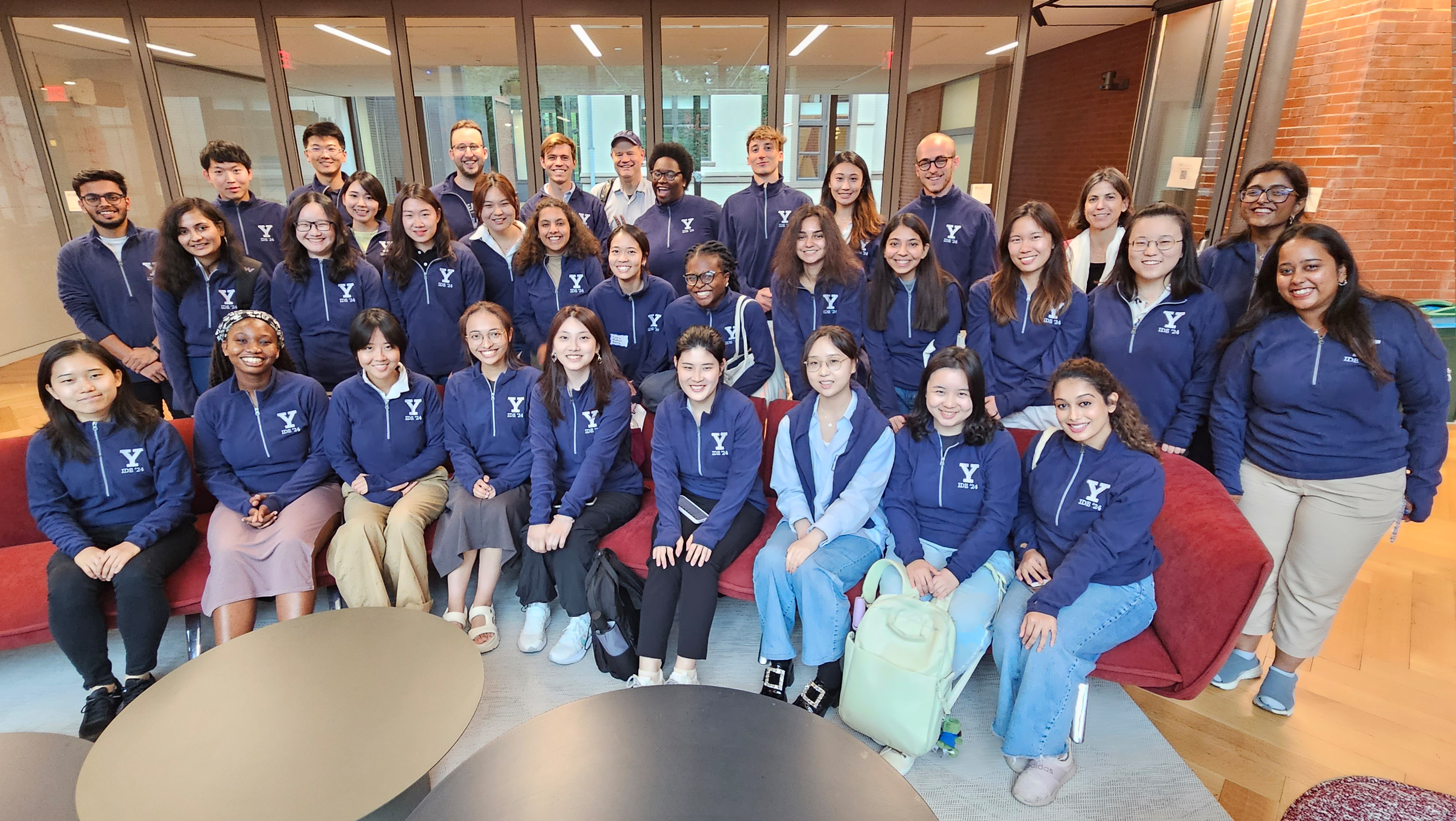
The IDE Program is a one-year Master's program intended to help students build the necessary toolkit for embracing obstacles in their future careers.
The global economic environment has become increasingly complex and poses a myriad of new challenges for policy and data analysts and professionals in all fields.
The ability to respond to rapid changes in this environment requires that leaders have a detailed understanding of the economic forces that affect economic outcomes. Careful economic policy analysis requires practitioners who can make use of the most current theoretical academic literature, as well as do empirical and econometric analysis using the latest approaches and methods.
No longer accepting applications
Visit the GSAS Application site for more information!
- The Program
- Prospective Students
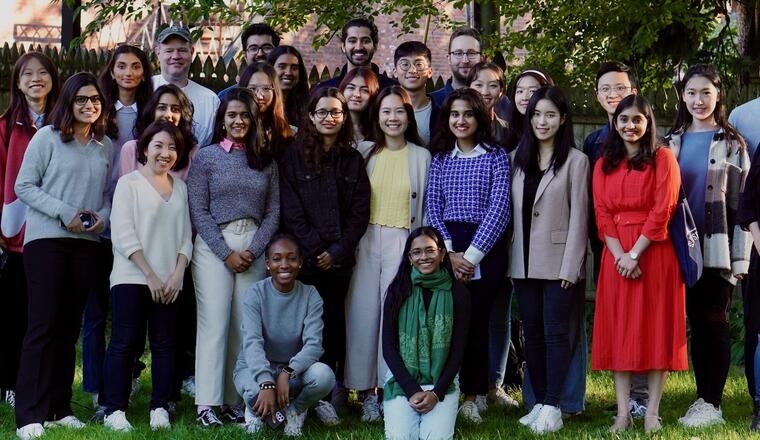
The IDE program at Yale University, housed within the Economic Growth Center (EGC) and the Department of Economics, is a one-year Masters program intended to help students build the necessary toolkit for embracing such obstacles in their future careers, whether as career practitioners and economic analysts or to follow a path through the policy analysis field on their way to subsequent Ph.D. work.
This site is to inform prospective students of the program, the university and life in New Haven. We encourage prospective students to also visit the website of the Yale Graduate School of Arts and Sciences (GSAS) for more information on the application procedure, policies, living in New Haven and other Yale facilities that are all open to IDE Students.
Additionally, this site will provide current students with access to all information they need on a daily basis and the rich alumni network. In the last 65 years, graduates have followed careers in all sectors of work. We encourage current students to reach out to alumni and benefit from their advice.
Office address
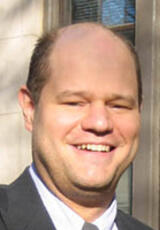

Affordable Online Masters in Finance
Reviewed by Linda Weems I got started researching colleges and universities about 10 years ago while exploring a second career. While my second career ended up being exactly what I’m doing now, and I didn’t end up going to college, I try to put myself in your shoes every step of the way as I build out College Cliffs as a user-friendly resource for prospective students.
Updated: May 17, 2024 , Reading time: 11 minutes
Share this on:
Find your perfect college degree
In this article, we will be covering...
Getting a master’s degree can cost a ton, especially with other expenses like living and textbooks in addition to tuition. This is one of the reasons why adoption of online programs, identical to traditional programs, is on the rise. If finance is where you shine, here’s a list of the most affordable online masters in finance.
Pursuing an online Master’s in Finance equips you with specialized financial knowledge vital for advanced industry positions. Such a degree can pave the way for careers as financial analysts or financial managers and may even compete with an MBA for specific roles.

Overview of Finance Degrees
When you consider advancing your education in finance, you’ll encounter a range of degree options. An online Master’s in Finance is typically a focused alternative to a traditional Master of Business Administration (MBA) with a finance concentration. Your degree will explore finance-specific subjects, preparing you for analytical roles like financial analysts who assess financial data to aid organizational decision-making.
- MBA with Finance Concentration : Often includes a broader business curriculum with finance as a subset.
- Master’s in Finance : Focused intensely on finance, which is beneficial for specialized finance roles.
Respective curricula often overlap, however, the Master’s in Finance may offer a deeper knowledge of financial theory, investment analysis, and risk management.
Finance Concentration Essentials
By choosing to specialize with a finance concentration within your Master’s degree, you focus on key areas vital for high-level financial roles. This particularly benefits those looking to become financial managers who oversee the financial health of an organization and need to have a thorough knowledge of the market and its instruments.
Key components to look for include:
- Advanced Corporate Finance : Broadens your understanding of corporate financial decision-making.
- Investment Analysis : Equips you with the skill to analyze and recommend investment strategies.
It’s important to assess the curriculum meticulously to ensure it aligns with your career goals and provides you with the competencies needed in the evolving finance sector.

Top Schools Offering Affordable Online Masters in Finance
When you’re looking to advance your career with an online master’s in finance, affordability is likely a top concern. Let’s explore some institutions that offer competitive pricing for an online masters in finance degree.
Fitchburg State University
If you’re considering an online Master of Business Administration in Finance, Fitchburg State University offers a program that might fit your needs. This affordable option provides the convenience of paying for each course as you go, which can be a boon to your financial planning. In-state and out-of-state students benefit from the same tuition rates.
Fitchburg State’s asynchronous learning structure aligns well with the busy schedules of working professionals like you. You can expect to immerse yourself in fundamental finance concepts through core courses and choose electives that suit your career goals. Furthermore, if you’re aiming for a swift educational journey, completing your degree in as few as 12 months is possible.
The annual tuition for this program is $4,934.
Arkansas State University
If you’re seeking advanced training in finance that allows you the freedom to maintain your professional commitments, consider the online graduate programs at Arkansas State University. These programs are designed with flexibility and accessibility in mind, aiming to fit into the busy schedules of working professionals like yourself.
The typical journey towards your online master’s in finance with Arkansas State University is expected to encompass a range of core financial concepts. Key courses you’ll likely encounter include:
- Financial Reporting : Understanding financial statements and accounting standards.
- Investment Analysis and Portfolio Management : Strategies for managing investment portfolios.
- Corporate Finance : Insights into financial decisions, capital budgeting, and valuation.
The annual tuition for this program is $5,958.

Northeastern State University
At Northeastern State University, you can enhance your financial expertise with an online Master’s in Business Administration (MBA) emphasizing finance. This program broadens your understanding of business and financial concepts through a competitive yet accessible educational format.
In this program, you’ll engage with courses that sharpen your financial reporting and investment analysis skills. The online format doesn’t compromise on quality, making sure that, despite the distance, you’re well-equipped to manage and excel in high-demand finance areas of your choosing.
The annual tuition for this program is $5,095.
Columbia Southern University
If you’re aiming for an affordable online Master’s in Finance, Columbia Southern University (CSU) might be the right place. CSU offers a Master of Business Administration with a concentration in Finance through a fully online platform designed with working professionals like you in mind.
To join this program, you’ll need a bachelor’s degree from an accredited institution . While CSU may prefer qualifications in finance, economics, or related fields, the university also considers candidates with various academic backgrounds.
The MBA with a Finance concentration amounts to 36 credit hours. CSU’s thoughtfully crafted courses are designed to offer you comprehensive knowledge in fields important to finance, such as:
- Investment Analysis: Explore managing and building investment portfolios.
- Corporate Finance: Explore decision-making processes within corporations.
- Financial Reporting: Learn how to interpret financial statements.
The annual tuition for this program is $6,030.

University of South Dakota
If you’re seeking an affordable pathway to enhance your financial expertise, the University of South Dakota offers an online Master’s in Business Administration specializing in Finance that may suit your needs. This program blends rigorous coursework with real-world application, preparing you for advanced financial roles.
At USD, you can expect to engage in core courses that address critical topics such as financial reporting, where you’ll learn about financial statements and accounting standards. The curriculum also includes investment analysis and corporate finance, offering you a comprehensive view of the financial domain.
The annual tuition for this program is $7,057.
Curriculum and Coursework
When choosing an affordable online Master’s in Finance, you’ll be immersed in comprehensive coursework designed to build your expertise in various financial disciplines. The core courses establish a solid foundation, while specialized electives allow you to tailor your degree to your interests and career goals.
Core Courses in Finance
Your core curriculum typically covers important subjects such as Financial Management, where you’ll learn to make strategic financial decisions, and Corporate Finance, which explores managing a corporation’s capital structure. Investment Analysis and Portfolio Management equip you with the skills to assess investment opportunities and manage assets effectively.
Accounting fundamentals are also integral, focusing on Financial Accounting and Financial Statement Analysis, enabling you to interpret and analyze financial statements accurately. Quantitative Methods and Managerial Economics also feature, providing the analytical tools necessary for data-driven financial analysis.
- Risk Management and Derivatives : Here, you’ll understand how to identify and manage various financial risks using derivative instruments.
- Financial Planning : This course prepares you to create comprehensive financial plans, incorporating investment strategies and planning for future needs.
- International Finance : You’ll explore finance in a global context, including foreign exchange risk, international financial markets, and cross-border transactions.

Specialized Electives
After the core courses, you can choose specialized electives to focus on areas that align with your interests or career goals. Options may include:
- Security Analysis : Learn the fundamentals of evaluating and valuing investment securities.
- Financial Theory : Deepen your understanding of the theories underpinning financial decision-making processes.
- Technology in Finance : Discover how financial technologies are reshaping the industry and how to leverage them in financial management.
- Managerial Finance : Further your ability to use financial tools for management and strategy execution within organizations.
- Accreditation : Reputable programs are often accredited by bodies such as the Accreditation Council for Business Schools and Programs (ACBSP), ensuring the program meets rigorous academic standards.
By completing a mix of these core courses and specialized electives, you’ll be well-equipped to advance your finance career in various settings, through the flexibility of an online learning environment.
Factors to Consider When Choosing a School for Your Online Masters
When acquiring an Online Master’s in Finance, it is vital to scrutinize several key factors before selecting an institution. These will ensure that your educational and professional goals are met with the highest efficacy.
Tuition Cost
When exploring online Master’s in Finance programs, understanding tuition costs is vital for budgeting and financial planning. Tuition for these programs can vary significantly, typically influenced by factors such as the institution’s reputation, program accreditation, and inclusion of any additional fees.
Remember, while cost is a critical factor, it’s equally important to weigh the quality of education and potential return on investment when selecting an online Master’s in Finance program. Look into options for scholarships, grants, or corporate sponsorships that can alleviate your financial burden.
Student Support
When you enroll in an online Master’s in Finance, receiving comprehensive student support is vital for success. Online programs offer various student services, and it’s important to be aware of, as they greatly enhance your learning experience.
You should have access to technical assistance to ensure seamless use of learning platforms. Assistance typically covers troubleshooting, navigation, and software issues. If you have a disability, check if the institution provides adequate support to accommodate your needs.
Similarly, Opportunities for mentorship and connecting with peers and professionals in the field may be provided, fostering a sense of community.

Accreditation
When choosing an online Master’s in Finance program, checking the accreditation is vital. Accreditation is a quality assurance process that evaluates and monitors institutions and their programs to ensure they meet acceptable levels of quality.
Make sure the program has a regional accreditation which adheres to strict standards, which can impact transfer credits, employment opportunities, and qualification for federal financial aid . Besides regional or national accreditation , some programs may have specialized accreditation from bodies like the Accreditation Council for Business Schools and Programs (ACBSP). These accrediting organizations assess programs against industry-specific standards.
Lastly, the flexibility you seek in an online program should not mean a compromise on quality. Your degree is not just a personal achievement, it’s an investment in your future. Choosing an accredited program can help ensure that your education meets industry standards recognized by employers, opening doors to career advancement opportunities.
When exploring online Master’s in Finance programs, your decision should hinge on their reputation. Renowned universities typically back their online offerings with various resources and brand prestige, potentially uplifting your employability.
Consider institutions known for their affordable yet reputable online masters in finance and related fields. If a university offers similarly successful programs across disciplines, this can be a positive indicator for their finance degrees.
Finally, verify that your advanced degree online carries the same weight as its on-campus equivalent. A credible program assures that your online Master’s in Finance is indistinguishable from a traditionally acquired degree in terms of the opportunities it affords you post-graduation.

Related Questions
How long does it typically take to complete an online master’s in finance.
The duration of your online Master’s in Finance can vary. Typically, it takes about one to two years to complete if you’re studying full-time. However, some programs, such as the Executive Master of Laws in Securities and Financial Regulation, might extend up to three years, especially if you choose a part-time schedule.
Does an Online Master’s in Finance Provide the Same Opportunities as an On-Campus Degree?
Yes, an online Master’s in Finance often provides curriculum, resources, and opportunities similar to an on-campus program. Graduates from reputable online programs also have access to career services and alumni networks and have the same accreditation status as their on-campus counterparts. You can rest assured that you’re getting a similar education.
Is a Masters in Finance Worth It?
Yes, it is worth it. A Master’s in Finance refines your expertise and also expands your professional horizons across lucrative fields. Your skill set will be relevant in corporate finance, investment banking, and entrepreneurship. For instance, roles like chief financial officer or financial advisor are within reach.
An online finance master’s program offers a blend of affordability and flexibility tailored to your busy schedule. Remember, picking the right program equips you with the skills valued in today’s dynamic financial landscape. When deciding, consider the program’s structure, cost, and the vibrant community it offers, ensuring that your educational journey aligns with your personal and professional goals.
Related Posts

Explore ratings and reviews for schools and universities on our platform, your essential guide for making informed educational decisions. Find all the help and information you need for your educational journey in one convenient place.
- LIVE DISCOURSE
- BLOG / OPINION
- SUBMIT PRESS RELEASE
- Advertisement
- Knowledge Partnership
- Media Partnership
IIFT Opens Registrations for MA and Ph.D. Economics Programs for 2024-25
Indian institute of foreign trade (iift), accredited by aacsb and graded a+ by naac, announces the opening of registrations for its ma (economics) and ph.d. (economics) programs for the academic year 2024-25. candidates must appear for an online entrance exam, with interviews scheduled for july 2024..
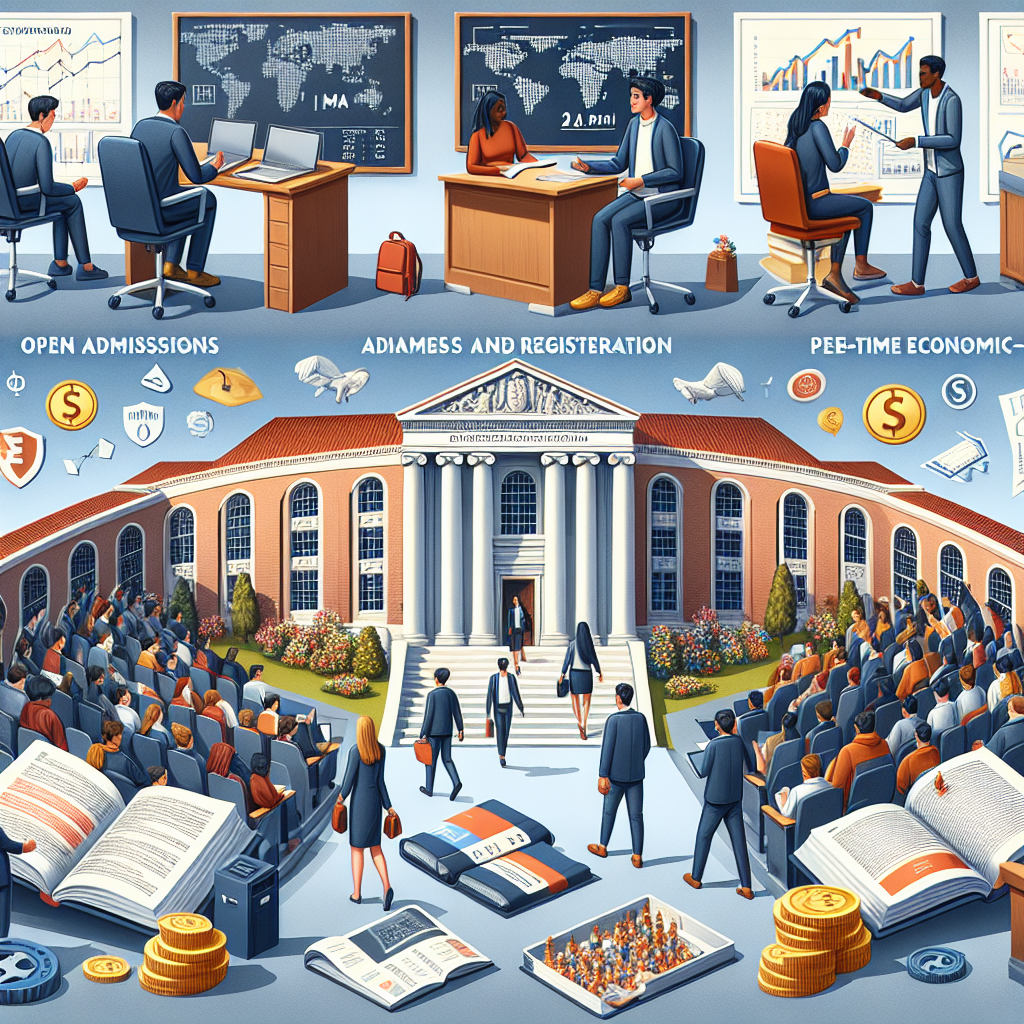
The Indian Institute of Foreign Trade (IIFT), premier 'B-School' in the country, was established in 1963 under the Ministry of Commerce & Industry, Govt. of India to contribute in the skill building for the external trade sector of India. The Institute was granted ''Deemed to be University'' status in 2002. The Institute was granted the prestigious AACSB Accreditation in 2021. With this the IIFT figures amongst the top 900+ Business Schools of the world which have earned this accreditation. In 2023, the institute was graded A+ by National Assessment and Accreditation Council (NAAC). For the Academic Year 2024-25, registrations are open for following programmes: 1. Two Year Full- time MA (Economics - Specialization in Trade & Finance) programme 2024-26 2. Ph.D. (Economics) Programme 2024 (Full-time & Part-time) Eligibility Criteria: 1. MA (Economics- Specialization in Trade & Finance) Programme 2024-26 Complete details about eligibility criteria are given in the Prospectus which is available at https://docs.iift.ac.in/Pilotweb/ma/brochure.pdf 2. Ph.D. (Economics) Programme 2024 (Full-time & Part-time) Complete details about eligibility criteria are given in the Prospectus which is available at https://docs.iift.ac.in/Pilotweb/phdeco/brochure.pdf Mode of Admission: Candidates will have to be appear in online proctoring based entrance exam. Shortlisted candidates will be called for Interview (in physical mode).
How to apply: Complete details about how to apply for IIFT's MA (Economics - Specialization in Trade & Finance) Programme 2024-26 and Ph.D. (Economics) Programme 2024 (Full-time & Part-time) are available on IIFT website i.e. www.iift.ac.in under Current Admissions.
Important Dates: MA (Economics) Specialization in Trade & Finance 2024-26 Last date of submission of application : 27th May 2024 Date of AI Proctoring Based Entrance Examination: 9th June 2024 (3.00 pm) Interview of shortlisted candidates : First/Second week of July 2024 Commencement of the programme : August 2024 Ph.D. (Economics) Programme 2024 (Full-time & Part-time) Last date of submission of application, letter of recommendation and statement of purpose : 24th May 2024 Date of Online Proctoring Based Entrance Examination : 9th June 2024 Interview of shortlisted candidates : First/Second week of July 2024 Commencement of the Programme : August 2024 Application Fee: Category MA (Economics - Specialization in Trade & Finance) 2024-26 Ph.D. (Economics) Programme 2024 (Full-time & Part-time) General / OBC/EWS Rs. 1600 Rs. 2500 SC/ST/PWD Rs. 800 Rs. 1250 Foreign Nationals / NRIs $ 80 (Rs. 6000) $ 120 (Rs. 8500)
Suresh Gyan Vihar University (SGVU) Achieves NAAC A+ Ranking: A Testament to Excellence in Education

Japan Energy Summit and Exhibition Hosts and Sponsors

The growing promise of cancer vaccines

Welcome to a brave new world of therapeutics

70+ journalists from global media investigating Dubai Unlocked project invol...
Latest news, half of world's natural pastures degraded: un report warns of food supply risks, kerala on high alert: imd forecasts extreme rainfall for pathanamthitta and idukki, crown prince of saudi arabia reassures on king's health amid treatment, syrian first lady asma assad diagnosed with leukaemia: president's office.

OPINION / BLOG / INTERVIEW
Navigating the boundaries: understanding rate limits in chatgpt apis, fire on the fringe: mapping wildfire risks in urban expansion zones, breathe easy: the vital link between urban green spaces and mental health, how neuronal changes shape early brain development, connect us on.
- ADVERTISEMENT
- KNOWLEDGE PARTNERSHIP
- MEDIA PARTNERSHIP
- Agro-Forestry
- Art & Culture
- Economy & Business
- Energy & Extractives
- Law & Governance
- Science & Environment
- Social & Gender
- Urban Development
- East and South East Asia
- Europe and Central Asia
- Central Africa
- East Africa
- Southern Africa
- West Africa
- Middle East and North Africa
- North America
- Latin America and Caribbean
OTHER LINKS
- Write for us
- Submit Press Release
- Opinion / Blog / Analysis
- Business News
- Entertainment News
- Technology News
- Law-order News
- Lifestyle News
- National News
- International News
OTHER PRODUCTS
Email: [email protected] Phone: +91-720-6444012, +91-7027739813, 14, 15
© Copyright 2024
Suggestions or feedback?
MIT News | Massachusetts Institute of Technology
- Machine learning
- Social justice
- Black holes
- Classes and programs
Departments
- Aeronautics and Astronautics
- Brain and Cognitive Sciences
- Architecture
- Political Science
- Mechanical Engineering
Centers, Labs, & Programs
- Abdul Latif Jameel Poverty Action Lab (J-PAL)
- Picower Institute for Learning and Memory
- Lincoln Laboratory
- School of Architecture + Planning
- School of Engineering
- School of Humanities, Arts, and Social Sciences
- Sloan School of Management
- School of Science
- MIT Schwarzman College of Computing
MIT’s Master of Applied Science in Data, Economics, and Design of Policy program adds a public policy track
Press contact :.

Previous image Next image
MIT’s Abdul Latif Jameel Poverty Action Lab (J-PAL) and Department of Economics have announced an expansion of their jointly administered Master of Applied Science in Data, Economics, and Design of Policy (DEDP) program . This expansion adds a new public policy track to complement the existing international development track, opening up new avenues for student learning and research.
Designed to tackle poverty alleviation and other pressing policy challenges in the United States and other high-income countries, the curriculum of the new track spans a diverse set of issues, from domestic concerns like minimum wage and consumer welfare to global matters including trade, climate change, and immigration. Applications for the public policy track will open this fall, with the inaugural cohort set to arrive on MIT’s campus in spring 2026.
The DEDP program, led by MIT professors and Nobel laureates Abhijit Banerjee and Esther Duflo, along with professors Sara Fisher Ellison and Benjamin Olken, was established with the mission of equipping diverse cohorts of talented professionals with the knowledge and skills to tackle poverty using evidence-based approaches. The new master’s degree track will support this mission while also underscoring the program’s commitment to addressing a broad array of critical challenges in the fight against poverty worldwide.
"The DEDP program has proven successful on many dimensions, and we are enthusiastic about leveraging its successes to address a broader set of social challenges,” says Ellison, a faculty lead for the program. “The public policy track will enable us to apply evidence-based methodology to poverty alleviation and other related issues in the context of high-income countries, as well. Given increasing levels of wealth and income inequality in these countries, we feel that the timing is opportune and the need is great."
The DEDP program distinguishes itself with an innovative admissions model that prioritizes demonstrated ability and motivation over traditional credentials, such as standardized tests and recommendation letters. To be eligible to apply to the master’s program, candidates must have earned a DEDP MicroMasters credential by passing five of the DEDP online courses. The courses are completely free to audit. Those who wish to earn a course certificate can pay a fee, which varies by the learner’s ability to pay, to take the proctored exam. While applications are reviewed holistically, performance in these classes is the primary factor in admissions decisions.
This approach democratizes access to higher education, enabling students from typically underrepresented backgrounds to demonstrate their potential for success. Notably, the program has welcomed many students from nontraditional backgrounds, such as a student who enrolled directly from high school (and who is now a second-year PhD student in economics at MIT), reflecting the ambition of its faculty directors to make higher education more accessible.
Sofia Martinez, a graduate of the class of 2023 and now co-founder of Learning Alliance , says, "Without the MicroMasters paving the way, applying to MIT or any similar institution would have been unthinkable for us. Initially, my aim in taking the online courses wasn't to pursue the residential program; it was only after witnessing my own progress that I realized the possibility wasn't so distant after all. This sentiment resonates with many in our cohort, which is truly humbling.”
Since its launch in 2020, the DEDP master’s program has conferred degrees to 87 students from 44 countries, showcasing its global reach and the success of its admissions model. Upon arriving on campus, students embark on an accelerated master's program. They complete a full course load in the spring, followed by a capstone project in the summer, applying the theoretical knowledge and practical skills gained through the program at research and policy organizations.
Share this news article on:
Related links.
- Data, Economics, and Design of Policy (DEDP) master’s program
- Department of Economics
Related Topics
- Online learning
- Education, teaching, academics
- School of Humanities Arts and Social Sciences
Related Articles
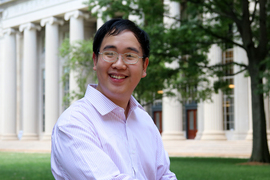
“To make even the smallest contribution to improving my country would be my dream”
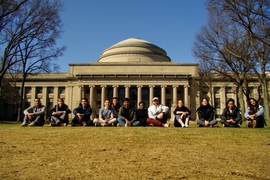
Diverse international cohort first to earn MIT master's degrees in data, economics, and development policy
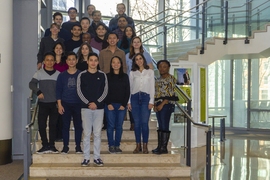
MIT launches master’s in data, economics, and development policy, led by Nobel laureates
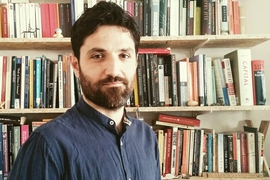
Turning an economics education into solutions with impact
Previous item Next item
More MIT News
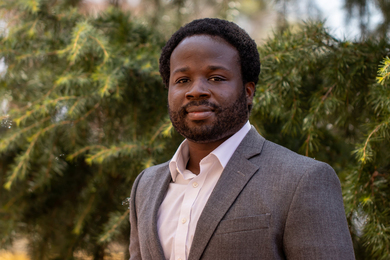
An expansive approach to making new compounds
Read full story →

Q&A: A graduating student looks back on his MIT experience
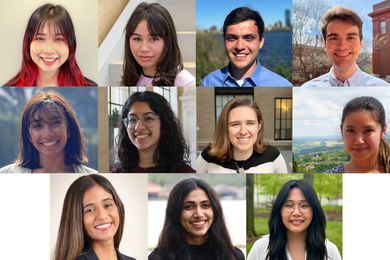
Eleven from MIT awarded 2024 Fulbright fellowships
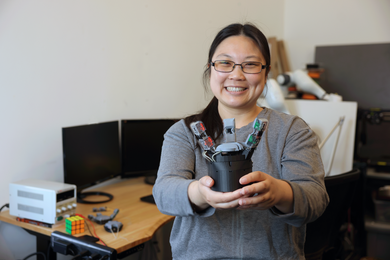
Robotic palm mimics human touch
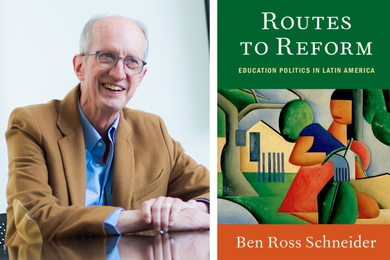
Trying to make the grade

Janabel Xia: Algorithms, dance rhythms, and the drive to succeed
- More news on MIT News homepage →
Massachusetts Institute of Technology 77 Massachusetts Avenue, Cambridge, MA, USA
- Map (opens in new window)
- Events (opens in new window)
- People (opens in new window)
- Careers (opens in new window)
- Accessibility
- Social Media Hub
- MIT on Facebook
- MIT on YouTube
- MIT on Instagram

IMAGES
VIDEO
COMMENTS
The demand for economic professionals with a PhD in economics is rising across various fields, including business, finance, academics, and research. ... When considering an online PhD in economics program, be sure to carefully review program requirements to ensure that the program is fully online, as some programs may have in-person components ...
Though tuition rates vary widely among programs, total tuition for the best online Ph.D. in finance programs on our list averages around $45,000. To help fund your degree, you can apply for ...
This 100% online PhD in economics program allows you to learn from established leaders in economic policy-making. Courses: Economic policy studies, economics & public policy, policy analysis & research design. Credits: 60. Duration: 3 years. Tuition: $595 per hour.
The joint Wisconsin PhD Program in finance and economics trains researchers for tenure-track positions at the nexus of these two fields. Specializing in this area will provide you with the opportunity to expand your academic career path to both economics and finance departments at top universities. The program stresses high-quality research ...
The purpose of the Ph.D. program in financial economics is to educate students in the concepts and analytical techniques needed to understand and advance the frontiers of knowledge in financial economics. The program provides students with sound training in economics, finance, and quantitative methods, as well as the opportunity to work closely ...
Program of Study. Wharton's PhD program in Finance provides students with a solid foundation in the theoretical and empirical tools of modern finance, drawing heavily on the discipline of economics. The department prepares students for careers in research and teaching at the world's leading academic institutions, focusing on Asset Pricing ...
PhD Program. Year after year, our top-ranked PhD program sets the standard for graduate economics training across the country. Graduate students work closely with our world-class faculty to develop their own research and prepare to make impactful contributions to the field. Our doctoral program enrolls 20-24 full-time students each year and ...
The most affordable online PhD in Economics is the PhD in Public Policy - Economic Policy offered by Liberty University. At $595 per credit, this 60-credit program costs a total of $35,700 in tuition. Compared to the most expensive program on our list, which costs approximately $52,000, you could save up to $16,300.
For instance, Liberty University offers an online Doctor of Philosophy in Public Policy with a concentration in Economic Policy. Liberty University's PhD program is structured to build upon your existing knowledge of economics and provide a deeper look at how the discipline of economics relates to public policy.
An online PhD in Finance offers the opportunity to study finance and economics at the highest level. You can learn how to use financial models and theories to develop a deeper understanding of economic systems and solve business problems. Finance PhD degrees also teach students to conduct quantitative research on financial networks and policies.
Wharton's PhD program in Finance provides students with a solid foundation in the theoretical and empirical tools of modern finance, drawing heavily on the discipline of economics. Overview. The department prepares students for careers in research and teaching at the world's leading academic institutions, focusing on Asset Pricing and ...
2. Accounting and Economics. Online Ph.D. learners obtain critical knowledge of the U.S. marketplace, global economics, and accounting processes that play a role in virtually every career focused on finance, from research and education positions to executive-level roles in businesses. 3.
8. Rutgers University. This university offers a PhD in Management; concentrations include Finance, Accounting or Accounting Information Systems. The concentration in finance offers courses like Investments, Corporate Finance, Theory of Corporate Disclosures, Control and Governance, and Econometrics.
Doctoral Program. The Ph.D. program is a full time program leading to a Doctoral Degree in Economics. Students specialize in various fields within Economics by enrolling in field courses and attending field specific lunches and seminars. Students gain economic breadth by taking additional distribution courses outside of their selected fields of ...
The doctoral program in Business Economics, which includes Finance and Applied Economics tracks, provides scholars with rigorous training in economic theory and a particular focus on economic analysis as it applies to the business world. ... receiving the benefits of a PhD from Harvard's world-class Economics Department along with specialized ...
Students who enroll in this program have a substantial background in economics and mathematics. They are expected to have, minimally, mathematical skills at the level of one year of advanced calculus and one course each in linear algebra, analysis, probability, optimization, and statistics. The faculty selects students based on predicted ...
The Ph.D. in Finance. Stern's Ph.D. program in finance trains scholars to conduct research at the leading edge of financial economics. The faculty represents one of the largest finance research groups in the world that has been ranked consistently as the leading publisher of academic research in top finance journals. Comprised of more than 40 ...
The Ph.D. Program in the Department of Economics at Harvard is addressed to students of high promise who wish to prepare themselves in teaching and research in academia or for responsible positions in government, research organizations, or business enterprises. Students are expected to devote themselves full-time to their programs of study.
Our Program. Yale's economics faculty embraces a broad range of research and teaching interests. Courses and seminars span a wide spectrum of economics, from dynamic structural models to field experiments. Our students apply econometric and data analytic methods to a variety of subjects in macroeconomics, labor economics and finance.
PhD in Economics. At a Glance. 45 credit hours of course work, completed in as little as 2.5 years. Study diverse theoretical perspectives, including post-Keynesian, intuitionalist, evolutionary, and feminist economics. Tailor your field coursework to best match your research interests. Program Director: Professor Nathan Larson.
Current Financial Economics Students. Students in Chicago Booth's Joint Program in Financial Economics focus their PhD research on a vast array of issues, from state-government borrowing costs to wealth inequality to climate policy. They go on to positions at leading academic institutions and global financial organizations.
PhD candidates develop the analytical and technical background required for research, teaching, high-level policy making and consulting in international economics and finance. They pursue jobs in education as well as in the public and private sectors. See Details on Career Outcomes. Job Market Candidates.
Why choose us What makes us different: Unlike many PhD Programmes in finance, our programme has a full anchor in economics and econometrics. Hence, we offer a unique world-class environment that combines the best of a leading business school, located in Canary Wharf, the heart of London's modern financial district, and the tradition of economic research and teaching of the Department of ...
6.0. Doctor of Philosophy Degree Program. The doctoral program in Agricultural and Applied Economics is designed to develop a broad based competence in economic theory and in techniques of quantitative analysis. Dissertation research of students in our department usually addresses applied problems using contemporary economic theory and ...
With a bachelor's degree in business or a Master of Business Administration (MBA), you can expect to take courses in finance, marketing, management, accounting, entrepreneurship, and business strategy, and build up expertise in one or more areas.. Beyond subject knowledge, both kinds of degrees are designed for you to strengthen key skills, including critical and creative thinking, problem ...
Economics Online. UMass Economics offers several online courses each fall, winter, spring and summer for UMass degree and non-degree seeking students. These classes are administered by the UMass University Without Walls office (UWW). These courses serve a variety of students including UMass commuters, UMass students who live away from Amherst ...
The IDE program at Yale University, housed within the Economic Growth Center (EGC) and the Department of Economics, is a one-year Masters program intended to help students build the necessary toolkit for embracing such obstacles in their future careers, whether as career practitioners and economic analysts or to follow a path through the policy analysis field on their way to subsequent Ph.D. work.
You can expect to immerse yourself in fundamental finance concepts through core courses and choose electives that suit your career goals. Furthermore, if you're aiming for a swift educational journey, completing your degree in as few as 12 months is possible. The annual tuition for this program is $4,934.
In 2023, the institute was graded A+ by National Assessment and Accreditation Council (NAAC). For the Academic Year 2024-25, registrations are open for following programmes: 1. Two Year Full- time MA (Economics - Specialization in Trade & Finance) programme 2024-26 2. Ph.D. (Economics) Programme 2024 (Full-time & Part-time) Eligibility Criteria: 1.
MIT's Abdul Latif Jameel Poverty Action Lab (J-PAL) and Department of Economics have announced an expansion of their jointly administered Master of Applied Science in Data, Economics, and Design of Policy (DEDP) program.This expansion adds a new public policy track to complement the existing international development track, opening up new avenues for student learning and research.